
|
TORAH PORTIONS
ab
BO (Go)
Exodus 10:1-13:16
There are 64 Aleph-Tavs in this week's Torah portion
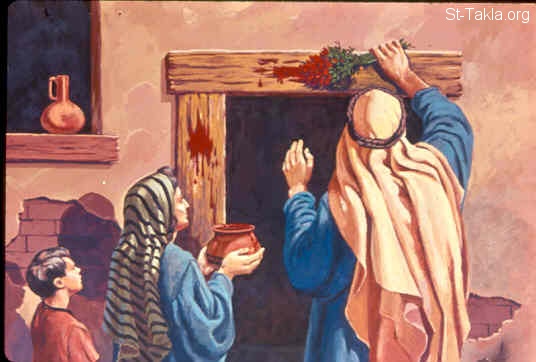
Note: you will need the oldheb.ttf (old Hebrew) and the SGreek Mediuim fonts to see the Hebrew and Greek text, as well as the three English fonts: Cooper Black, Impact and Frontlight MT Light. Right click the links and choose "Save Target As". Then go to the file, and either right click them and choose "install", or drag them into the font page.
oldheb.ttf
SGreek Medium
Cooper Black
Impact
Frontlight MT Light
NOTE: All of the yous and yours underlined as "you" and "your" indicates that the you and the your are plural. Also any of the words that are in bold pink lettering as "you" refers to the feminine gender, but it is only applied when it does not commonly refer to a woman. This only is applied to this week's Torah portion text at this time.
IT'S "BO" TIME!
CHAPTER 10
Exodus 10:1-29
Exo 10:1 And hwhy said to Moses, Go to Pharaoh: for I, I have made heavy ta-his heart, and ta-the heart of his servants, by that, I will set My Signs of these in his nearness: 2 And by that, you may recount (account, enumerate, enroll, number, record, scribe) in the ears of your son, and the son of your son ta which I have imposed (exerted, effected) against Egypt, and ta-My Signs which I have put (set) on (against) them; and you may know for I am hwhy.
3 And Moses and Aaron came to Pharaoh, and they said to him, Thus says hwhy, Elohim of the (Hebrim) Hebrews, Until how long will you refuse to humble from My Face? Send away My People, and may serve Me. 4 For if you refuse to send away ta-My People, behold, tomorrow, I am with bringing the locusts in your border: 5 and will cover (conceal) ta-the eye of the land, and shall not be able to see ta-the land: and will eat ta-the yether-remainder (remnant, rest) that escaped that was sha'ahr-left (remained, reserved) to you from the hail, and will eat ta-all of the trees that sprouts to you from the field: 6 And they will fill your houses, and the houses of all of your servants, and the houses of all of Egypt; which your fathers, and the fathers of your fathers, they have not seen, from the day they have been upon the Ground until this day. And faced away, and went out from with Pharaoh.
7 And the servants of Pharaoh, they said to him, Until how long shall this be for a snare (noose) to us? Send away ta-the men, and they may serve ta-hwhy, their Elohim: That do you interruptedly (not yet) know for Egypt is perishing?
8 And ta-Moses and ta-Aaron were returned to Pharaoh: and said to them, Go, serve ta-hwhy, your Elohim: Who and who are the ones going? 9 And Moses said, We will go on our young and on our old, on our sons and on our daughters. We will go on our flocks and on our herds; for to us is a feast of hwhy. 10 And said to them, So. Is hwhy with you [(So hwhy is with you)] as the which I will send you away and ta-your little ones?: See; for evil is before (at the front of) your faces. 11 Not so: The mighty men, they shall go now, and they will serve ta-hwhy; for you were with seeking (inquiring) her. And was the driving out of them [(And drove them out)] from ta the face of Pharaoh.
12 And hwhy said to Moses, Stretch out (Stretch forth) your hand upon (over) the land of Egypt on the locusts, and will ascend upon (over) the land of Egypt and will eat ta-every plant (herb) of the land of ta all which the hail sha'ahr-left (remained, reserved). 13 And Moses stretched out (stretched forth) ta-his staff (rod, branch) upon (over) the land of Egypt, and hwhy drove forth an east wind on the land all that day, and all of the night; Became the breaking period (morning), and the east wind carried (lifted up, brought up) ta-the locusts. 14 And the locusts ascended upon (over) all of the land of Egypt, and rested much heavy in all of the border of Egypt: Not were such locusts like him to his face, and none shall be thus after them. 15 And was the covering (concealing) [(And was covered (concealed))] ta-the eye of all of the Earth, and the land, she became dark; And ate ta-every plant (herb) of the land, and ta all of the fruit of the trees which the hail had yether-remained (were remnant, had left): and not yether-remained (were remnant, left) any green on the trees, and on the plants (herbs) of the field, in all of the land of Egypt.
16 And Pharaoh hurried to call for Moses and for Aaron; and said, I have sinned to hwhy, your Elohim, and to you. 17 And now, lift up (carry, bear) now my sin surely the one time [(that time)], and intercede (entreat) to hwhy, your Elohim, and remove (turn away) from upon me ta-this death only.
18 And went out from with Pharaoh and interceded (entreated) to hwhy. 19 And hwhy made change a much strong sea (west) wind, and carried away (lifted away, bore up) ta-the locusts, and thrust (slapped, clattered) them to the Yam Suph [(Sea of Reeds, Red Sea)]; had not sha'ahr-left (reamined, reserved) one locust in all of the border of Egypt. 20 And hwhy strengthened ta-the heart of Pharaoh, and did not send away ta-the Sons of Israel.
21 And hwhy said to Moses, Stretch out (Stretched forth) your hand upon (over) the Heavens, and shall be darkness over (upon) the land of Egypt, and will feel darkness. 22 And Moses stretched out (stretched forth) ta-his hand upon (over) the Heavens; and was a darkness of gloom (duskiness, misfortune) [(gloom (duskiness, misfortune) of darkness)] in all of the land of Egypt three days: 23 They, a man, did not see ta-his brother, and a man, they did not rise from his stead three days: and was light to all of the Sons of Israel in their dwellings.
24 And Pharaoh called to Moses, and said, Go, serve ta-hwhy; only make stay your flocks and your herds: your little ones shall also go with you. 25 And Moses said, You, you must also give in our hands Sacrifices and Elevation Offerings (Ascension Offerings, Burnt Offerings), and we will do (make, prepare) for hwhy, our Elohim. 26 And also our livestock shall go with us; she shall not sha'ahr-be left (remain, reserve) a split hoof; for from him, we shall take to serve ta-hwhy, our Elohim; and we, we do not know what we will serve ta-hwhy, until we come there. 27 And hwhy strengthened ta-the heart of Pharaoh, and was not willing (consenting) to send them away. 28 And Pharaoh said to him, Go from upon me. Guard (Keep, Take heed, Observe) to yourself, you shall not add (again) at seeing my face [(shall not see my face again)]; for in the day you see my face, you shall die. 29 And Moses said, So you have spoken, I will not add (again) at seeing your face anymore.
(NOTE: Not all verses will have comments)
Verses one and two
Continuing with the ten plagues from our last Torah portion:
THE EIGHTH PLAGUE
1 And hwhy said to Moses, Go to Pharaoh: for I, I have made heavy ta-his heart, and ta-the heart of his servants, by that, I will set My Signs of these in his nearness: 2 And by that, you may recount (account, enumerate, enroll, number, record, scribe) in the ears of your son, and the son of your son ta which I have imposed (exerted, effected) against Egypt, and ta-My Signs which I have put (set) on (against) them; and you may know for I am hwhy.
In other words, hwhy told Moses to pass His Signs to the Israelites and their descendants, so that they will not forget what happened in Egypt. hwhy had Moses reiterated this similar phrase regarding His Commandments for future generations, which is noted in the Torah portion of Va-Ethkhanan, in the book of Deuteronomy
Deuteronomy 6:1 And this is the Commandment, the Statutes, and the Judgments, which hwhy, your Elohim, commanded to have you learn to do in the land which you are going over to there there to possess her: 2 by that, you shall revere (give awe, fear) ta-hwhy, your Elohim, to keep ta-all of His Statutes and His Commandments, which I commanded you, you, and your son, and the son of your son, all the days of your life; and by that, your days shall be lengthened.
Indirectly related, during Yeshua's time, the Jews wanted signs, but He noted them as a "perverse generation" that sought a sign, which is noted in the Gospel of Matthew
Matthew 12:38 Then certain of the Scribes and of the Pharisees answered, saying, Master, we would see a sign from Thee. 39 But He answered and said unto them, An evil and adulterous generation seeketh after a sign; and there shall no sign be given to it, but the sign of the prophet Jonas: 40 For as Jonas was three days and three nights in the whale's belly; so shall the Son of Man be three days and three nights in the heart of the earth.
Continuing with Mark Biltz of El Shaddai Ministries from last week's Torah portion of Va-Eyra, in the book of Exodus, notice that it was hwhy that made Pharaoh's heart heavy ("kaveyd" (dbk)) in verse one of this week's Torah portion passage instead of Pharaoh himself as he did in the previous plagues. Based on the past accounts of the plagues, it looks like that Pharaoh might be starting to get weary of making his own heart heavy.
Verses three through six
3 And Moses and Aaron came to Pharaoh, and they said to him, Thus says hwhy, Elohim of the (Hebrim) Hebrews, Until how long will you refuse to humble from My Face? Send away My People, and may serve Me. 4 For if you refuse to send away ta-My People, behold, tomorrow, I am with bringing the locusts in your border: 5 and will cover (conceal) ta-the eye of the land, and shall not be able to see ta-the land: and will eat ta-the yether-remainder (remnant, rest) that escaped that was sha'ahr-left (remained, reserved) to you from the hail, and will eat ta-all of the trees that sprouts to you from the field: 6 And they will fill your houses, and the houses of all of your servants, and the houses of all of Egypt; which your fathers, and the fathers of your fathers, they have not seen, from the day they have been upon the Ground until this day. And faced away, and went out from with Pharaoh.
This is the second time that a kind of plague would be recorded as none of its kind like it in Egypt.
Based on this information, some of the green plants survived the last plague of the hail, but now, this plague will make sure that none will survive.
Notice that Pharaoh did not have Moses come to him and respond to Moses for the first time in all of the plagues that were cast against him.
Verse seven
7 And the servants of Pharaoh, they said to him, Until how long shall this be for a snare (noose) to us? Send away ta-the men, and they may serve ta-hwhy, their Elohim: That do you interruptedly (not yet) know for Egypt is perishing?
This is the first time that Pharaoh's servants were defending Moses. This must be humiliating to Pharaoh, "Rah on Earth" to come to the point of submitting to Moses' Elohim.
Verses eight through eleven
8 And ta-Moses and ta-Aaron were returned to Pharaoh: and said to them, Go, serve ta-hwhy, your Elohim: Who and who are the ones going? 9 And Moses said, We will go on our young and on our old, on our sons and on our daughters. We will go on our flocks and on our herds; for to us is a feast of hwhy. 10 And said to them, So. Is hwhy with you [(So hwhy is with you)] as the which I will send you away and ta-your little ones?: See; for evil is before (at the front of) your faces. 11 Not so: The mighty men, they shall go now, and they will serve ta-hwhy; for you were with seeking (inquiring) her. And was the driving out of them [(And drove them out)] from ta the face of Pharaoh.
This first part of verse ten of this week's Torah portion passage shows that Pharaoh was questioning Moses' response to whom were going with Moses out of Egypt. Either Pharaoh must have forgotten that Moses told him all this, or Pharaoh could have said this in a mocking way to Moses and Aaron. In a way, Pharaoh's was saying to Moses that "he"- Pharaoh- will let them go, because hwhy is with them, and hwhy is not making them go. In other words Pharaoh was asking Moses "Do you think you are going to tempt me to send everybody out of my land because of your hwhy? "Not so!"".
Pharaoh responds his own question to Moses in two parts: The first part is the ending of verse ten of this week's Torah portion passage when he says to Moses and Aaron that evil is before your face, meaning that Moses and Aaron "are" looking at "Evil", meaning "Pharaoh" himself. This was a precursor to the second part in verse eleven of this week's Torah portion passage in which his answer to Moses and Aaron was "Not so". This answer was in connection starting with Pharaoh questioning Moses in verse eight and Moses' response in verse nine of this week's Torah portion passage. Pharaoh was saying, in many words, to Moses and Aaron, "hwhy will not tell me who are going with you, but "I" will tell you who are going, and it will be just the "men". In other words, Pharaoh was still trying to put himself above hwhy , and controlling the game.
Brad Scott of Wildbrach Ministry and Bill Cloud of Shoreshim Ministries noted that based on the Hebrew, the two outer Hebrew letters Pharaoh's make up one word on the outside, while the letters in the middle make up the account of the inner meaning of that word. A good example of this is Pharaoh's name himself.
Looking at the word PHARAOH
The Hebrew word for Pharaoh is "Pah-roh"- Peh, Resh, Ayin, Heh (herp). It is from Strong's Concordance number 6547, and its definition
Of Egyptian derivation; Paroh, a generic title of Egyptian kings: - Pharaoh.
It does not give a definition, but Brad Scott noted by taking the two outer Hebrew letters of Pharaoh's name and we get "Peh" (hp), which is translated as "mouth". Brad Scott and Bill Cloud continues by taking the two Hebrew letters inside, and it makes the word "Ra" (er), and this word is commonly translated as "evil". By that, the the Hebrew name of Pharaoh is translated as "the Mouth of Evil", and it, in a way, connects with verse ten of this week's Torah portion passage when Pharaoh says to Moses
10 ....See; for evil is before (at the front of) your faces.
In other words, Pharaoh was saying to Moses "I am "evil"", and Pharaoh can use his mouth for evil allright.
Also, Pharaoh said that in verse eleven of this week's Torah portion passage it was "her" you were inquiring. In other words, Pharaoh was still trying to portray himself as Rah, the false elohim, and was saying to Moses that he was the elohim and not hwhy, and his "word", which is female, who is "her", is above hwhy's Word. A good example of the word being female is hwhy's Torah, which is noted later in this week's Torah portion
Exodus 13:9 And shall be to you for a Sign upon your hand, and for a Memorial between your eyes, by that, the Teaching (Torah) of hwhy, she will be in your mouth:...
The Hebrew word for she will be is "tee-h'yey" (hyht) in which the Tav in this Hebrew word is the feminine gender for the word "hayah" (hyh) which is the "be" verb.
Also in verse eleven of this week's Torah portion passage, when Pharaoh was making statements to Moses and Aaron, he was in many words saying to Moses and Aaron that they were requiring Pharaoh and not hwhy, and that Pharaoh is responding based on his own inquiry and not hwhy through Moses and Aaron's in verse nine of this week's Torah portion passage.
Indirectly related, this was HaSatan's plan when he tried to exalt himself above hwhy, which is noted in the book of the prophet Isaiah
Isaiah 14:12 How art thou fallen from heaven, Heyleyl, son of the morning! how art thou cut down to the ground, which didst weaken the nations! 13 For thou hast said in thine heart, I will ascend into the heavens, I will exalt my throne above the stars of El: I will sit also upon the mount of the congregation, in the sides of the north: 14 I will ascend above the heights of the clouds; I will be like the most High. 15 Yet thou shalt be brought down to hell, to the sides of the pit.
The name in the King James Version calls him Lucifer, but in the Hebrew it is "Heyleyl"- Heh, Yod, Lamed, Lamed (llyh) from Strong's Concordance number 1966. This is where we get our modern English word "Hell", the place of "Heyleyl's" location.
Also, Pharaoh thought twice to realize that he did not want the children to go. Mark Biltz of El Shaddai Ministries noted in a generality that if one can get the kids, one can control the next generation. If Pharaoh kept the children, he would make them forget this account of Moses and mingle into the Egyptian culture. For example, look at the colleges and universities today: Who are the instructors today? Are a good amount of these professors teaching the same Biblical principles that their predecessors taught 100 years ago? No, they are not. If not, what are they teaching to their students today? A good amount of them are teaching them things that are contrary to the Scriptures, as well as the Constitution. What happens to the students who graduate when they go out in the world with what they were taught? They will take what they have learned and "mingle" it into their fabric culture, and tear the Biblical fabric apart, and thus, by the next generation, it will be an anti-Biblical society.
Verses twelve through fifteen
12 And hwhy said to Moses, Stretch out (Stretch forth) your hand upon (over) the land of Egypt on the locusts, and will ascend upon (over) the land of Egypt and will eat ta-every plant (herb) of the land of ta all which the hail sha'ahr-left (remained, reserved). 13 And Moses stretched out (stretched forth) ta-his staff (rod, branch) upon (over) the land of Egypt, and hwhy drove forth an east wind on the land all that day, and all of the night; Became the breaking period (morning), and the east wind carried (lifted up, brought up) ta-the locusts. 14 And the locusts ascended upon (over) all of the land of Egypt, and rested much heavy in all of the border of Egypt: Not were such locusts like him to his face, and none shall be thus after them. 15 And was the covering (concealing) [(And was covered (concealed))] ta-the eye of all of the Earth, and the land, she became dark; And ate ta-every plant (herb) of the land, and ta all of the fruit of the trees which the hail had yether-remained (were remnant, had left): and not yether-remained (were remnant, left) any green on the trees, and on the plants (herbs) of the field, in all of the land of Egypt.
Notice in verse thirteen of this week's Torah portion passage that it took about twenty four hours before the locusts arrived at the land
13 ...all that day, and all of the night...
It took a long time for the locusts to arrive, but it is understandable that it would take all night for them to arrive. By the way, these grasshoppers are also part of the food chain, and the food chain element that eat grasshoppers were about gone. And who were those that eat grasshoppers?..... Frogs! The frogs were gone, and the grasshoppers dominated since then. It also took the wind to bring an enumerous amount of these locusts to cover a wide space of land.
Regarding the east wind, hwhy showed Pharaoh in his dream that the east wind would provide seven years of famine, which is noted in the Torah portion of Mikeyts, in the book of Genesis
Genesis 41:5 And slept, and calm-dreamed a second: and behold, seven plump and good ears were ascending on one stalk. 6 And behold, seven ears lean (thin) and of an eastern blast (scorch) sprouted after them. 7 And the lean (thin) ears, they swallowed ta the seven plump and full ears. And Pharaoh awoke, and behold, was a calm dream.... 27 And the seven lean (thin) and evil cows ascending after them, they are seven years; and the seven empty ears of an eastern blast (scorch), they are seven years of the famine.
This verse shows us that the east wind created famines. These are other examples where the east wind is implied for negative means in various books:
Job 15:2 Should a wise man utter vain knowledge, and fill his belly with the east wind?
Job 27:21 The east wind carrieth him away, and he departeth: and as a storm hurleth him out of his place.
Isaiah 27:7 Hath he smitten him, as he smote those that smote him? Or is he slain according to the slaughter of them that are slain by him? 8 In measure, when it shooteth forth, thou wilt debate with it: He stayeth His rough wind in the day of the east wind. 9 By this therefore shall the iniquity of Jacob be purged; and this is all the fruit to take away his sin; when he maketh all the stones of the Altar as chalkstones that are beaten in sunder, the groves and images shall not stand up.
Jeremiah 18:15 Because My People hath forgotten Me, they have burned incense to vanity, and they have caused them to stumble in their ways from the ancient paths, to walk in paths, in a way not cast up; 16 To make their land desolate, and a perpetual hissing; every one that passeth thereby shall be astonished, and wag his head. 17 I will scatter them as with an east wind before the enemy; I will shew them the back, and not the face, in the day of their calamity.
Hosea 13:15 Though he be fruitful among his brethren, an east wind shall come, the Wind of hwhy shall come up from the wilderness, and his spring shall become dry, and his fountain shall be dried up: he shall spoil the treasure of all pleasant vessels.
hwhy revealed in various places in the Tanakh that the east wind provides massive events, including in this current Torah portion regarding the locusts.
Verse sixteen and seventeen
16 And Pharaoh hurried to call for Moses and for Aaron; and said, I have sinned to hwhy, your Elohim, and to you. 17 And now, lift up (carry, bear) now my sin surely the one time [(that time)], and intercede (entreat) to hwhy, your Elohim, and remove (turn away) from upon me ta-this death only.
Pharaoh said to Moses in verse sixteen of this week's Torah portion passage that he sinned against "your" Elohim. Pharaoh did not humble himself to accept hwhy as "the Elohim" to be "Pharaoh's" Elohim, becuase he is "Rah, el on earth", or should I say "Rah, hell on earth". Pharaoh still had a hardened heart when he said to Moses and Aaron to forgive him and his sin "only this once", meaning that he doesn't like to ask forgiveness, but to get them and hwhy off his back, and in a way saying that he is not going to ask forgiveness in the future, since he is "Rah on earth".
A question comes to me. "Why did Pharaoh say in verse seventeen for Elohim to take away "this death only""? What did Pharaoh mean by that? All I can see is that Pharaoh saw this plague as "death". If Pharaoh thought this plague was a death, he has a surprise coming to him. And if he only knew that the last plague of the first born's death would approach him later, he probably would have wished that he took these words back.
Verses eighteen through twenty
18 And went out from with Pharaoh and interceded (entreated) to hwhy. 19 And hwhy made change a much strong sea (west) wind, and carried away (lifted away, bore up) ta-the locusts, and thrust (slapped, clattered) them to the Yam Suph [(Sea of Reeds, Red Sea)]; had not sha'ahr-left (reamined, reserved) one locust in all of the border of Egypt. 20 And hwhy strengthened ta-the heart of Pharaoh, and did not send away ta-the Sons of Israel.
This act of the locusts being removed to the Sea of Reeds could have been a symbolic prophetic hint to Pharaoh and his army that they will be symbolic locusts cast into the Sea of Reeds which will come to pass later, which is notedin the Torah portion of B'shalakh, in the book of Exodus
Exodus 14:27 And Moses stretched out (stretched forth) ta-his hand over (upon) the sea, and the sea returned to his permanence to the face of breaking period (morning); and ta-Egypt fled to meet (encounter) him; and hwhy overthrew (shook off) ta-Egypt in the midst of the sea. 28 And the waters, they returned, and they covered (concealed) ta-the chariots, and ta-the horsemen (hoofmen), to all of the force (valiant ones) of Pharaoh that were coming in the sea after them; Was not remained (left) among them unto one.
As it is known and confirmed that the Sea of Reeds today is the Gulf of Aquaba, between Saudi Arabia and the Sinai Peninsula, which was occupied by Egypt at the time. I will explain this in next week's Torah portion of B'shalakh.
In verse twenty of this week's Torah portion passage, hwhy strengthened Pharaoh's heart ("khazak" (qzx)) to give him a boost to continue in hwhy's Plan.
King David noted this plague, which is noted in the book of the Psalms
Psalm 105:34 He spake, and the locusts came, and caterpillers, and that without number,
REVELATION'S RELEVANCE TO THE EIGHTH PLAGUE
Monte Judah of Lion and Lamb Ministries noted this, which is noted in the book of Revelation
Revelation 9:1 And the fifth angel sounded, and I saw a star fall from the heavens unto the earth: and to him was given the key of the bottomless pit. 2 And he opened the bottomless pit; and there arose a smoke out of the pit, as the smoke of a great furnace; and the sun and the air were darkened by reason of the smoke of the pit. 3 And there came out of the smoke locusts upon the earth: and unto them was given power, as the scorpions of the earth have power. 4 And it was commanded them that they should not hurt the grass of the earth, neither any green thing, neither any tree; but only those men which have not the seal of hwhy in their foreheads. 5 And to them it was given that they should not kill them, but that they should be tormented five months: and their torment was as the torment of a scorpion, when he striketh a man. 6 And in those days shall men seek death, and shall not find it; and shall desire to die, and death shall flee from them. 7 And the shapes of the locusts were like unto horses prepared unto battle; and on their heads were as it were crowns like gold, and their faces were as the faces of men. 8 And they had hair as the hair of women, and their teeth were as the teeth of lions. 9 And they had breastplates, as it were breastplates of iron; and the sound of their wings was as the sound of chariots of many horses running to battle. 10 And they had tails like unto scorpions, and there were stings in their tails: and their power was to hurt men five months. 11 And they had a king over them, which is the Angel of the Bottomless Pit, whose name in the Hebrew tongue is Abaddon, but in the Greek tongue hath his name Apollyon. 12 One woe is past; and, behold, there come two woes more hereafter.
THE EGYPTIAN eLOHIM RELATING TO THE EIGHTH PLAGUE
The most likely Egyptian deity related to this plague is "Osiris". This is what the Wikipedia website says regarding this deity:
"Osiris (/oʊˈsaɪərɨs/, alternatively Ausir, Asiri or Ausar, among other spellings), was an Egyptian god, usually identified as the god of the afterlife, the underworld, and the dead, but more appropriately as the god of transition, resurrection, and regeneration. He was classically depicted as a green-skinned man with a pharaoh's beard, partially mummy-wrapped at the legs, wearing a distinctive crown with two large ostrich feathers at either side, and holding a symbolic crook and flail. Osiris was at times considered the oldest son of the earth god Geb, though other sources state his father is the sun-god Ra and the sky goddess Nut, as well as being brother and husband of Isis, with Horus being considered his posthumously begotten son. He was also associated with the epithet Khenti-Amentiu, meaning "Foremost of the Westerners", a reference to his kingship in the land of the dead. As ruler of the dead, Osiris was also sometimes called "king of the living": ancient Egyptians considered the blessed dead "the living ones". Osiris was considered the brother of Isis, Set, Nephthys, and Horus the Elder, and father of Horus the younger. Osiris is first attested in the middle of the Fifth dynasty of Egypt, although it is likely that he was worshipped much earlier; the Khenti-Amentiu epithet dates to at least the first dynasty, also as a pharaonic title. Most information available on the myths of Osiris is derived from allusions contained in the Pyramid Texts at the end of the Fifth Dynasty, later New Kingdom source documents such as the Shabaka Stone and the Contending of Horus and Seth, and much later, in narrative style from the writings of Greek authors including Plutarch and Diodorus Siculus.
Osiris was considered not only a merciful judge of the dead in the afterlife, but also the underworld agency that granted all life, including sprouting vegetation and the fertile flooding of the Nile River. He was described as the "Lord of love", "He Who is Permanently Benign and Youthful" and the "Lord of Silence". The Kings of Egypt were associated with Osiris in death — as Osiris rose from the dead they would, in union with him, inherit eternal life through a process of imitative magic. By the New Kingdom all people, not just pharaohs, were believed to be associated with Osiris at death, if they incurred the costs of the assimilation rituals.
Through the hope of new life after death, Osiris began to be associated with the cycles observed in nature, in particular vegetation and the annual flooding of the Nile, through his links with the heliacal rising of Orion and Sirius at the start of the new year. Osiris was widely worshipped as Lord of the Dead until the suppression of the Egyptian religion during the rise of Christianity in the Roman Empire".
These are images of Osiris
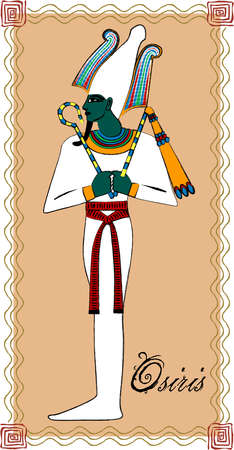
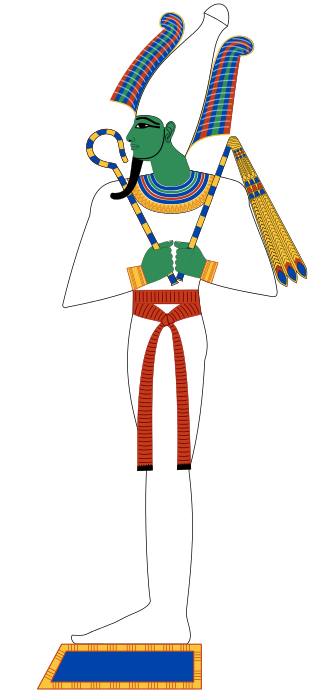
This is Osiris growing wheat from its body
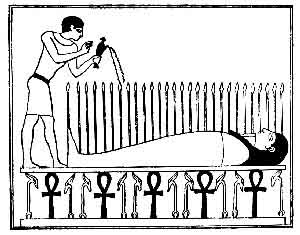
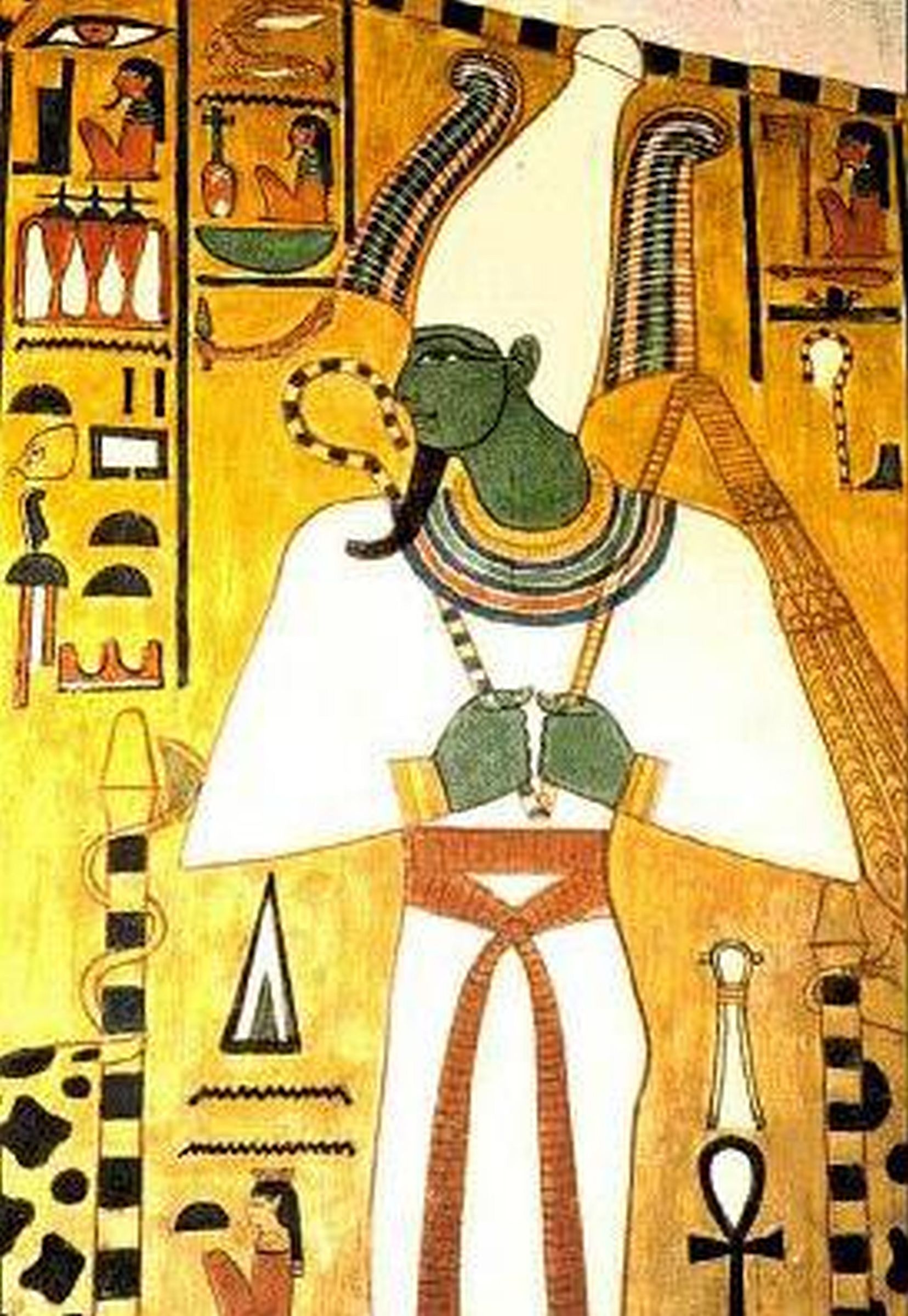
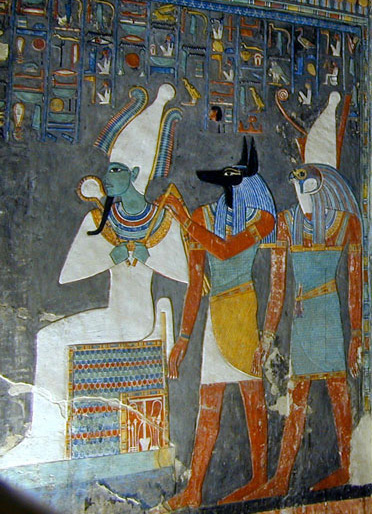
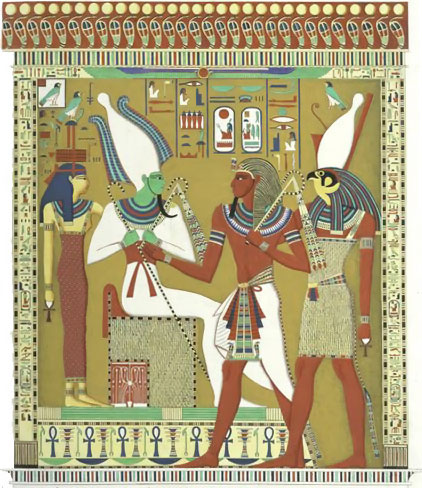
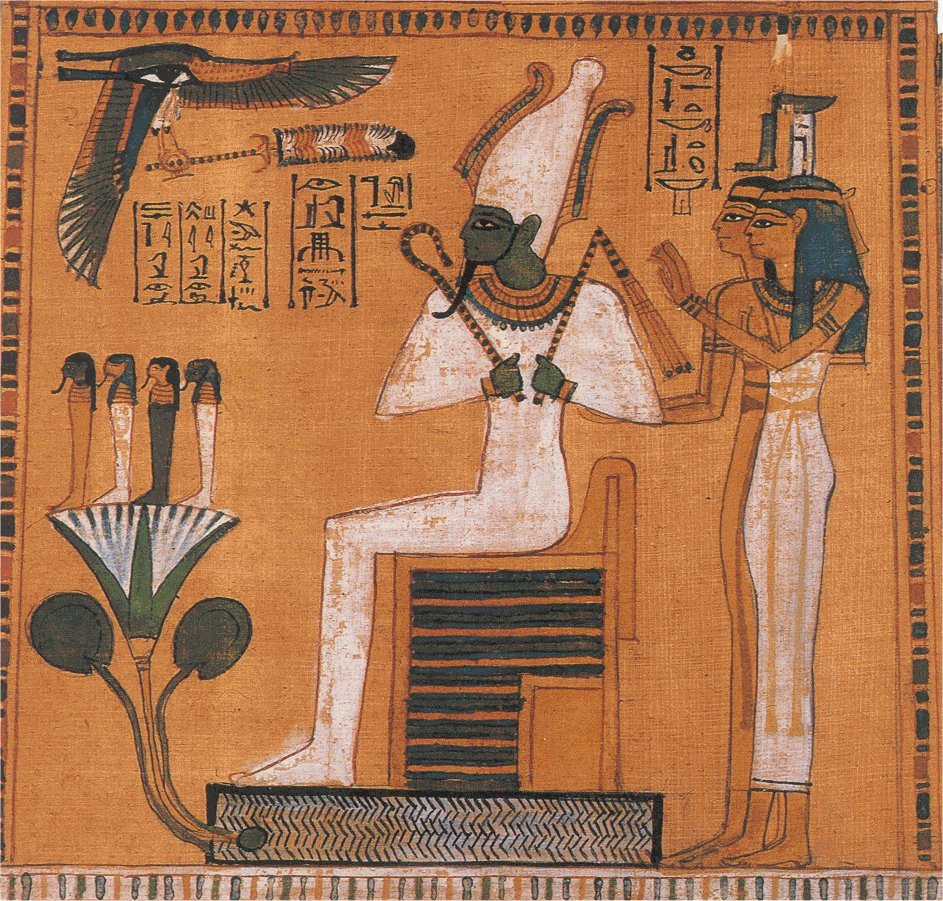
Notice that this deity is green colored. This was most likely the deity's symbol of vegetation.
Another possible Egyptian deity that was most relevant to this plague was "Senehem", an Egyptian deity. According to Answers.com, it possibly had a head of a locust. This is what the website says regarding Senehem:
"Senehem: possibly locust-headed, god of protection from ravages of pests".
There are no images of this deity that I could find.
Verses twenty-one through twenty three
THE NINTH PLAGUE
21 And hwhy said to Moses, Stretch out (Stretched forth) your hand upon (over) the Heavens, and shall be darkness over (upon) the land of Egypt, and will feel darkness. 22 And Moses stretched out (stretched forth) ta-his hand upon (over) the Heavens; and was a darkness of gloom (duskiness, misfortune) [(gloom (duskiness, misfortune) of darkness)] in all of the land of Egypt three days: 23 They, a man, did not see ta-his brother, and a man, they did not rise from his stead three days: and was light to all of the Sons of Israel in their dwellings.
This account can be compared to the account, which is noted in the Torah portion of B'reyshith, in the book of Genesis
Genesis 1:4 ...And Elohim divided (separated, distinguished) between the Light and between the Darkness.
hwhy can divide the light and the darkness.
Monte Judah of Lion and Lamb Ministries noted the prophet Isaiah regarding the darkness, which is noted in his book
Isaiah 60:1 Arise, shine; for thy light is come, and the Glory of hwhy is risen upon thee. 2 For, behold, the darkness shall cover the earth, and gross darkness the people: but hwhy shall arise upon thee, and His Glory shall be seen upon thee. 3 And the gentiles shall come to thy light, and kings to the brightness of thy rising. 4 Lift up Thine eyes round about, and see: all they gather themselves together, they come to thee: thy sons shall come from far, and thy daughters shall be nursed at thy side.
This darkness are for those who are against hwhy.
Symbolically, this can relate the Egypt, symbolic of "the world" being in "spiritual darkness" and the believers of Yeshua being in "spiritual light". Yeshua is "the Light" of the world, which is the Light that shone for Israel during this plague, which is noted in the Gospel of John
John 1:4 In Him was Life; and the Life was the Light of Men. 5 And the Light shineth in darkness; and the darkness comprehended It not.
John 8:12 Then spake Yeshua again unto them, saying, I am the Light of the World: he that followeth Me shall not walk in darkness, but shall have the Light of Life.
John 9:5 As long as I am in the world, I am the Light of the World.
This week's Torah portion passage must have been an interesting site to see at that time. I wished they portrayed this in a Moses movie.
This Torah portion account of darkness for three days is also a type and shadow of Yeshua, the Light, who was buried near or at the Garden of Gethsemene, in complete darkness in the tomb, for three days and nights.
A question came to me, "If it was completely dark, and if the Egyptians had lamps to light, why didn't the Egyptians light their lamps when they had them"? I don't have an answer for this, unless they did do it, but as far as I know, the darkness overcame them from finding their lamps. When it said that they "felt" the darkness, in my opinion, it was an act of hinderance that put the Egyptians in their place and prevented them from moving around.
Indirectly related, there are accounts of those who are not in Yeshua that are walking in darkness, or will be thrown into outer darkness. There are a few examples, which are noted in the Gospels of Matthew, Luke and John
Matthew 8:5 And when Yeshua was entered into Capernaum, there came unto Him a centurion, beseeching Him, 6 And saying, Lord, my servant lieth at home sick of the palsy, grievously tormented. 7 And Yeshua saith unto him, I will come and heal him. 8 The centurion answered and said, Lord, I am not worthy that Thou shouldest come under my roof: but speak the Word only, and my servant shall be healed. 9 For I am a man under authority, having soldiers under me: and I say to this man, Go, and he goeth; and to another, Come, and he cometh; and to my servant, Do this, and he doeth it. 10 When Yeshua heard it, He marvelled, and said to them that followed, Verily I say unto you, I have not found so great faith, no, not in Israel. 11 And I say unto you, That many shall come from the east and west, and shall sit down with Abraham, and Isaac, and Jacob, in the Kingdom of Heaven. 12 But the children of the kingdom shall be cast out into outer darkness: there shall be weeping and gnashing of teeth.
Matthew 22:1 And Yeshua answered and spake unto them again by parables, and said, 2 The Kingdom of Heaven is like unto a certain king, which made a marriage for his son, 3 And sent forth his servants to call them that were bidden to the wedding: and they would not come. 4 Again, he sent forth other servants, saying, Tell them which are bidden, Behold, I have prepared my dinner: my oxen and my fatlings are killed, and all things are ready: come unto the marriage. 5 But they made light of it, and went their ways, one to his farm, another to his merchandise: 6 And the remnant took his servants, and entreated them spitefully, and slew them. 7 But when the king heard thereof, he was wroth: and he sent forth his armies, and destroyed those murderers, and burned up their city. 8 Then saith he to his servants, The wedding is ready, but they which were bidden were not worthy. 9 Go ye therefore into the highways, and as many as ye shall find, bid to the marriage. 10 So those servants went out into the highways, and gathered together all as many as they found, both bad and good: and the wedding was furnished with guests. 11 And when the king came in to see the guests, he saw there a man which had not on a wedding garment: 12 And he saith unto him, Friend, how camest thou in hither not having a wedding garment? And he was speechless. 13 Then said the king to the servants, Bind him hand and foot, and take him away, and cast him into outer darkness; there shall be weeping and gnashing of teeth. 14 For many are called, but few are chosen.
Matthew 25:24 Then he which had received the one talent came and said, Lord, I knew thee that thou art an hard man, reaping where thou hast not sown, and gathering where thou hast not strawed: 25 And I was afraid, and went and hid thy talent in the earth: lo, there thou hast that is thine. 26 His lord answered and said unto him, Thou wicked and slothful servant, thou knewest that I reap where I sowed not, and gather where I have not strawed: 27 Thou oughtest therefore to have put my money to the exchangers, and then at my coming I should have received mine own with usury. 28 Take therefore the talent from him, and give it unto him which hath ten talents. 29 For unto every one that hath shall be given, and he shall have abundance: but from him that hath not shall be taken away even that which he hath. 30 And cast ye the unprofitable servant into outer darkness: there shall be weeping and gnashing of teeth.
Luke 11:34 The light of the body is the eye: therefore when thine eye is single, thy whole body also is full of light; but when thine eye is evil, thy body also is full of darkness. 35 Take heed therefore that the light which is in thee be not darkness.
John 3:19 And this is the Condemnation, that light is come into the world, and men loved darkness rather than light, because their deeds were evil.
There are other Scriptures sources referring to those who would be in darkness, and/or would be cast out into outer darkness.
Those who are not believers in the Judgment Day will be in outer darkness.
King David recalled this plague in the book of Psalms
Psalm 105:28 He sent darkness, and made it dark; and they rebelled not against ta-His word.
Verse twenty four
24 And Pharaoh called to Moses, and said, Go, serve ta-hwhy; only make stay your flocks and your herds: your little ones shall also go with you.
Pharaoh changed his mind from the eighth plague by refusing to let the young ones go, and now he was saying "Ok, you can take the young ones now, but leave the flocks and the herds behind". Pharaoh is starting to sound more like Laban, thinking he could get away with giving Moses a little more than the last time. Pharaoh wants to be the controller of the deal and not allow hwhy through Moses to control the game. Pharaoh kept offering different deals that is not at all what hwhy said to Moses, so that Pharaoh could get the upper hand against Moses and dominate him, because Pharaoh was Pharaoh, King of Egypt, "Rah on Earth". hwhy showed that Pharaoh was trying to "compromise" Moses again, which in this case it was to have Israel leave their animals behind, probably because of the destruction of the vegetation, not leaving anything for the animals and the people to eat. Maybe Pharaoh said this to make up for the loss of vegetation for the people's diet. I don't know. The problem with Pharaoh is that he was not dealing with Moses, but with hwhy, and hwhy gets the final Word and not Pharaoh, which will be shown in the next chapter of this week's Torah portion.
Verse twenty five and twenty six
25 And Moses said, You, you must also give in our hands Sacrifices and Elevation Offerings (Ascension Offerings, Burnt Offerings), and we will do (make, prepare) for hwhy, our Elohim. 26 And also our livestock shall go with us; she shall not sha'ahr-be left (remain, reserve) a split hoof; for from him, we shall take to serve ta-hwhy, our Elohim; and we, we do not know what we will serve ta-hwhy, until we come there.
Moses defend hwhy by saying to Pharaoh that the Israelites need the animals to give sacrifices to hwhy. In other words Moses is saying to Pharaoh "We need the whole package".
REVELATION'S RELEVANCE TO THE NINTH PLAGUE
Monte Judah of Lion and Lamb Ministries noted this week's Torah portion passage in revlence to this plague, which is noted in the apostle John's book of Revelation
Revelation 16:10 And the fifth angel poured out his vial upon the seat of the beast; and his kingdom was full of darkness; and they gnawed their tongues for pain,
We in Messiah will experience this in our lives in our relationship with Yeshua. There will be "Pharaoh want-a-bees" that will try to get us to accept less than what hwhy wants, and go against the Word of hwhy.
Verses twenty seven through twenty nine
27 And hwhy strengthened ta-the heart of Pharaoh, and was not willing (consenting) to send them away. 28 And Pharaoh said to him, Go from upon me. Guard (Keep, Take heed, Observe) to yourself, you shall not add (again) at seeing my face [(shall not see my face again)]; for in the day you see my face, you shall die. 29 And Moses said, So you have spoken, I will not add (again) at seeing your face anymore.
This was supposed to be that last time Pharaoh and Moses were to see each other, but Moses sounded "princely" when he replied back to him in verse twenty nine of this week's Torah portion passage. It was like Moses was hinting to Pharaoh that he was once a prince in Egypt. Moses was also saying to Pharaoh that he had the last word which was true, but hwhy will be indirectly having the final say through Pharaoh as we will see in the next chapter of this week's Torah portion.
A possible theory came to me based on verses twenty eight and twenty nine of this week's Torah portion. When Moses was following hwhy, Moses was protected and immuned to any past issues, including all the things he said, did or agreed to. When Moses disobeyed hwhy when Moses was commanded to speak to the rock at Meribath to bring forth water, but instead struck the rock with the staff, twice, and was hot tempered against the Israelites, hwhy told Moses that he would not cross over to the land and would eventually die on that side of the river. Much was given to Moses and much was required of him.
In my theory, when Moses was told that he was going to die, hwhy reapplied these two verses between Pharaoh and Moses, in which Moses did see Pharaoh again in chapter twelve of this week's Torah portion passage
Exodus 12:31 And called for Moses and for Aaron at night, and said, Arise! and go out from the midst of my people, also you, also the Sons of Israel; And go, serve ta-hwhy according to [(as)] your word! 32 Take also your flocks, also your herds as the which you spoke, and go; And you bless me also!
When Moses met Pharaoh again, Moses was a dead man, because Pharaoh spoke the word and Moses agreed to Pharaoh's word that Moses would die was to come to pass. However, hwhy kept Moses immune to this broken word until that point in Meribath. hwhy had no choice but to reactivate Pharaoh's words to Moses in verse twenty eight of this week's Torah portion chapter.
Also, Moses killing the Egyptian could have had an impact, resulting in hwhy's Judgment against Moses. As a result of the issues mentioned above, hwhy judged Moses to not have him go over the Jordan to the promised land.
hwhy also strengthened the heart of Pharaoh ("khazak" (qzx)). hwhy gave the Pharaoh one more push of strength in Pharaoh's heart to prepare him for the last plague.
THE EGYPTIAN eLOHIM RELATING TO THE NINTH PLAGUE
The Egyptian deities related to this plague was "Ra", or "Amon-Ra", god of the sun, and "Horus", a sky god.
This is what the Wikipedia website says regarding Ra:
"Ra...is the ancient Egyptian solar deity. By the Fifth Dynasty (2494 to 2345 BCE) he had become a major god in ancient Egyptian religion, identified primarily with the midday sun.
In
later Egyptian dynastic times, Ra was merged with the god Horus,
as
Ra-Horakhty ("Ra, who is Horus of the Two Horizons"). He was believed
to rule in all parts of the created world: the sky, the earth, and the
underworld. He was associated with the falcon or hawk. When in the New
Kingdom the god Amun rose to prominence he was fused with Ra as
Amun-Ra. During the Amarna Period, Akhenaten suppressed the cult of Ra
in favour of another solar deity, the Aten, the deified solar disc, but
after the death of Akhenaten the cult of Ra was restored."
"To
the Egyptians, the sun represented light, warmth, and growth. This made
the sun deity very important, as the sun was seen as the ruler of all
that he created. The sun disk was either seen as the body or eye of Ra."
These are images pertaining to Ra
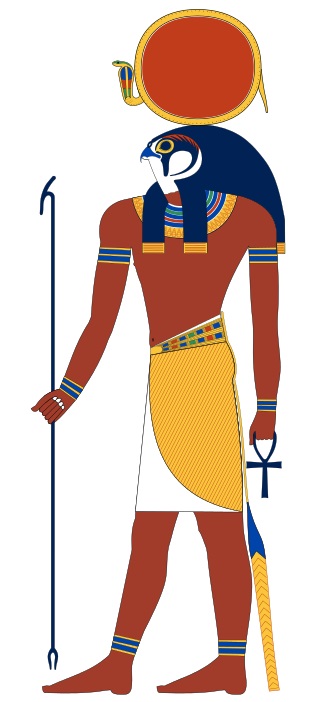
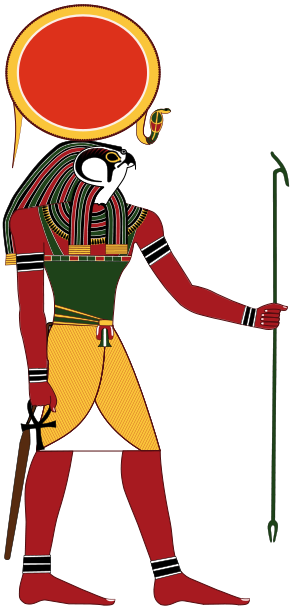
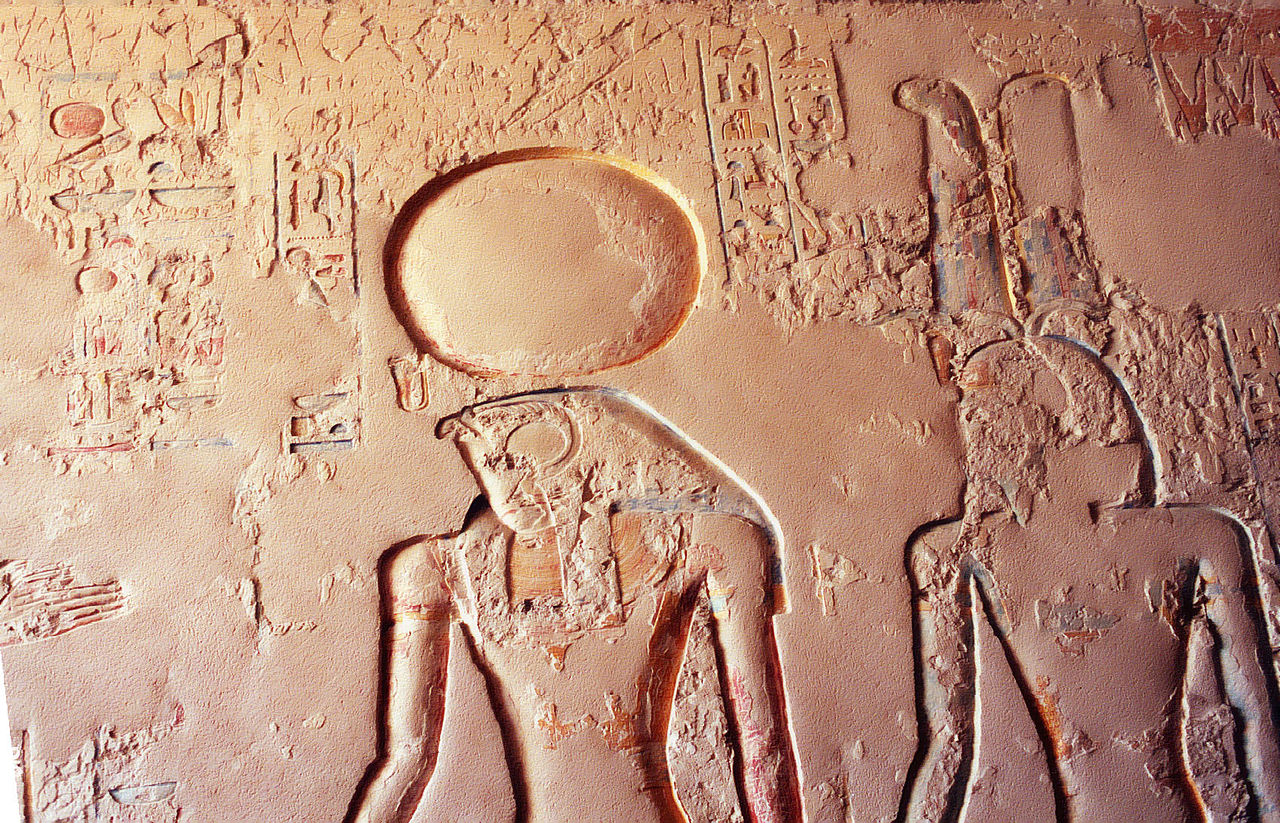
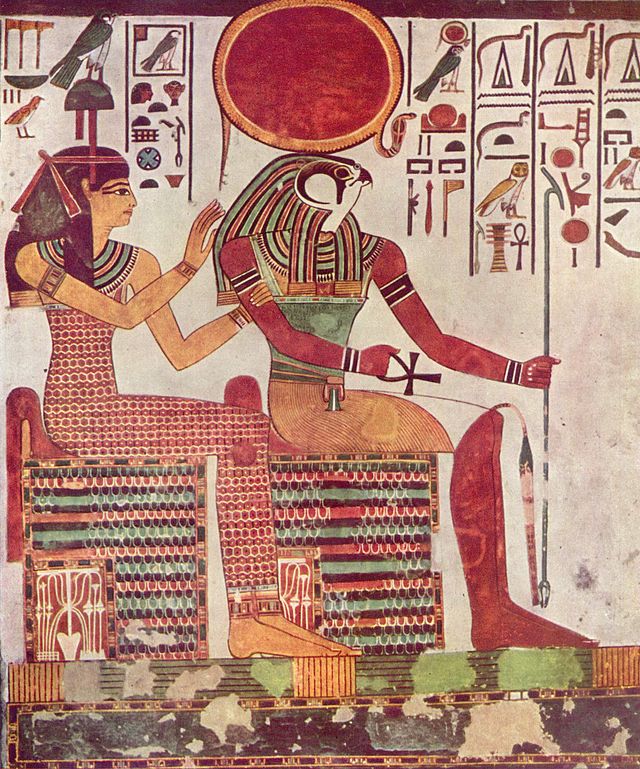
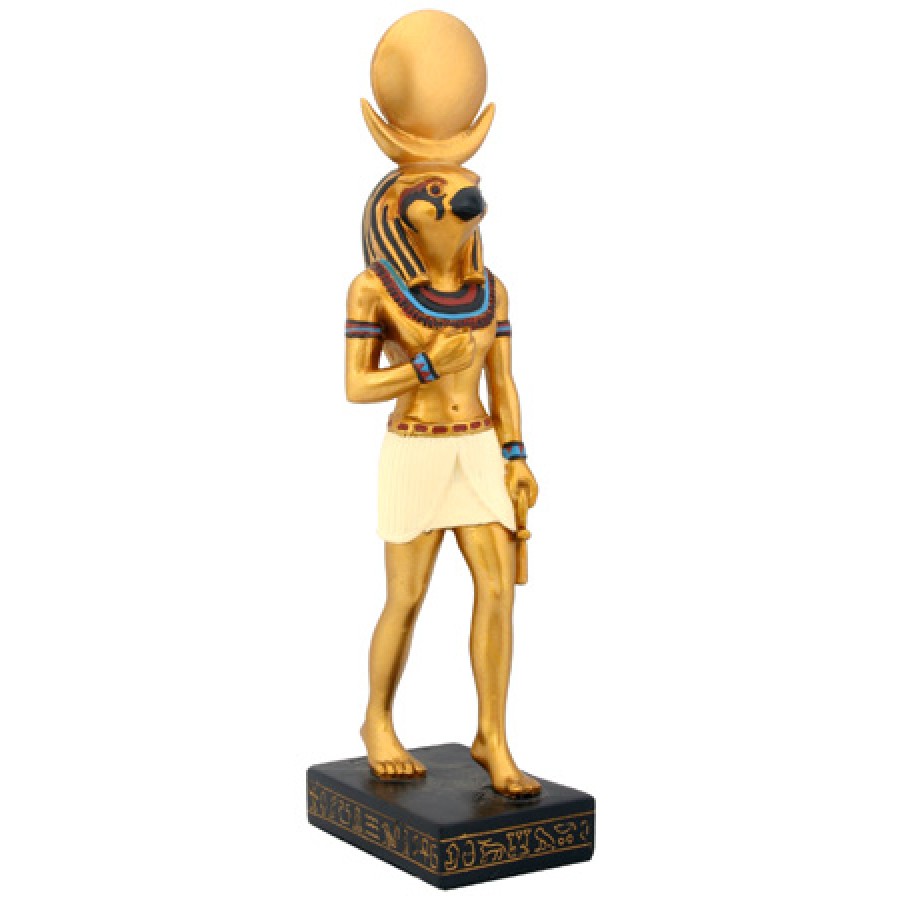
This is what the Wikipedia says regarding Horus
"Horus is one of the oldest and most significant deities in ancient Egyptian religion, who was worshipped from at least the late Predynastic period through to Greco-Roman times. Different forms of Horus are recorded in history and these are treated as distinct gods by Egypt specialists. These various forms may possibly be different perceptions of the same multi-layered deity in which certain attributes or syncretic relationships are emphasized, not necessarily in opposition but complementary to one another, consistent with how the Ancient Egyptians viewed the multiple facets of reality. He was most often depicted as a falcon, most likely a lanner of peregrine, or as a man with a falcon head.
"Since Horus was said to be the sky, he was considered to also contain the sun and moon. It became said that the sun was his right eye and the moon his left, and that they traversed the sky when he, a falcon, flew across it."
These are the images referring to Horus
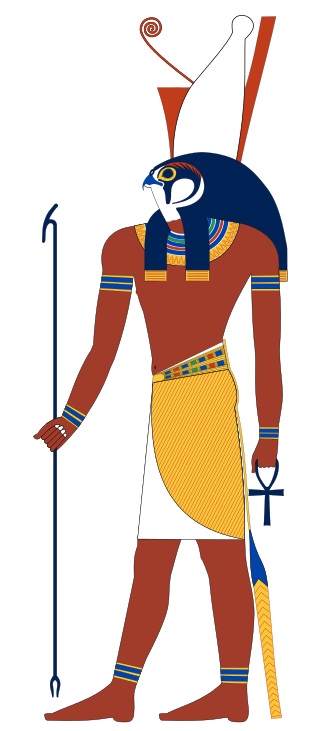
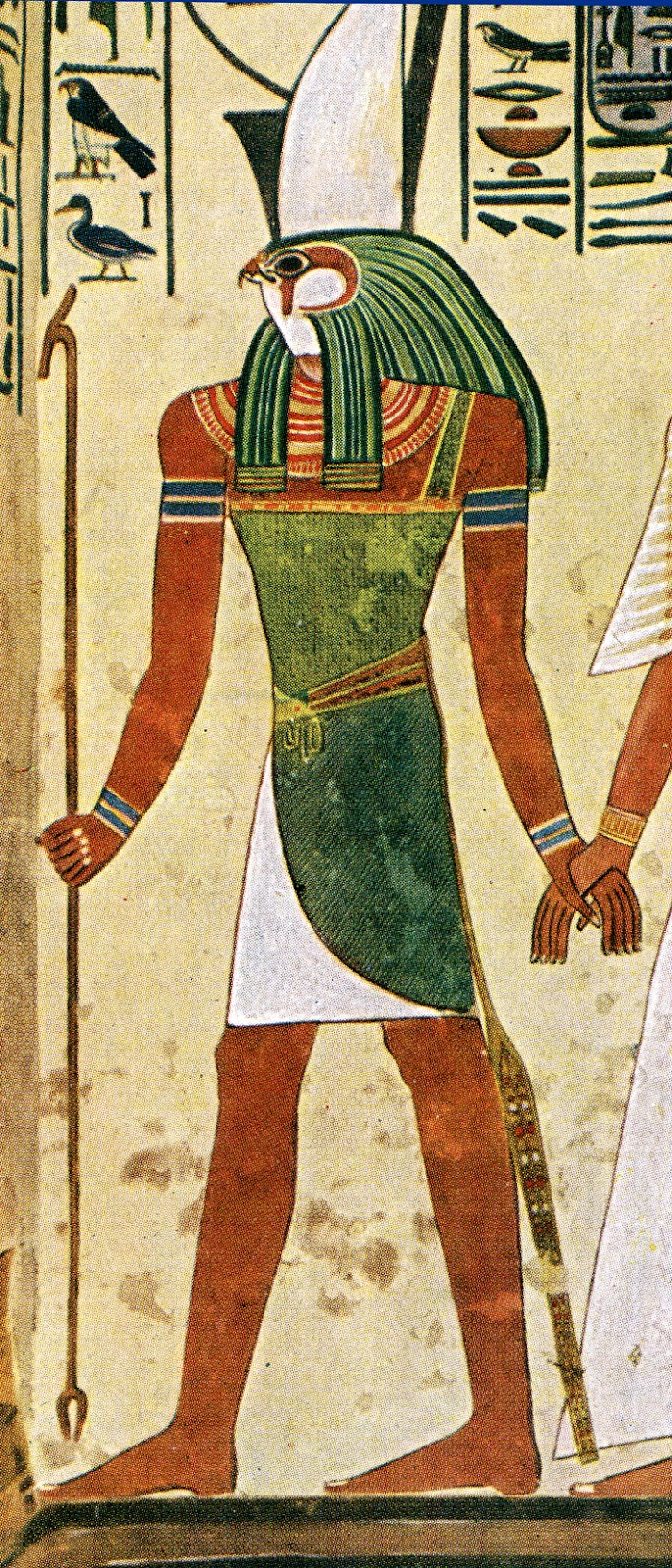
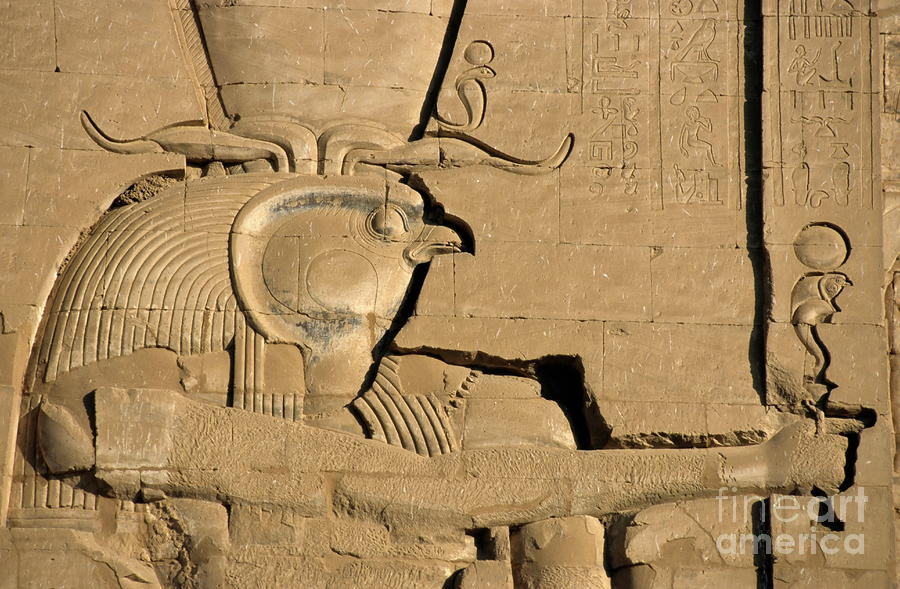
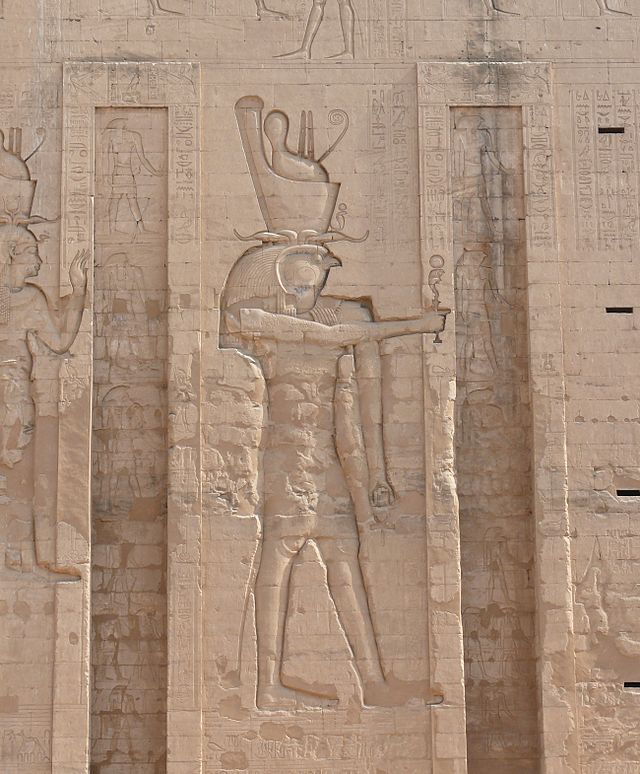
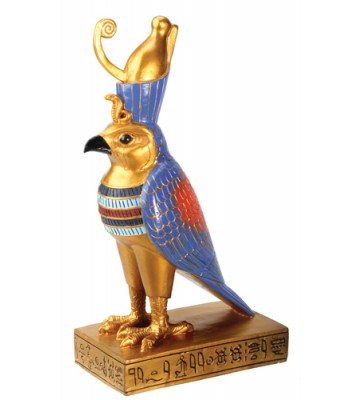
CHAPTER 11
Exodus 11:1-10
Exo 11:1 And hwhy said to Moses, I will still make come (bring) one plague upon Pharaoh and upon Egypt; after thus, shall send you away from this (here): As he sends away completely, driving, shall drive you out from this (here). 2 Speak now in the ears of the People, and they shall ask a man from ta his neighbor and a woman from ta her neighbor vessels of silver and vessels of gold.
3 And hwhy gave the People ta-grace (favor) in the eyes of Egypt. Also, Moses, the man, was much great in the land of Egypt, in the eyes of the servants of Pharaoh, and in the eyes of the people.
4 And Moses said, Thus says hwhy, Accarding to [(As)] the middle [(halfway)] of the night, I will go out in the midst of Egypt: 5 And every firstborn in the land of Egypt shall die, from the firstborn of Pharaoh that is sitting upon his throne unto the firstborn of the female servant which is behind the millstones; and every firstborn of animals. 6 And she shall be a great cry in all of the land of Egypt which has been none like him, and she shall be none like him adding (again). 7 And to all of the Sons of Israel shall a dog not move (sharpen) his tongue to with man and unto animal: by that, you may know how which hwhy shall distinguish (differentiate) between Egypt and between Israel. 8 And all of these servants of yours shall descend (come down) to me and they will bow to me, to say, Go out, you and all of the people which are among your feet: And after thus, I will go out. And went out from with Pharaoh in the glowness of anger.
9 And hwhy said to Moses, Pharaoh shall not listen to you; by that, My Miracles (Wonders) shall be multiplied in the land of Egypt. 10 And Moses and Aaron, they did ta-all of these miracles (wonders) to the face of Pharaoh: And hwhy strengthened ta-the heart of Pharaoh, and did not send away ta-the Sons of Israel from his land.
(NOTE: Not all verses will have comments)
hwhy was saying in this week's Torah portion chapter to Moses that this plague will be the "grand finale" against Egypt.
Verses one through three
Continuing with the plagues from the previous chapter of this week's Torah portion:
THE TENTH PLAGUE
1 And hwhy said to Moses, I will still make come (bring) one plague upon Pharaoh and upon Egypt; after thus, shall send you away from this (here): As he sends away completely, driving, shall drive you out from this (here). 2 Speak now in the ears of the People, and they shall ask a man from ta his neighbor and a woman from ta her neighbor vessels of silver and vessels of gold.
3 And hwhy gave the People ta-grace (favor) in the eyes of Egypt. Also, Moses, the man, was much great in the land of Egypt, in the eyes of the servants of Pharaoh, and in the eyes of the people.
Monte Judah of Lion and Lamb Ministries noted that this was the first time in all of the Ten Plagues that Moses was commanded to speak to the Assembly of the People, the "Israelites" regarding the Tenth Plague. In other words, it was a commandment to the corporate people of Israel, and not the individual as in the previous nine plagues.
Notice it didn't say that Moses was very great in the eyes of Pharaoh. Why was this so? Because Pharaoh was "Rah on Earth", and was supposed to be "the great one", but instead, Moses had become the new "great one". Recalling, this is what hwhy said to Moses, which is noted in the Torah portion of Va-Eyra, in the book of Exodus
Exodus 7:1 And hwhy said to Moses, See, I have given you of an elohim to Pharaoh:...
In other words, it was a competition between "Moses, an elohim to Pharaoh" and "Pharaoh, Rah on Earth", but hwhy was saying to Moses that hwhy, Himself, will win over Pharaoh through Moses, an elohim to Pharaoh. hwhy through Moses took away Pharaoh's popularity, and Moses became greater than Pharaoh. Pharaoh was most likely jealous and upset at this, saying to himself "How dare my people see Moses as greater than me, "Rah on earth"".
About 400 years later, the Philistines recalled the Egyptian plagues regarding the Israelites, which is noted in the book of the prophet Samuel
1 Samuel 4:6 And when the Philistines heard ta-the noise of the shout, they said, What meaneth the noise of this great shout in the Camp of the Hebrews? And they understood that the Ark of hwhy was come into the camp. 7 And the Philistines were afraid, for they said, Elohim is come into the camp. And they said, Woe unto us! For there hath not been such a thing heretofore. 8 Woe unto us! Who shall deliver us out of the hand of these mighty Elohim? These are the Elohim that smote ta-the Egyptians with all the plagues in the wilderness.
The news of hwhy and the Israelites and the plagues had carried for generations in the foreign nations.
Verses four through eight
4 And Moses said, Thus says hwhy, Accarding to [(As)] the middle [(halfway)] of the night, I will go out in the midst of Egypt: 5 And every firstborn in the land of Egypt shall die, from the firstborn of Pharaoh that is sitting upon his throne unto the firstborn of the female servant which is behind the millstones; and every firstborn of animals. 6 And she shall be a great cry in all of the land of Egypt which has been none like him, and she shall be none like him adding (again). 7 And to all of the Sons of Israel shall a dog not move (sharpen) his tongue to with man and unto animal: by that, you may know how which hwhy shall distinguish (differentiate) between Egypt and between Israel. 8 And all of these servants of yours shall descend (come down) to me and they will bow to me, to say, Go out, you and all of the people which are among your feet: And after thus, I will go out. And went out from with Pharaoh in the glowness of anger.
What hwhy is saying here is that every Egyptian on Pharaoh's side will experience a death in their home, whether a human being and/or an animal.
I am not clear about why the dogs would not move their tongues toward the Israelites, but I have an idea why this was emphasized, which I will reveal in a moment.
Verses nine and ten
9 And hwhy said to Moses, Pharaoh shall not listen to you; by that, My Miracles (Wonders) shall be multiplied in the land of Egypt. 10 And Moses and Aaron, they did ta-all of these miracles (wonders) to the face of Pharaoh: And hwhy strengthened ta-the heart of Pharaoh, and did not send away ta-the Sons of Israel from his land.
hwhy strengthened the heart of Pharaoh for the last time, which is the Hebrew text, "khazak" (qzx).
THE EGYPTIAN eLOHIM RELATING TO THE NINTH PLAGUE
I won't post all of them yet, but the Egyptian deity related to this plague from this Torah portion passage is "Anibus". This is what the Wikipedia website says about this deity
"Anubis (/əˈnuːbəs/ or /əˈnjuːbəs/; Ancient Greek: Ἄνουβις) is the Greek name of a jackal-headed god associated with mummification and the afterlife in ancient Egyptian religion.
Like many ancient Egyptian deities, Anubis assumed different roles in various contexts. Depicted as a protector of graves as early as the First Dynasty (c. 3100 – c. 2890 BC), Anubis was also an embalmer. By the Middle Kingdom (c. 2055 – 1650 BC), Anubis was replaced by Osiris in his role as Lord of the underworld. One of his prominent roles was as a god who ushered souls into the afterlife. He attended the weighing scale during the "Weighing of the Heart," in which it was determined whether a soul would be allowed to enter the realm of the dead. Despite being one of the most ancient and "one of the most frequently depicted and mentioned gods" in the Egyptian pantheon, however, Anubis played almost no role in Egyptian myths.
Anubis was depicted in black, a color that symbolized both rebirth and the discoloration of the corpse after embalming. Anubis is associated with Wepwawet (also called Upuaut), another Egyptian god portrayed with a dog's head or in canine form, but with grey or white fur. Historians assume that the two figures were eventually combined. Anubis' female counterpart is Anput. His daughter is the serpent goddess Kebechet."
Protector of tombs
"In
contrast to real jackals, Anubis was a protector of graves and
cemetaries.
Several epithets
attached to his name in Egyptian texts and inscriptians referred to
that role. Khenty-imentiu,
which means "foremost of the
westerners" and later became the name of a different jackal god,
alluded to
his protecting function because the dead were usually buried on the
west bank of the Nile. He took other names in connection with his
funerary role, such as "He who is upon his mountain" (tepy-dju-ef)
– keeping guard over tombs from above – and "Lord
of the
sacred land" (neb-ta-djeser),
which designates him as a god of
the desert necropolis.
Most ancient tombs had
prayers to Anubis carved on them".
Embalmer
"As "He who is in the place of embalming" (imy-ut), Anubis was associated with mummification. He was also called "He who presides over the god's pavilion" (khanty-she-netjer), in which "pavilion" could be refer either to the place where embalming was carried out, or the pharaoh's burial chamber".
These are images of the deity of Anibus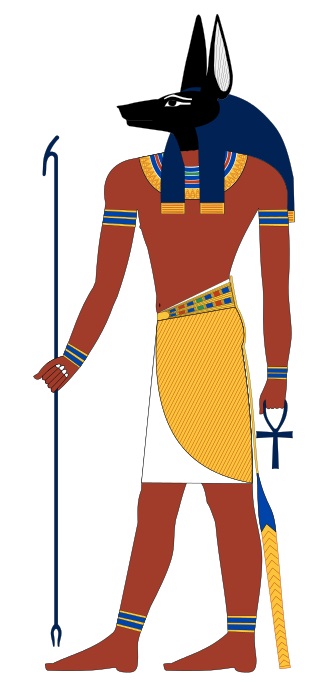
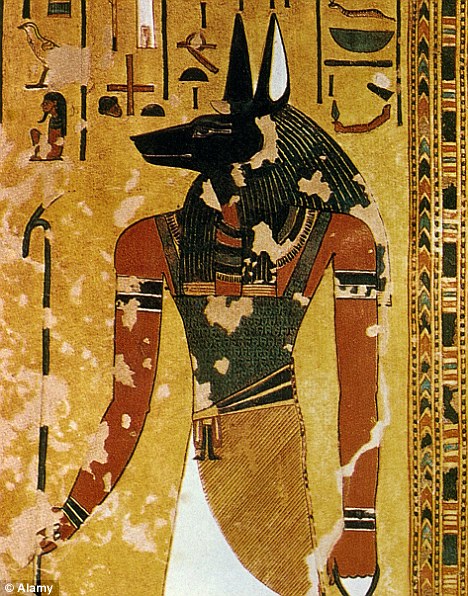
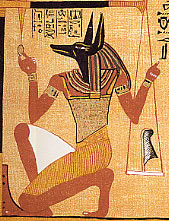
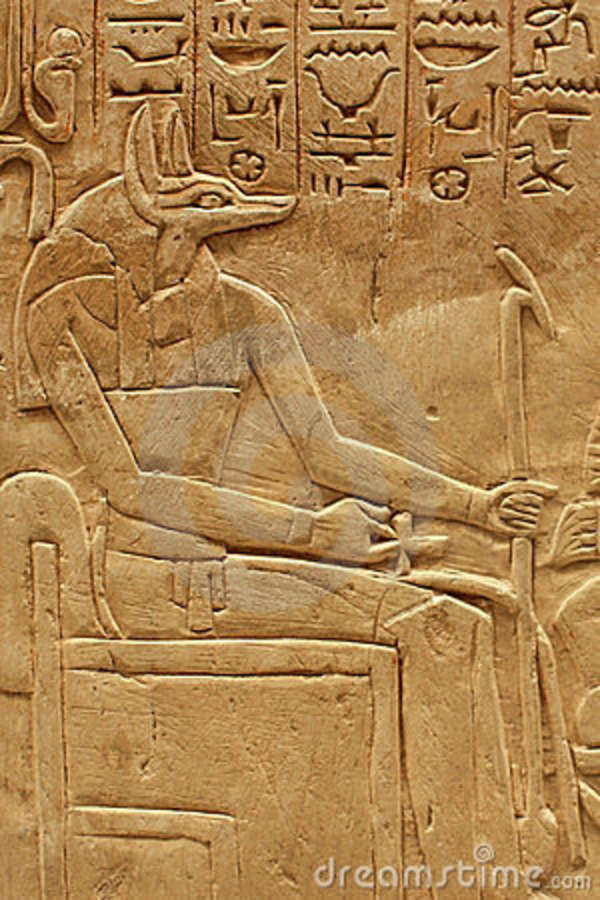
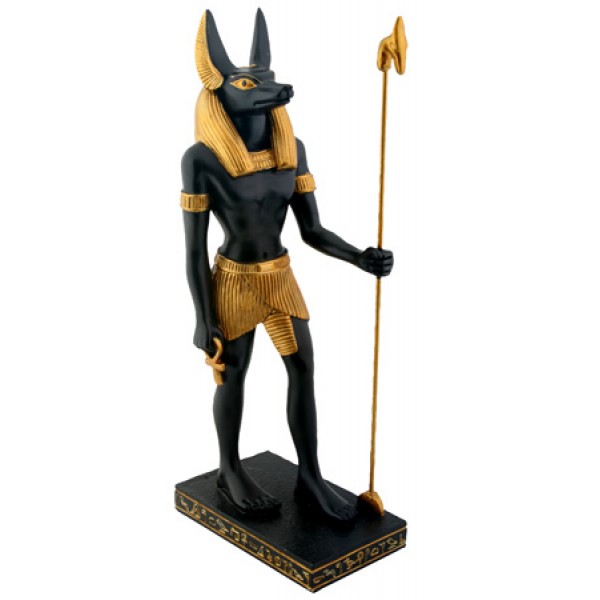
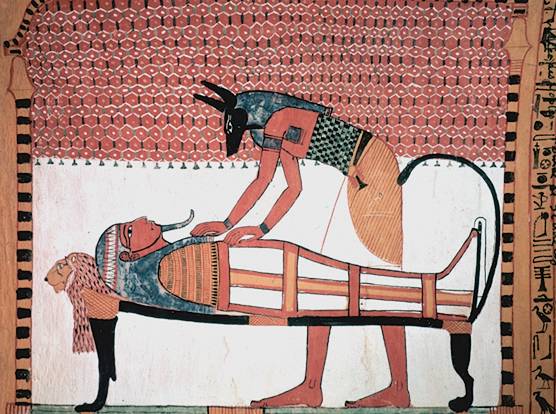
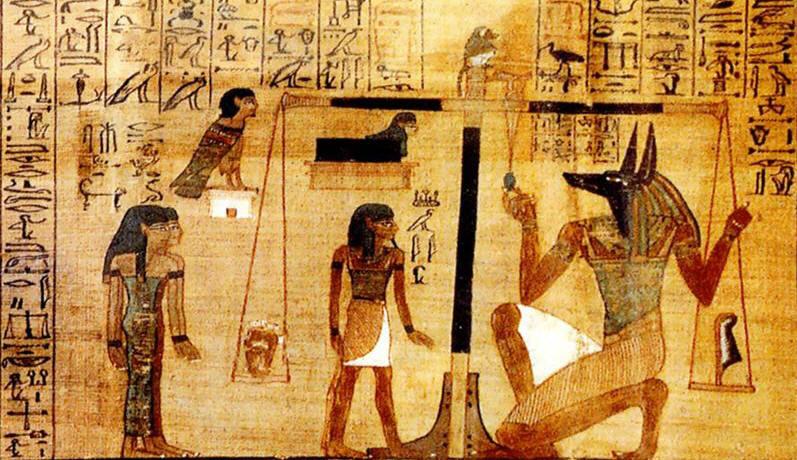
Notice this last image
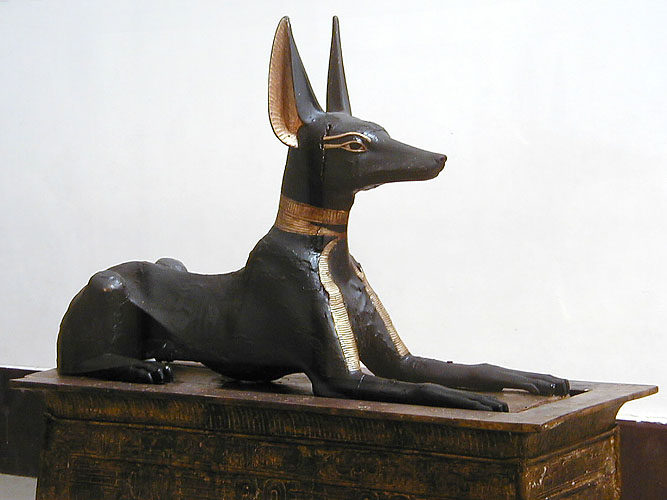
This was found in Tutankhamun's tomb. By the way, this kind of dog is called the Pharaoh Greyhound, and they do have big ears like the statute portrays. Based in verse seven of this week's Torah portion's chapter, I would not be surprised that when hwhy said the dogs will not point their tongue, the dogs would be imitating the statue of this Egyptian deity dog shown above.
Looking at verse eight of this week's Torah portion chapter, according to hwhy, those servants have now become Moses' servants, because back in the Torah portion of Va-Eyra, in the book of Exodus, in chapter seven, hwhy made Moses an elohim over Pharaoh and Pharaoh's servants. This now means that Pharaoh has become "Moses' servant".
CHAPTER 12
Exodus 12:1-51
Exo 12:1 And hwhy spoke to Moses and Aaron in the land of Egypt, to say, 2 This renewed month shall be to you the head of renewed months: he shall be to you the first for the renewed months of the Year.
3 Speak to all of the Congregation of Israel, to say, On the ten of this renewed month, and they shall take a man for themselves a lamb for a house of their father, a lamb for the house: 4 And if the household shall be little with being with the lamb, and he and his tabernacler (inhabitor) that is near [(, the one near)] to his house shall take on the enumeration (number, assessment) of the souls; You shall count (assess) upon the lamb a man by the mouth of his eating. 5 A lamb shall be a perfect (complete) remembered one (male) of a son of a year: shall be for yourselves from the sheep, and you shall take from the kids (young goats):
6 And shall be for you to guard (keep, observe, heed) until the four ten (fourteen) day of (for) this renewed month: and all of the Assembly of the Congregation of Israel, they shall slaughter him between the mixing periods. 7 And they shall take from the blood and they shall give him upon the two side posts, and upon the upper door post (lentil) upon the houses which they shall eat him in them. 8 And they shall eat ta-the flesh in this night roasted of fire; and they shall eat leavening upon bitters (bitter foods, bitter herbs). 9 You shall not eat from him raw (tough), and sodden (boiling) from boiling in water, for but roasted of fire; his head shall be upon (over) his shoulder legs and upon (over) his nearness (inwards). 10 And you shall not have yether-remain (have a remnant) from him until breaking period (morning); and of that yether-remaining (remnant, rest) from him until breaking period (morning) you shall burn up in the fire. 11 And according to [(as)] thus, you shall eat him with your loins (waist) girded, your sandals on your feet, and your shoots (sticks, germinated sticks) in your hand; And you shall eat him in haste (hasty flight): He is the Passover to hwhy. 12 And I will go over in the land of Egypt in this night, and will strike every firstborn in the land of Egypt, from Adam and unto animal; and I will do (make, execute) judgments (ordinances) on all of the elohim of Egypt: I am hwhy. 13 And the blood shall be to (for) you for a Sign upon the houses which you are there: And I will see ta-the blood, I will pass by, over (upon) you, and the plague shall not be on you to be destroyed in My striking in the land of Egypt. 14 And this day shall be to you for a Memorial (Remembrance); and you shall celebrate (make festive of) him of a Feast to hwhy for your generations; you shall celebrate (make festive of) him of a Statute of Ages.
15 Seven days shall you shall eat unleavening; Surely, on the first day you shall desist (cease, rid) sourdough from your houses: for anyone eating leavened from the first day unto the seventh day, and that soul shall be cut off her from Israel. 16 And on the first day shall be a Sacred (Holy) Calling (Convocation), and on the seventh day shall be a Sacred (Holy) Calling (Convocation) to yourselves; Any work shall not be done in them, surely which shall be eaten by every soul, he by his apartness shall be done to you [(by his aloneness, he shall be done to you)]. 17 And you will guard (keep, observe, heed) the Feast of ta-the Unleavened Bread; for on this same day, I have brought out ta-your armies from the land of Egypt: and you will guard (keep, observe, heed) ta-this day for your generations for a Statute of Ages.
18 In the first, on the four ten (fourteen) day of the renewed month, in the mixing period (evening), you shall eat unleavened, until the one and twenty day of the renewed month in the mixing period (evening). 19 Sourdough shall not be found in your houses seven days: for anyone eating from the leavened, and that soul shall be cut off her from the Congregation of Israel, among the sojourner (stranger), and among the native of the land. 20 You shall not eat any leavened; you shall eat unleavened in all of your dwellings.
21 And Moses called for all of the Elders of Israel, and said to them, Draw out and take [(They shall draw out, and they shall take)] for yourselves of the flock for your families, and slaughter the Passover. 22 And you shall take a bundle (bunch) of hyssop, and you shall dip in the blood which is in the bason (bowl), and you shall smite (antiplague, plague) to the upper door post (lintel) and to the two side posts from the blood which is in the bason; and you, a man of you shall not go out from the entrance of his house until breaking period (morning). 23 And hwhy will go over to plague (gore, stumble) ta-Egypt; and shall see ta-the blood upon the upper door post (lintel) and upon the two side posts, and hwhy will pass by over (upon) the entrance, and will not give the destroyer to come to your houses to plague (gore, stumble). 24 And you shall guard (keep, observe, heed) ta-this Word for a Statute to yourself and to your sons unto ages.
25 And shall be, when you come to the land which hwhy will give to you as the which was spoken, and you shall guard (keep, observe, heed) ta-this Service. 26 And shall be, when your sons, they shall say to you, What is this service to you? 27 And you shall say, He is the Sacrifice of the Passover to hwhy which passed by over (upon) the houses of the Sons of Israel in Egypt, in His plaguing (goreing, stumbling) ta-Egypt, and delivered (rescued) ta-our houses. And the People bowed, and they worshipped. 28 And the Sons of Israel, they went, and they did as the which hwhy commanded ta-Moses and Aaron, so they did.
29 And was, in the middle (halfway) of the night, and hwhy struck every firstborn in the land of Egypt, from the firstborn of Pharaoh that sat upon his throne, unto the firstborn of the captive which was in the house of the bore-prison; and every firstborn of animals.
30 And Pharaoh arose at night, he, and all his servants, and all of Egypt; and she was a great cry in Egypt; for was not a house which a dead one (a death) was not there. 31 And called for Moses and for Aaron at night, and said, Arise! and go out from the midst of my people, also you, also the Sons of Israel; And go, serve ta-hwhy according to [(as)] your word! 32 Take also your flocks, also your herds as the which you spoke, and go; And you bless me also!
33 And Egypt, she was strong upon the people to hasten to send them away from the land; for they said, All of us will be dead ones. 34 And the people lifted (bore, carried) ta-his dough before (not yet) becoming leavened, their kneading troughs were bound in their clothes upon their shoulders. 35 And the Sons of Israel, they did according to [(as)] the word of Moses; and they asked from Egypt vessels of silver, and vessels of gold, and clothing: 36 And hwhy gave the People ta-grace (favor) in the eyes of ta-Egypt, and was asked of them, and they plundered ta-Egypt.
37 And the Sons of Israel, they journeyed (pulled up) from Rameses to Succoth according to [(as)] six hundred thousand mighty men of foot, by apart from the little ones. 38 And also a mixed multitude ascended with them; and flocks, and herds, much heavy livestock.
39 And they baked ta-the dough which they brought out from Egypt of unleavened round cakes, for was not leavened; For they were driven out from Egypt, and and they were not able to delay (tarry, linger) her, and also they did not do (make, prepare) for themselves provision (victuals, game food).
40 And the dwelling of the Sons of Israel, which they dwelled in Egypt was thirty years and four hundred years. 41 And was from the end of thirty years and four hundred years, and was in this same day, all of the armies of hwhy, they went out from the land of Egypt. 42 He was a Night of Observation (Keeping, Guarding, Watching) to hwhy for bringing them out from the land of Egypt: he is this night to hwhy an Observance (Keeping, Guarding, Heeding) for all of the Sons of Israel for their generations.
43 And hwhy said to Moses and Aaron, This is the Statute of the Passover: Every son of a foreigner shall not eat on him: 44 And every servant of a man purchased (bought) of silver, and you shall circumcise him, then shall eat on him. 45 A dweller (foreign dweller) and a hired servant shall not eat on him. 46 Shall be eaten in one house; you shall not go out from the flesh from the house to the outside; and you shall not shever-break a bone on him. 47 All of the Congregation of Israel, they shall do (make, prepare) him. 48 And when a sojourns (stranger) shall sojourn with you, and shall do the Passover to hwhy, every remembered one (male) to him shall be circumcised, and then shall come near to do (make, prepare) him; and shall be like the native of the land: and anyone uncircumcised shall not eat on him. 49 One Teaching (Torah) shall be to the native and to the sojourner (stranger) that sojourns in your midst. 50 And all of the Sons of Israel, they did as the which hwhy commanded ta-Moses and ta-Aaron, so they did. 51 And was on this same day that hwhy brought out ta-the Sons of Israel from the land of Egypt, upon their armies.
(NOTE: Not all verses will have comments)
Verses one and two
1 And hwhy spoke to Moses and Aaron in the land of Egypt, to say, 2 This renewed month shall be to you the head of renewed months: he shall be to you the first for the renewed months of the Year.
This month is called "Aviv". I will explain it later in the next chapter of this week's Torah portion.
It has been well publicized that Rosh Hashanah, Biblically called Yom Teruah, is in the seventh Biblical month of Ethanim/Tishri, and this is the start of the new Biblical year. I have found concrete scriptures that contradicts this premise. Starting with the account of Aaron, the High Priest, Moses' brother, who was about to die, which is noted in the Torah portion of Khukath, in the book of Numbers
Numbers 20:22 And pulled up (journeyed) from Kadesh. And the Sons of Israel, of all of the Congregation, they came at the Hor of the Mount [(Mount of the Hor, Mount Hor)]. 23 And hwhy spoke to Moses and to Aaron on the Hor of the Mount [(Mount of the Hor, Mount Hor)], upon the border of the land of Edom, to say, 24 Aaron shall be gathered to his People: for shall not go to the land which I have given to the Sons of Israel, upon which you rebelled at ta-My Mouth by the waters of Meribah. 25 Take ta-Aaron, and ta-Eleazar, his son, and have them ascend at the Hor of the Mount [(Mount of the Hor, Mount Hor)]: 26 And shall strip ta-Aaron of ta-his Garments, and you shall have ta-Eleazar, his son, clothe them: and Aaron shall be gathered and shall die there. 27 And Moses did as the which hwhy commanded: and they acended to the Hor of the Mount [(Mount of the Hor, Mount Hor)] to the eyes of all of the Congregation. 28 And Moses stripped ta-Aaron of ta-his Garments, and had ta-Eleazar, his son clothed them; and Aaron died there in the head of the mountain (the Hor): and Moses and Eleazar descended (came down) from the mountain (the Hor). 29 And all of the Congregation, they saw for Aaron had expired. And they mourned ta-Aaron thirty days, all of the House of Israel.
There is a specific account showing the date of Aaron's death on Mount Hor, which is noted in the Torah portion of Masei, in the book of Numbers
Numbers 33:37 and they pulled up (journeyed) from Kadesh, and they encamped in Hor of the Mount [(Mount of the Hor, Mount Hor)], on the edge of the land of Edom, 38 and Aaron, the Priest, ascended to Hor of the Mount [(Mount of the Hor, Mount Hor)] upon the Mouth of hwhy, and was the death [(and died)] there in the fortieth year of the outgoing of the Sons of Israel from the land of Egypt, in the fifth renewed month, on the one of the renewed month, 39 and Aaron was a son of three and twenty and a hundred years in his death on Hor of the Mount [(Mount of the Hor, Mount Hor)],
This shows that Aaron died in the fortieth year in the fifth month on the first day of the month. Keep that in mind. I wan't to show the order of the Israelites journeys in the wilderness in this same chapter starting with Mount Hor
Numbers 33:37 and they pulled up (journeyed) from Kadesh, and they encamped in Hor of the Mount [(Mount of the Hor, Mount Hor)], on the edge of the land of Edom, 38 and Aaron, the Priest, ascended to Hor of the Mount [(Mount of the Hor, Mount Hor)] upon the Mouth of hwhy, and was the death [(and died)] there in the fortieth year of the outgoing of the Sons of Israel from the land of Egypt, in the fifth renewed month, on the one of the renewed month, 39 and Aaron was a son of three and twenty and a hundred years in his death on Hor of the Mount [(Mount of the Hor, Mount Hor)],
40 and King Arad, the Canaanite, heard, and he dwelled in the negeb (south) in the land of Canaan, on the coming of the Sons of Israel,
41 and they pulled up (journeyed) from Hor of the Mount (Mount of the Hor, Mount Hor), and they encamped in Zalmonah,
42 and they pulled up (journeyed) from Zalmonah, and they encamped in Punon,
43 and they pulled up (journeyed) from Punon, and they encamped in Oboth,
44 and they pulled up (journeyed) from Oboth, and they encamped in Ije HaAbarim [(Ije of the Abarim, Eye of the Going Overs)], in the border of Moab,
45 and they pulled up (journeyed) from Iim, and they encamped in Dibon Gad,
46 and they pulled up (journeyed) from Dibon Gad, and they encamped in Almon Diblathaim,
47 and they pulled up (journeyed) from Almon Diblathaim, and they encamped in Mountains of the Abarim, to the face of Nebo,
48 and they pulled up (journeyed) from Mountains of the Abarim, and they encamped in the plains (going overs) of Moab upon Jordan at Jericho [Jordan-Jericho)],
49 and they encamped upon the Jordan, from Beth HaJesimoth [(House of the Jesimoth)] unto Abel haShittim [(Abel of the Shittim, Abel of the Acacias, Meadow of the Shittim, Meadow of the Acacias)] in the plains (going overs) of Moab.
As it is shown, Aaron died ten pitchings before Moses, and the Israelites arrived at the plains of Moab beside the Jordan. Jordan was the Israelite's last stop where Moses was to die before they were to cross over the Jordan.
If one looks at the last two chapters of the book of Numbers, they show that Moses and the Israelites were still at the Jordan at the plains of Moab.
This next source is the crucial scripture that would provide the connection of my premise, which is located in the Torah portion of D'varim, in the book of Deuteronomy
Deuteronomy 1:1 These are the words which Moses spoke to all of Israel in the going over the Jordan in the wilderness, in the in the going over [(on the plain)] opposite (at the front of, cutting short of, circumcising) Suph (Reeds), between Paran, and between Tophel, and Laban, and the Hazeroth, and Di Zahab, 2 one ten (oneteen, eleven) days from Horeb at the way of Mount Seir unto Kadesh Barnea. 3 And was in the fortieth year, in the tenth ten (tenthteen, eleven) renewed month, on the one of the renewed month, Moses spoke to the Sons of Israel according to [(as)] all which hwhy commanded him to them;
Moses spoke this beyond the Jordan on the fortieth year in the eleventh month of Shevat, on the first day of the month, six months later, after Aaron died on Mount Hor. If Rosh Hashanah was the Biblical New Year, it would have started the new year in the seventh month of Ethanim/Tishri, four months before this account in Deuteronomy, and would have made it the forty-first year instead of still being the fortieth year. If this was the case, it would have broken the Word of hwhy, because they were to be in the wilderness no later than forty years, as hwhy said to Moses, which is noted in the Torah portion of Sh'lakh L'kha, in the book of Numbers
Numbers 14:28 28 Say to them, I live, states hwhy, if not as the which you have spoken in My Ears, so I will do to you: 29 In this wilderness shall your faint bodies (exhausted bodies, dead bodies, corpses) and all of your visited (accounted, counted) ones shall fall; by all of your scrolls (enrollments, numbers), from a son of twenty years and the upward (ascending), which you have murmured (grudged, complained) upon (over) Me, 30 If you, you shall come to the land, which I have bore (carried, lifted up) ta-My Hand to have you tabernacle in her, for but Caleb, son of Jephunneh, and Joshua, son of Nun.
31 And your little ones (infants), which you said shall be for the plunder (booty), and I shall bring them, and they shall know ta-the land which have rejected (despised) against her. 32 And of you, your faint bodies (exhausted bodies, dead bodies, corpses), they shall fall in this wilderness. 33 And your sons, they shall be shepherds in the wilderness forty years, and they shall bear (carry, lift up) ta-your whoredoms (harlotries) until your faint bodies (exhausted bodies, dead bodies, corpses) shall be completed in the wilderness. 34 On the enrollment (scroll, number) of the days which you searched out (toured) ta-the land, forty days, a day for the year, a day for the year, you shall bear (carry, lift up) ta-your iniquities forty years, and you shall know ta-My Alienation. 35 I am hwhy, I have spoken. If not this shall I do to all of this evil Congregation that was appointed upon (over) Me: in this wilderness they shall be completed, and there they shall die.
Forty complete years. No more, no less, and it will be explained more below.
Looking at the scripture regarding Moses' death, which is noted in the Torah portion of V'Zoth Ha-B'rakhah, in the book of Deuteronomy
Deuteronomy 34:5 And Moses, the servant of hwhy, died there [(And was the death of Moses, the servant of hwhy there)] in the land of Moab upon the Mouth of hwhy, 6 and buried him in a narrow area (gorge, narrow lofty area, ?back?, ?back area?, ?majestic area?) in the land of Moab opposite (at the front of) Beth Peor: and a man does not know ta-his burial place unto this day. 7 And Moses was a son of a hundred and twenty years in his death: his eye had not faint (weak, dulled, dimmed), and the freshness (force, ?vigor?) had not fled. 8 And the Sons of Israel wailed (wept) of ta-Moses in the going overs (plains) of Moab thirty days: and the days of weeping (wailing) of the lamenting (mourning) of Moses had completed. 9 And Joshua, son of Nun, was full of the Spirit of Wisdom; for Moses had supported (laid) ta-his hands upon him: and the Sons of Israel, they listened to him, and they did as the which hwhy commanded ta-Moses.
It is strongly probable that Moses died on the twelfth month of Adar, on the seventh day of the month. This was mentioned in one of my Torah portion commentary of Sh'moth, in the book of Exodus.
Next, Joshua was about to cross over the Jordan, which is noted in the book of Joshua
Joshua 1:1 Now after the death of Moses, the servant of hwhy, it came to pass, that hwhy spake unto Joshua, son of Nun, Moses' minister, saying, 2 Moses, My servant, is dead; now therefore arise, go over ta-this Jordan, thou, and all this People, unto the land which I do give to them, even to the Sons of Israel.... 10 Then Joshua commanded ta-the Officers of the People, saying, 11 Pass through the Host, and command ta-the People, saying, Prepare you victuals; for within three days ye shall pass over ta-this Jordan, to go in to possess ta-the land, which hwhy, your Elohim, giveth you to possess it.
This account gives the date that Joshua and the Israelites crossed over the Jordan, which is noted in the book of Joshua
Joshua 4:19 And the People came up out of Jordan on the tenth day of the first month, and encamped in Gilgal, in the East border of Jericho.
It was in the first month of Aviv/Nissan, on the tenth day of the month, that the Israelites crossed over the Jordan. That means that the date of Joshua in the book of Joshua, in chapter one, three days prior, would have occurred on the first month of Aviv/Nissan on the seventh day of the month. That was the day that hwhy talked to Joshua after the thirty days of mourning after Moses' death. This would take the time line back to the twelfth month of Adar on the seventh day, the date that Moses died.
The date that Joshua and the Israelites crossed over the Jordan, on the tenth day of the first month of Aviv/Nissan, was two months and seven days after Deuteronomy 1:1-3 where Moses was beyond the Jordan.
Say that the Rosh Hashanah started the new year on the seventh Biblical month of Ethanim/Tishri, making it the forty-first year that Moses died, and Joshua went over the Jordan on the first month of Aviv/Nissan still in the forty first year.
This is a chart of the time line of events based on the traditional Rosh Hashanah new year
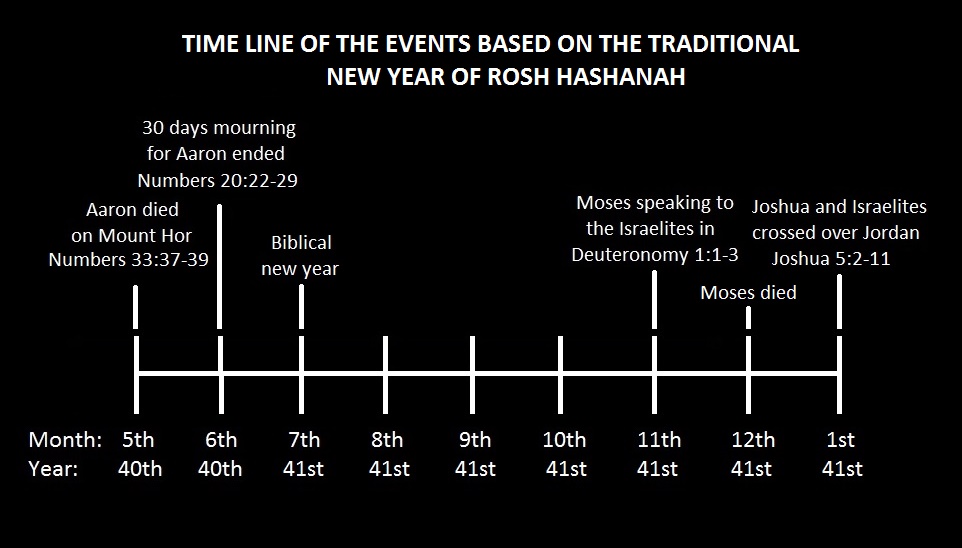
This would go against hwhy's Word that they were to stay in the wilderness for only forty years. Joshua would have to wait another six months before they would have crossed over the Jordan, which goes against the Scripture time lines mentioned above. In other words, Joshua crossed over the Jordan on the forty-first year, in the first month of Aviv/Nissan, which is the true Biblical New Year, and not six months later of the seventh month of Ethanim/Tishri, after the traditional new year of Rosh Hashannah started.
This is a chart of a more Biblically correct time line of these events
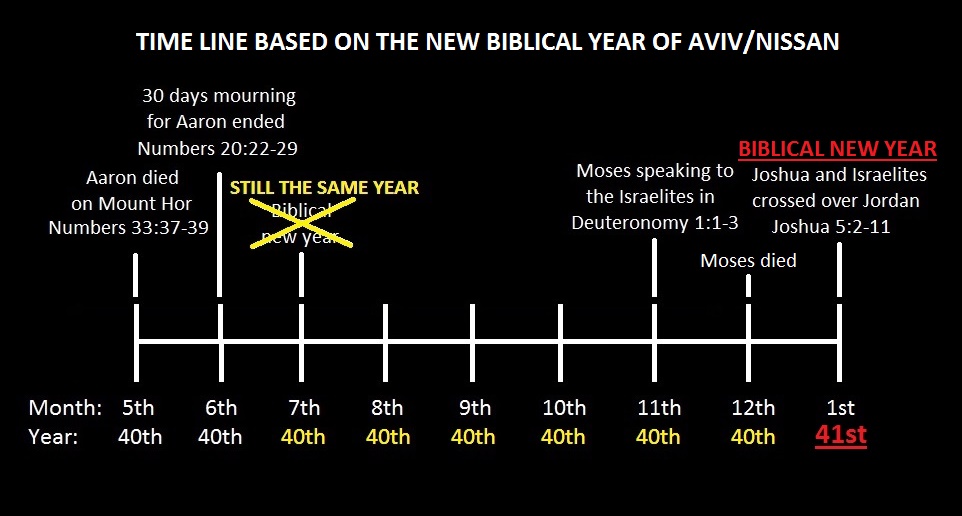
Based on these scriptural accounts and the scripture time lines, Rosh Hashanah is not Biblical, and it does not start the Biblical New Year in the seventh month of Ethanim/Tishri. The true Biblical New Year starts on the first month of Aviv/Nissan.
hwhy works with most calendars, and I respect a good part of them. hwhy works with the Jewish civil calendar that says the new year starts on the seventh month, but in hwhy's calendar, the Torahic calendar, which is an agricultural calendar, the head of the year begins with the month of Aviv/Nissan. You can find this teaching titled "Rosh Hashannah, the Biblical New Year?" by clicking on the link below to get the webpage.
ROSH HASHANNAH, THE BIBLICAL NEW YEAR?
Verses three through five
3 Speak to all of the Congregation of Israel, to say, On the ten of this renewed month, and they shall take a man for themselves a lamb for a house of their father, a lamb for the house: 4 And if the household shall be little with being with the lamb, and he and his tabernacler (inhabitor) that is near [(, the one near)] to his house shall take on the enumeration (number, assessment) of the souls; You shall count (assess) upon the lamb a man by the mouth of his eating. 5 A lamb shall be a perfect (complete) remembered one (male) of a son of a year: shall be for yourselves from the sheep, and you shall take from the kids (young goats):
Based on verses one and two, it is most probable that hwhy spoke these verses to Moses on the first day of the first month of Aviv/Nissan. When these three verses are read, we always think that it occurred just before the Passover on the fourteenth day, but looking at these verses, one could see that this was spoken at an earlier time for this future event. In verse three of this week's Torah portion passage, when hwhy told Moses "...on the tenth day...", this was a future date. hwhy did not say, "tomorrow, take a lamb", because that would put it on the ninth day with not much time for the Israelites to prepare. It is my opinion that hwhy's conversation with Moses could have occurred on the first day of the Biblical month of Aviv/Nissan.
For those who are new to the Hebraic Roots/Messianic movement, or want to understand the Torah based on the montly lunar cycle, the Biblical fourteenth day of any month occurs on a "full moon", and not on a slivered moon that The Ten Commandments movie, with Charlton Heston playing Moses, displayed.
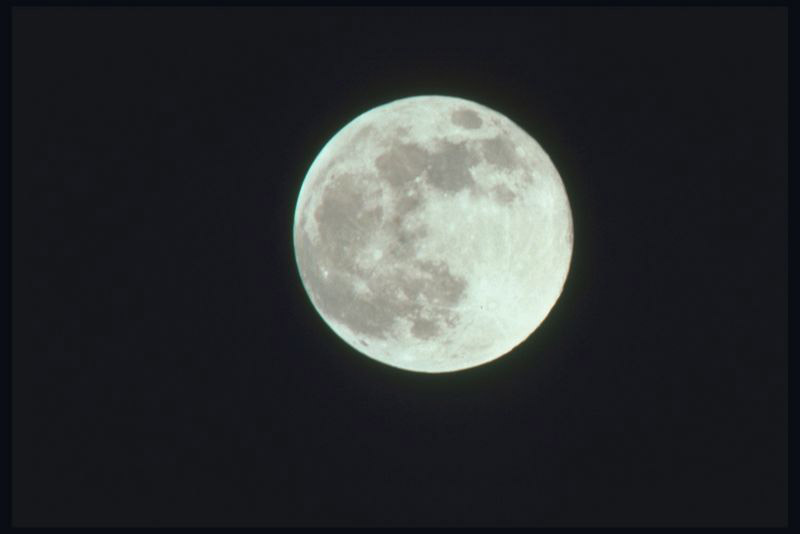
Looking at the word LAMB
The Hebrew word for lamb is "seh"- Shin, Heh (hs). It is from Strong's Concordance number 7716, and its definition
Probably from H7582 through the idea of pushing out to graze; a member of a flock, that is, a sheep or goat: - (lesser, small) cattle, ewe, lamb, sheep.
from 7582 "shah-ah" (has), and its definition
A primitive root; to rush; by implication to desolate: - be desolate, (make a) rush (-ing), (lay) waste.
Looking at the root meaning of the Hebrew word, that is why Egypt called it an abomination, which Joseph noted in the Torah portion of Vayigash, in the book of Genesis
Genesis 46:31 And Joseph said to his brothers and to the house of his father, I will ascend, and I will tell (declare, report, newsify) to Pharaoh, and I will say to him, My brothers and the house of my father which were in the land of Canaan, they have come to me; 32 And the men are shepherds of flocks, for they are men of livestock; And they have brought to them their flocks, and their herds, and all which belong to them. 33 And shall be, when Pharaoh calls to you, and says, What is your occupation (doing, work)? 34 And you shall say, Your servants have been men of livestock from our youth, and until now, also we, also our fathers: in over (order) that you may dwell in the land of Goshen; for every shepherd of flocks is an abomination (a disgust, a detestable, an abhorrence) of Egypt.
Moses also reminded Pharaoh why the Israelites can't sacrifice a lamb in Egypt, which is noted in the Torah portion of Va-Eyra, in the book of Exodus
Exodus 8:25 And Pharaoh called to Moses and to Aaron and said, Go sacrifice to your Elohim in the land! 26 And Moses said, Is not established to do so. For our sacrificing to hwhy, our Elohim, is an abomination (a disgust, a detestable, an abhorrence) of Egypt. Behold, we be sacrificing ta-an abomination (a disgust, a detestable, an abhorrence) of Egypt to their eyes, will they not skullstone (stone) us?
This is, because the name of the lamb animal in its root definition means "desolate".
It is also interesting to note that the Hebrew root word "shah-ah" means "rush". hwhy no doubt applied this implication for a lamb (or a kid of goats) to "rush" in the Passover preparation, and hwhy knew that the lambs (or kids of goats) would cook faster than adult rams (or kids).
According to this week's Torah portion passage, the lamb (or kid) would be brought into the home on the tenth day and be kept in the home until the fourteenth day of the month. This is the same time frame that Yeshua went into Jerusalem in the tenth day of Aviv/Nissan until the fourteenth day of Aviv/Nissan, and became the Passover Lamb for the sacrifice. Understood that Yeshua was crucified on the fourteenth day of Aviv/Nissan, this is the account of the tenth day of Aviv/Nissan, which is noted in the Gospel of John
John 12:1 Then Yeshua six days before the Passover [the ninth day of Aviv/Nissan] came to Bethany, where Lazarus was which had been dead, whom he raised from the dead. 12 On the next day [the tenth day of Aviv/Nissan] much People that were come to the Feast, when they heard that Yeshua was coming to Jerusalem, 13 Took branches of palm trees, and went forth to meet Him, and cried, Hosanna: Blessed is the King of Israel that cometh in the Name of hwhy. 14 And Yeshua, when He had found a young donkey, sat thereon; as it is written, 15 Fear not, daughter of Sion: behold, thy King cometh, sitting on an donkey's colt.
I want to note that when it says Passover in John's passage, it was referring to the first day of the Feast of Unleavened Bread on the fifteenth day of Aviv/Nissan. In the Gospels, when it says the Preparation Day, it was reffering to the actual Biblical Passover on the fourteenth day of Aviv/Nissan. The Jews altered the names at that time. The Jews and most of the Messianic/Hebraic Roots brethren use the same terminology, and the Jewish Calendars today have placed Passover on the fifteenth day of Aviv/Nissan.
Verse six
6 And shall be for you to guard (keep, observe, heed) until the four ten (fourteen) day of (for) this renewed month: and all of the Assembly of the Congregation of Israel, they shall slaughter him between the mixing periods.
This is how the King James Version translated this verse
Exodus 12:6 (KJV) And ye shall keep it up until the fourteenth day of the same month: and the whole assembly of the Congregation of Israel shall kill it in the evening.
Looking at the Hebrew text, it says "Beyn Ha-aravim" (Mybreh Nyb). We will look at these two Hebrew words
Looking at the following words:
BETWEEN
The Hebrew word for between is "beyn"- Bet, Yod, Nun Sophit (Nyb). It is from Strong's Concordance number 996, and its definition
(Sometimes in the plural masculine or feminine); properly the constructively contracted form of an otherwise unused noun from H995; a distinction; but used only as a preposition, between (repeated before each noun, often with other particles); also as a conjugation, either... or: - among, asunder, at, between (-twixt . . . and), + from (the widest), X in, out of, whether (it be... or), within.
Beyn is translated as "between". This makes sense, because this is the most common translation, as we will see.
MIXING PERIODS
The Hebrew word for mixing periods is "eh-rehv"- Ayin, Resh, Bet (bre). Its is from Strong's Concordance number 6153, and its defintion
From H6150; dusk: - + day, even (-ing, tide), night.
from 6150 "arav" (bre), and its definition
A primitive root (rather identical with H6148 through the idea of covering with a texture); to grow dusky at sundown: - be darkened, (toward) evening.
from 6148 "ah-rahv" (bre), and its definition
A primitive root; to braid, that is, intermix; technically to traffic (as if by barter); also to give or be security (as a kind of exchange): - engage, (inter-) meddle (with), mingle (self), mortgage, occupy, give pledges, be (-come, put in) surety, undertake.
Erev is translated as "evening" or "mixing". I will explain this later in this chapter.
Verse seven
7 And they shall take from the blood and they shall give him upon the two side posts, and upon the upper door post (lentil) upon the houses which they shall eat him in them.
Bill Cloud of Shoreshim Ministries noted that the upper door post and the two doorposts, the areas in which blood is striken, form the letter khet (x), and one of the meanings of this letter in the Paleo-Hebrew is "separation". In this case, the blood forming the letter Khet creates a "separation" between those who are submitted to hwhy by partaking in the Passover in painting the blood on the "Khet", or "separated", entrance than those who don't.
Also, there are those who say that the blood was not struck outside on the lintel and door posts, but hidden, but hwhy could still see it as He passed over. I do not agree with this premise, because if hwhy wanted it hidden, He would have said it. If it was hidden, hwhy wouldn't be able to see it from the outside and would have treated it as if they were not covered with the blood at all. The blood was clearly visible outside for people to see from street view, as it is noted in verse twenty three of this week's Torah portion chapter
Exodus 12:23 And hwhy will go over to plague (gore, stumble) ta-Egypt; and shall see ta-the blood upon the upper door post (lintel) and upon the two side posts, and hwhy will pass by over (upon) the entrance, and will not give the destroyer to come to your houses to plague (gore, stumble).
hwhy's destroyer wasn't going to take time to look inside the crevice of each of the three sides of everyone's entrance to see if the blood can be seen, or knock on the door and say, "Destroyer here. Can you shed some light in your entrance crevices so that I can get a good look to see if blood is on each of the three places of your door frame?". The destroyer would have plainly seen the blood on the outside just like any human being would be able to naturally see it as one is walking by anyone's entrance at a home. It wasn't "hidden" as some that say it was.
Verse eight
8 And they shall eat ta-the flesh in this night roasted of fire; and they shall eat leavening upon bitters (bitter foods, bitter herbs).
The Aleph-Tav is located with the phrase "the flesh". This is saying that it is symbolic of Yeshua's Flesh- "the Passover Lamb".
Also in verse eight of this week's Torah portion passage, it states three items to eat on Passover night:
One: The flesh
Two: The unleavened bread
Three: The bitter herbs
Yeshua is symbolized as the unleavened bread. Yeshua said in the night of the Passover, which is noted in the Gospel of Matthew
Matthew 26:26 And as [the disciples] were eating, Yeshua took bread, and blessed it, and brake it, and gave it to the disciples, and said, Take, eat; this is My Body.
Believe it or not, Yeshua's disciples partook of the Passover Meal. When the Israelites partook of these three items for the Exodus Passover, they were eating these symbols:
The Flesh: The partaking of Yeshua, the Passover Lamb
The Unleavened Bread: Yeshua's Body which has "no sin"
Bitter Herbs: The bitterness that Yeshua suffered when He was crucified; also the bitterness that the Israelites suffered when they were slaves to Pharaoh
Looking at the word BITTERS
The Hebrew word for bitter is "m'rohr"- Mem, Resh, Resh (rrm (or rwrm)). It is from Strong's Concordance number 4844, and its definition
From H4843; a bitter herb: - bitter (-ness).
from 4843 "mah-rahr" (rrm), and its definition
A primitive root; properly to trickle (see H4752); but used only as a denominative from H4751; to be (causatively make) bitter (literally or figuratively): - (be, be in, deal, have, make) bitter (-ly, -ness), be moved with choler, (be, have sorely, it) grieved (-eth), provoke, vex.
from 4752 "mahr" (rm), and its definition
From H4843 in its original sense of distillation; a drop: - drop.
from 4751 "mar" or "marah" (rm or hrm), and its definition
From H4843; bitter (literally or figuratively); also (as noun) bitterness, or (adverbially) bitterly: - + angry, bitter (-ly, -ness), chafed, discontented, X great, heavy.
This is where we get our modern English word "mar"- an act of "affliction".
On Passover in today's time, the Jewish people traditionally do a Passover Seder, which contains various items on a seder plate, including an egg, which most likely derived from pagan Babylonian roots. It goes beyond the three items required for the Passover meal, but the lamb that is part of the Jewish Seder is nothing but "a dry shank bone", and is inedible to eat. To me, it goes against scripture, and I do not participate in the Seder. I will not stop from those who do it, but to me, it is adding to what hwhy said, which is noted in the Torah portion of Va-Ethkhanan, in the book of Deuteronomy
Deuteronomy 4:1 And now, Israel, listen to the Statutes and to the Judgments (Ordinances) which I am having you learn to do them, by that, you may live, and you will enter, and you will possess (occupy) ta-the land which hwhy, the Elohim of your fathers, is giving to you. 2 You shall not add upon the Word which I am commanding you, and you shall not diminish (remove, scrape off, shave off) from him, to keep ta-the Commandments of hwhy, your Elohim, which I am commanding you.
It is theory that whoever were the Jewish Rabbis centuries ago who "added" the elements, especially the "egg", which was not related to the Exodus Passover, could have done this as an act to distract, camoflouge and hide the basic three items that would portray Yeshua, the Messiah. On top of that, they use a bone of the lamb instead of having lamb meat on a Seder Plate as a means of hindering the partaking of eating lamb meat, which would be an act of symbolically eating "Yeshua's Flesh". As I mentioned, I do not participate in this Jewish Seder. I just keep it simple and eat only the three items that hwhy commanded. Whatever anyone does is up to the indivual, or family.
Also, these three items of the Exodus Passover Meal were eaten was a Food Covenant. For example, Jacob ate a feast for sealing the deal for his first wife, which he found out later was Leah, and when Jacob ate the Food Covenant, it cannot be broken. The same with Jacob and Esau's Food Covenant with the red soup in agreement for Esau to give his firstborn right to Jacob. Yeshua also made a Food Covenant with His disciples by partaking the bread and cup- the symbols of His Body and His Blood. On the negative end of Yeshua's meal, Judas took a Food Covenant, but in the negative end, by having the bread dipped in the wine, and that was known as "the Food Covenant of Betrayal". When Judas took it, HaSatan entered into Judas to betray Yeshua, which is noted in the Gospel of John
John 13:21 When Yeshua had thus said, He was troubled in spirit, and testified, and said, Verily, verily, I say unto you, that one of you shall betray Me. 22 Then the disciples looked one on another, doubting of whom He spake. 23 Now there was leaning on Yeshua's bosom one of His disciples, whom Yeshua loved. 24 Simon Peter therefore beckoned to him, that he should ask who it should be of whom He spake. 25 He then lying on Yeshua's Breast saith unto Him, Lord, who is it? 26 Yeshua answered, He it is, to whom I shall give a sop, when I have dipped it. And when he had dipped the sop, he gave it to Judas Iscariot, the son of Simon. 27 And after the sop Satan entered into him....
This is what it says regarding Yeshua's Supper, which is noted in the apostle Paul's letter to the assembly in Corinth
1 Corinthians 11:20 When ye come together therefore into one place, this is not to eat the hwhy's Supper. 21 For in eating every one taketh before other His own supper: and one is hungry, and another is drunken. 22 What? have ye not houses to eat and to drink in? Or despise ye the Assembly of the Lord, and shame them that have not? What shall I say to you? Shall I praise you in this? I praise you not. 23 For I have received of the Lord that which also I delivered unto you, That the Lord Yeshua the same night in which He was betrayed took bread: 24 And when He had given thanks, He brake it, and said, Take, eat: this is My Body, which is broken for you: this do in remembrance of Me. 25 After the same manner also He took the cup, when He had supped, saying, This cup is the New Covenant in My Blood: this do ye, as oft as ye drink it, in remembrance of Me. 26 For as often as ye eat this Bread, and drink this Cup, ye do shew the Lord's Death till He come. 27 Wherefore whosoever shall eat this Bread, and drink this Cup of the Lord, unworthily, shall be guilty of the Body and Blood of the Lord.
This is what Judas did, though it was not considered as the Body and Blood of Yeshua, and the result was HaSatan entered into him.
Verse nine
9 You shall not eat from him raw (tough), and sodden (boiling) from boiling in water, for but roasted of fire; his head shall be upon (over) his shoulder legs and upon (over) his nearness (inwards).
9 You shall not eat from him raw (tough),...
Looking at the word RAW (TOUGH)
The Hebrew word for raw (tough) is "nah"- Nun, Aleph (an). It is from Strong's Concordance number 4995, and its definition
Apparently from H5106 in the sense of harshness from refusal; properly tough, that is, uncooked (flesh): - raw.
from 5106 "noo" (awn), and its definition
A primitive root; to refuse, forbid, dissuade, or neutralize: - break, disallow, discourage, make of none effect.
In other words, hwhy was telling the Israelites not to make "lamb jerky" out of it. "Nah" is also where we get our modern English word "gnaw"- an act of "hard chewing".
Verse nine
9 ...and sodden (boiling) from boiling in water,...
Neither it was not to be boiled,
Looking at the word SODDEN (BOILING)
The Hebrew word for sodden (boiling) is "bah-shahl"- Bet, Shin, Lamed (lsb). In the Hebrew text, it is "m'voo-shahl" with a Mem (lsbm). It is from Strong's Concordance number 1310, and its definition
A primitive root; properly to boil up; hence to be done in cooking; figuratively to ripen: - bake, boil, bring forth, is ripe, roast, seethe, sod (be sodden).
I have yet to figure out why it is and what it represents.
Verse nine
9 ...for but roasted of fire; his head shall be upon (over) his shoulder legs and upon (over) his nearness (inwards).
It was to be roasted. Why was it roasted with the fire?
On the Thinking Jewish website, there is article titled "Why Roasted Lamb On Pesach Night?", and this is what part of it says:
"According to the Maharal of Prague, while boiling is a process that assimilates, roasting separates. When we boil food, we draw several other ingredients in. These ingredients assimilate with the food that then absorbs and adapts the components. The host food softens and disintegrates. Roasting, in contrast, expels: Not only does it remove all the blood present, but it also separates all ingredients not essential to the meat...."
In other words, boiling with water "assimilates" with the lamb while roasting separates. I will also add that roasting also purifies it. This is an act that hwhy was doing throughout the plagues process by "separating" the Israelites from the Egyptians who are not on hwhy's Side.
If that is so, then what does making a jerky out of a lamb do? In general, the process of making one would require salt and maybe spices to dry the lamb and preserve it. In other words, it would also be an act of "adding" items to the lamb. This is a symbolic application to what Moses noted in the Torah portion of D'varim, in the book of Deuteronomy
Deuteronomy 4:1 And now, Israel, listen to the Statutes and to the Judgments (Ordinances) which I am having you learn to do them, by that, you may live, and you will enter, and you will possess (occupy) ta-the land which hwhy, the Elohim of your fathers, is giving to you. 2 You shall not add upon the Word which I am commanding you, and you shall not diminish (remove, scrape off, shave off) from him, to keep ta-the Commandments of hwhy, your Elohim, which I am commanding you.
Also, the "jerky" process would keep the impurities that are in the lamb, whereas roasting removes them and purifies the lamb as noted above.
Notice that the head is to be above the legs and above the inwards. That means the head, the legs and the inwards were separated from the main part of the body. It is possible that either the body was either lain on the side or upside down to hold the other parts above and roasted on the fire, or the parts were burned apart from the main body of the lamb. If the parts were burned above the body of the lamb, this might have been either practiced at the time, or it was a precursor to the various animal sacrifices on the Altar in the Tent of Appointment which the Levitical Priests rehearsed later in time, as early as when the Israelites were journeying in the wilderness.
Looking at the word SHOULDER LEG
The Hebrew word for shoulder leg is "kah-rah"- Kaph, Resh, Ayin (erk). It is from Strong's Concordance number 3767, and its definition
From H3766; the leg (from the knee to the ankle) of men or locusts (only in the dual): - leg.
from 3766 "kah-rah" (erk), and its definition
A primitive root; to bend the knee; by implication to sink, to prostrate: - bow (down, self), bring down (low), cast down, couch, fall, feeble, kneeling, sink, smite (stoop) down, subdue, X very.
This leg is the front leg which "bends its knees" as if to bow and worship. This is a symbolism of an act for the Israelites to bow and worship to hwhy, and it applies to us following believers in Yeshua that we are to sacrifice ourselves to bow and worship Yeshua, the Messiah.
!!!hwhy Kl dbk
Verse ten
10 And you shall not have yether-remain (have a remnant) from him until breaking period (morning); and of that yether-remaining (remnant, rest) from him until breaking period (morning) you shall burn up in the fire.
The eating is to last for the night time only, and not when the sky is dawning.
Looking at the word BREAKING PERIOD (MORNING)
The Hebrew word for breaking period (morning) is "boh-kehr"- Bet, Kuph, Resh (rqb). It is from Strong's Concordance number 1242, and its definition
From H1239; properly dawn (as the break of day); generally morning: - (+) day, early, morning, morrow.
from 1239 "bah-kahr" (rqb), and its definition
A primitive root; properly to plough, or (generally) break forth, that is, (figuratively) to inspect, admire, care for, consider: - (make) inquire (-ry), (make) search, seek out.
In other words, in an agricultural sense, this is the timeline of the day where one is to get to start the "plowing" of the fields for the day.
Time line wise, this is compared to the six days of creation when six times of the six days, which is noted in the Torah portion of B'reyshith, in the book of Genesis
Genesis 1:5 And Elohim called to the light, Day, and called to the darkness, Night. And became mixing period (evening) (bre) and became breaking period (morning) (rqb): One day.
This will also be explained with this Torah portion chapter in relevence to verse six later in this week's Torahp portion chapter.
Verse eleven
11 And according to [(as)] thus, you shall eat him with your loins (waist) girded, your sandals on your feet, and your shoots (sticks, germinated sticks) in your hand; And you shall eat him in haste (hasty flight): He is the Passover to hwhy.
Here is another set of threes that hwhy noted in this week's Torah portion passage:
One: Loins girded on them
Two: Shoes on their feet
Three: Staff in their hands
In other words, these requirements are an act for the men to stay on the alert in their occupations as "shepherds", and to hasten to leave at the moment hwhy says for them to do so.
Indirectly related, there is another instance in a future event when the People of the land would have to flee in haste, which is noted in the Gosepel of Matthew
Matthew 24:15 When ye therefore shall see the abomination of desolation, spoken of by Daniel, the prophet, stand in the Holy Place, (whoso readeth, let him understand:) 16 Then let them which be in Judaea flee into the mountains: 17 Let him which is on the housetop not come down to take any thing out of his house: 18 Neither let him which is in the field return back to take his clothes. 19 And woe unto them that are with child, and to them that give suck in those days! 20 But pray ye that your flight be not in the winter, neither on the Shabbath day: 21 For then shall be great Tribulation, such as was not since the beginning of the world to this time, no, nor ever shall be. 22 And except those days should be shortened, there should no flesh be saved: but for the Elect's sake those days shall be shortened.
As this future preparation for the People to flee from the abomination noted in the Gospel Matthew was an act to haste out of the area, so was the Israelites preparing to flee from Raamses and to flee out of Egypt.
Verses twelve through fourteen
And I will go over in the land of Egypt in this night, and will strike every firstborn in the land of Egypt, from Adam and unto animal; and I will do (make, execute) judgments (ordinances) on all of the elohim of Egypt: I am hwhy. 13 And the blood shall be to (for) you for a Sign upon the houses which you are there: And I will see ta-the blood, I will pass by, over (upon) you, and the plague shall not be on you to be destroyed in My striking in the land of Egypt. 14 And this day shall be to you for a Memorial (Remembrance); and you shall celebrate (make festive of) him of a Feast to hwhy for your generations; you shall celebrate (make festive of) him of a Statute of Ages.
Question: "What about the animals that were outside"? Obviously all of the animals could not fit in the home, and the only animal that was allowed in the home was the lamb, or the kid, to be eaten as part of the Passover meal. If the blood was on the lintel and the two door posts, it was most likely that the animals from those homesteads had to be immuned from the Plague of Death, and the blood only implied to the human beings.
Looking at the word SIGN
The Hebrew word for sign is "ohth"- Aleph, Vav, Tav (twa). It is from Strong's Concordance number 226, and its definition
Probably from H225 (in the sense of appearing); a signal (literally or figuratively), as a flag, beacon, monument, omen, prodigy, evidence, etc.: - mark, miracle, (en-) sign, token.
from 225 "ooth" (twa), and its definition
A primitive root; properly to come, that is, (impliedly) to assent: - consent.
This is where we get our modern English word "oath".
Mark Biltz of El Shaddai Ministries noted that the Paleo-Hebrew of this word portrays a picture story:
Aleph: Ox, Strengh
Vav: Nail
Tav: Cross
This is what the word picture says"
"The strength of the nail on the cross"
In the Hebrew text of this week's Torah portion passage, the Vav is not in the text, but just the Aleph and the Tav (ta). The reason is a double meaning. The first meaning is that it is an "oath" without the Vav was hinting "Who" the oath is. The second meaning is the word itself "Aleph-Tav" Who is a symbol of Yeshua, as is mentioned in the book of Revelation
Revelation 1:8 I am the Aleph and the Tav, the Beginning and the Ending, saith the Lord, who Is, and who Was, and who Is To Come, the Almighty.
Yeshua is the Aleph and Tav that was crucified by being nailed to the cross with His Blood on the wood of the cross- the symbolic upper door post and the two side posts.
Monte Judah of Lion and Lamb Ministries noted the simplication of this Torah portion passage:
Blood on the upper doorpost and the two side doorposts: Life
No blood on the upper doorpost and the two side doorposts: Death
Though this week's Torah portion chapter doesn't say it, I wondered what would happen if any of them just struck one side only, or two sides only, of any of the three sides of the frame of the entrance with the blood. Would the destroyer allow it and pass over them? The answer would be "no", because in my opinion, it would be treated no differently than as if the blood wasn't on the frame at all. Then the destroyer would have killed any of the firstborn of that household, including any firstborn animal from that household. The blood had to be put on all three parts of the entrance as hwhy commanded through Moses.
Verses fifteen through seventeen
15 Seven days shall you shall eat unleavening; Surely, on the first day you shall desist (cease, rid) sourdough from your houses: for anyone eating leavened from the first day unto the seventh day, and that soul shall be cut off her from Israel. 16 And on the first day shall be a Sacred (Holy) Calling (Convocation), and on the seventh day shall be a Sacred (Holy) Calling (Convocation) to yourselves; Any work shall not be done in them, surely which shall be eaten by every soul, he by his apartness shall be done to you [(by his aloneness, he shall be done to you)]. 17 And you will guard (keep, observe, heed) the Feast of ta-the Unleavened Bread; for on this same day, I have brought out ta-your armies from the land of Egypt: and you will guard (keep, observe, heed) ta-this day for your generations for a Statute of Ages.
Looking at the following words:
SOURDOUGH
The Hebrew word for sourdough in Hebrew is "s'ohr"- Shin, Aleph, Resh (ras). It is from Strong's Concordance number 7603, and its definition
From H7604; barm or yeast cake (as swelling by fermentation): - leaven.
from 7604 "shah-ahr" (ras), and its definition
A primitive root; properly to swell up, that is, be (causatively make) redundant: - leave, (be) left, let, remain, remnant, reserve, the rest.
This word is where we get our modern English word "sour", where we get "sourdough". This leaven of sourdough is a living organism, and it represents "living sin" in our lives that does not die. It could also be symbolic of sin developing to become part of one's sinful nature, because it is alive and it will keep growing. This is symbolically one of the acts of getting rid of the sin in our lives. An example of this is noted in the apostle Paul's letter to the assembly in Corinth
1 Corinthains 5:6 Your glorying is not good. Know ye not that a little leaven leaveneth the whole lump? 7 Purge out therefore the old leaven, that ye may be a new lump, as ye are unleavened. For even Messiah our Passover is sacrificed for us: 8 Therefore let us keep the Feast, not with old leaven, neither with the leaven of malice and wickedness; but with the Unleavened Bread of sincerity and truth.
LEAVENED BREAD
The Hebrew word for leavened bread is "khah-meyts"- Khet, Mem, Tsade Sophit (Umx). It is from Strong's Concordance number 2557, and its definition
From H2556; ferment, (figuratively) extortion: - leaven, leavened (bread).
from 2556 "khah-meyts" (Umx), and its definition
A primitive root; to be pungent; that is, in taste (sour, that is, literally fermented, or figuratively harsh), in color (dazzling): - cruel (man), dyed, be grieved, leavened.
This is the "cooked part" of the sourdough. It symbolizes sin in our lives that has become part of us, and this is the other reason we need to rid of leavened bread, whatever it takes to do it, however hwhy leads you. Removing the symbolic and spiritual leavened bread of sin in our lives is an act to be done during the Feast of Unleavened Bread, though we are to deal with it daily in our spiritual walk with Yeshua.
Indirectly related, Yeshua used the symbolic leaven symbolically regarding the false doctrine doctrine of the Pharisees, which iss noted in the Gospel of Matthew
Matthew 16:5 And when His disciples were come to the other side, they had forgotten to take bread. 6 Then Yeshua said unto them, Take heed and beware of the leaven of the Pharisees and of the Sadducees. 7 And they reasoned among themselves, saying, It is because we have taken no bread. 8 Which when Yeshua perceived, He said unto them, O ye of little faith, why reason ye among yourselves, because ye have brought no bread? 9 Do ye not yet understand, neither remember the five loaves of the five thousand, and how many baskets ye took up? 10 Neither the seven loaves of the four thousand, and how many baskets ye took up? 11 How is it that ye do not understand that I spake it not to you concerning bread, that ye should beware of the leaven of the Pharisees and of the Sadducees? 12 Then understood they how that he bade them not beware of the leaven of bread, but of the doctrine of the Pharisees and of the Sadducees.
Yeshua applied the leavening principle to the Pharisees and Sadducees' doctrines.
Verses eighteen through twenty
18 In the first, on the four ten (fourteen) day of the renewed month, in the mixing period (evening), you shall eat unleavened, until the one and twenty day of the renewed month in the mixing period (evening). 19 Sourdough shall not be found in your houses seven days: for anyone eating from the leavened, and that soul shall be cut off her from the Congregation of Israel, among the sojourner (stranger), and among the native of the land. 20 You shall not eat any leavened; you shall eat unleavened in all of your dwellings.
Noting verse nineteen again
Sourdough shall not be found in your houses seven days:...
There are certain believers that are "hiding" their leavened products in the garage or other places on their property, and then taking them back into their homes after the Feast of Unleavened Bread is over. In my opinion, this is wrong, because the purpose the Feast of Unleavened Bread is to completely rid of the leaven is a symbolism of getting rid of the "sin" in our lives and to not have it return again.
My brothers and sisters. I rarely make statements to you, the audience, but I am zealous regarding this one. Please do not "hide" your leavening in your home area for the seven days (or eight days if you traditionally get rid of it before Passover) when you should be getting rid of the leaven completely out of your homes. Buy leavened products after Passover and the Feast of Unleavened Bread is passed. My suggestion to you is to plan a month ahead before Passover and Unleavened Bread by having enough leavening products for the last month and not purchase any more leavened items.
Notice in verses fifteen through twenty that it did not say that one rids of the leaven, meaning the leavened bread, the cooked product, but only the sourdough starter, meaning the living organism, symbolic of sin growing. Why? I don't know, though the observing Jews and for us as believers in Messiah do throw out the leaven as well to make sure that we don't eat the leavened bread during the Feast of Unleavened Bread. Maybe that is why hwhy said that no "sourdough", and not "sourdough and leavened bread", and that is why it says in Exodus 12:19 that anyone eating leavened bread shall be cut off. Is hwhy saying that it is ok to keep the unleavened bread in the homes and just throw out the sourdough? That requires hwhy to explain this to me. In other words, I don't have the answer to that at this time.
Verses twenty-one through twenty four
21 And Moses called for all of the Elders of Israel, and said to them, Draw out and take [(They shall draw out, and they shall take)] for yourselves of the flock for your families, and slaughter the Passover. 22 And you shall take a bundle (bunch) of hyssop, and you shall dip in the blood which is in the bason (bowl), and you shall smite (antiplague, plague) to the upper door post (lintel) and to the two side posts from the blood which is in the bason; and you, a man of you shall not go out from the entrance of his house until breaking period (morning). 23 And hwhy will go over to plague (gore, stumble) ta-Egypt; and shall see ta-the blood upon the upper door post (lintel) and upon the two side posts, and hwhy will pass by over (upon) the entrance, and will not give the destroyer to come to your houses to plague (gore, stumble). 24 And you shall guard (keep, observe, heed) ta-this Word for a Statute to yourself and to your sons unto ages.
Moses was now delegating the Elders of Israel to spread the word to the Israelites and the people of the mixed multitde who were with them, what was spoken earlier, starting in verse six of this week's Torah portion chapter, because Moses was not able to do it by himself for the short period of time they had to inform them what they needed to do before the tenth day of the first Biblical month of Aviv/Nissan. The difference in this week's Torah portion passage is that this was not mentioned between verses six and eleven of this week's Torah portion chapter in which they were to bundle hyssop which was to be used as a brush to strike the blood.
Indirectly related, hyssop is symbolic to us as believers in Messiah for cleansing, as in cleansing our souls, our hearts and our spirits, which king David noted in the book of the Psalms
Psalm 51:7 Purge me with hyssop, and I shall be clean:
Another issue that was noted in this week's Torah portion passage, which was not originally noted earlier, is that the destroyer will go out over the land.
Looking at the word DESTROYER
The Hebrew word for destroyer is "shah-khath"- Shin, Khet, Tav (txs). It is from Strong's Concordance number 7843, and its definition
A primitive root; to decay, that is, (causatively) ruin (literally or figuratively): - batter, cast off, corrupt (-er, thing), destroy (-er, -uction), lose, mar, perish, spill, spoiler, X utterly, waste (-r)
This Hebrew word is similar to "mosh-kheeth"- Mem, Shin, Khet, Heh (hxsm). It is from Strong's Concordance number 4889, and its definition
From H4886; unction (the act); by implication a consecratory gift: - (to be) anointed (-ing), ointment.
from 4886 "mah-shakh" (xsm), and its definition
A primitive root; to rub with oil, that is, to anoint; by implication to consecrate; also to paint: - anoint, paint.
In a way, this Hebrew word is a play on the word "moshiakh", except that the destroyer is used in the evil sense.
Mark Biltz of El Shaddai Ministries noted the optional Passover date hwhy offered, which is noted in the Torah portion of B'ha-alothkha, in the book of Numbers
Numbers 9:6 And were men of which they were unclean (defiled) by a soul of an Adam, and they were not able to do the Passover on that day: and they drew near (came near) to the face of Moses and to the face of Aaron on that day: 7 and those men, they said to him, We are unclean (defiled) by a soul of an Adam: to why are we restrained (scraped off) by failing at the bringing near ta-a Karban Offering (Drawing Near Offering, Gift Offering) of hwhy in His Appointed Time in the midst of the Sons of Israel? 8 And Moses said to them, Stand, and I will hear what hwhy shall command to you. 9 And hwhy spoke to Moses, to say, 10 Speak to the Sons of Israel, to say, If a man, a man, shall be unclean (defiled) by a soul or on a distant way, of you or of your generations, and shall be doing the Passover to hwhy. 11 In the second renewed month, on the four ten (fourteen) day, between the mixing periods (evenings), they shall do him; upon the unleavened (unleavened bread) and bitters, they shall eat him. 12 They shall not remain of him until breaking period (morning), and they shall not shever-break a bone on him: they shall do him according to [(as)] all of the Statutes of the Passover.
To note, this does not mean that one continues with the rest of the annual High Holy Days one month later, but it is "a make-up date" for this Feast only. They would have to follow the fifty day counting with the rest of their brothers and sisters who were observing the proper Passover date that would have started on the previous month.
Looking at the word SMITE (ANTIPLAGUING, PLAGUE)
The Hebrew word for smite (antiplaguing, plague) is "nah-gah"- Nun, Gimel, Ayin (egn). It is from Strong's Concordance number 5060, and its definition
A primitive root; properly to touch, that is, lay the hand upon (for any purpose; euphemistically, to lie with a woman); by implication to reach (figuratively to arrive, acquire); violently, to strike (punish, defeat, destroy, etc.): - beat, (X be able to) bring (down), cast, come (nigh), draw near (nigh), get up, happen, join, near, plague, reach (up), smite, strike, touch.
This is the Hebrew word that is commonly translated as "plague" as in the plagues of Egypt that have occurred against Egypt.
Verses twenty five through twenty eight
25 And shall be, when you come to the land which hwhy will give to you as the which was spoken, and you shall guard (keep, observe, heed) ta-this Service. 26 And shall be, when your sons, they shall say to you, What is this service to you? 27 And you shall say, He is the Sacrifice of the Passover to hwhy which passed by over (upon) the houses of the Sons of Israel in Egypt, in His plaguing (goreing, stumbling) ta-Egypt, and delivered (rescued) ta-our houses. And the People bowed, and they worshipped. 28 And the Sons of Israel, they went, and they did as the which hwhy commanded ta-Moses and Aaron, so they did.
Moses gave them a commandment for the fathers to their sons in the future when the sons asks their fathers this question. What made Moses think of this? Because it is to be applied to every generation after them. Why? We were not there at the Passover, but yes we were. We have gone through our own "Spiritual Passover Exodus", and we rehearse this Feast every year. hwhy-Yeshua had set us free from the spiritual bondage of Egypt, symbolically the world, and we can pass that information to our children when they ask us this question, so they can experience their own "Spiritual Passover Exodus" as well the actual Passover and pass it on to their descendants.
The disciples also prepared the Passover, which is noted in the Gospel of Matthew
Matthew 26:17 Now the first of the Unleavened Bread the disciples came to Yeshua, saying unto Him, Where wilt Thou that we prepare for Thee to eat the Passover?
The translators added these words "day" and "feast of" in this verse which were not in the Greek text. If they read this Torah chapter, including this verse in Matthew, they would have realized that the unleavened bread was a requirement to be eaten on the Passover- the fourteenth day of Aviv/Nissan, and they would not have corrupted this verse in Matthew to make it sound like it was the seven day feast period of unleavened bread, which would have been on the fifteenth day. If that was the case, Yeshua would have already been dead and buried in the tomb at this time.
Monte Judah of Lion and Lamb Ministries has a teaching on the High Holy Days of Passover and the Feast of Unleavened Bread. Click on the image below to get to the You Tube page.
- - - - - - - - - - - - - - - - - - - - - - - - - - - - - - - - - - - - - - - - - - - - - - - - - - - - - - - - - - - - - - - - - - - - - - - - - - - - - - - - - - - - -
DISCLAIMER
The views and opinions expressed are solely those of the personnel and do not necessarily reflect the view or opinions of The Aleph-Tav Project.
- - - - - - - - - - - - - - - - - - - - - - - - - - - - - - - - - - - - - - - - - - - - - - - - - - - - - - - - - - - - - - - - - - - - - - - - - - - - - - - - - - - - -
MONTE JUDAH
The Holy Days of the LORD
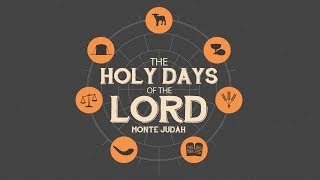
Mark Biltz of El Shaddai Ministries noted an interesting point that at this time of year, the constellation Aries "the ram", an adult male sheep, exists during the month of Passover, around the time of March-April.
This is an image of the constellation of Aries
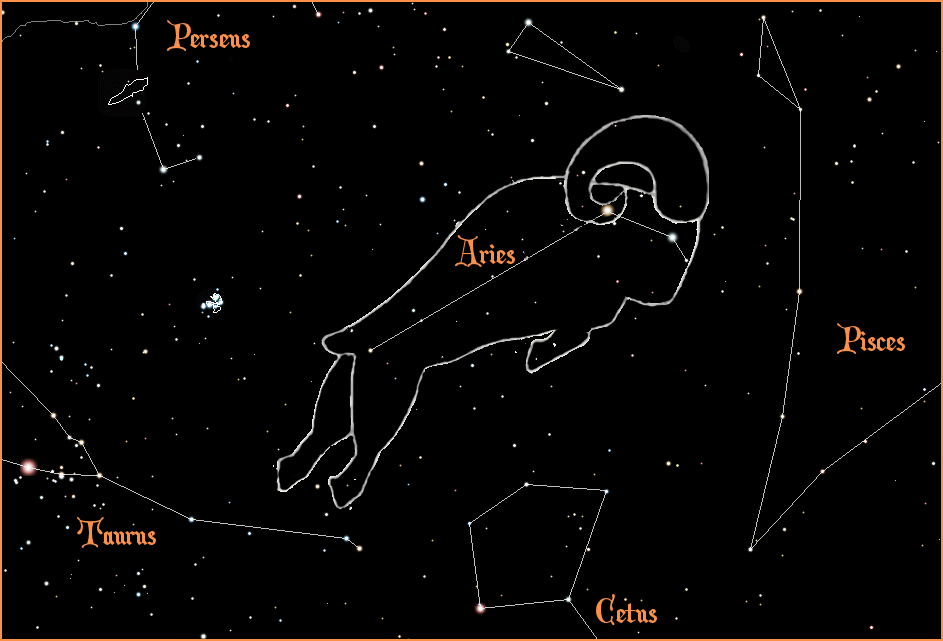
Indirectly related, the apostle Peter noted if someone asks us as believers about our testimony, which is noted in his epistle
1 Peter 3:13 And who is he that will harm you, if ye be followers of that which is good? 14 But and if ye suffer for righteousness' sake, happy are ye: and be not afraid of their terror, neither be troubled; 15 But sanctify the Adon hwhy in your hearts: and be ready always to give an answer to every man that asketh you a reason of the Hope that is in you with meekness and fear: 16 Having a good conscience; that, whereas they speak evil of you, as of evildoers, they may be ashamed that falsely accuse your good conversation in Messiah. 17 For it is better, if the will of Elohim be so, that ye suffer for well doing, than for evil doing.
Verse twenty nine
29 And was, in the middle (halfway) of the night, and hwhy struck every firstborn in the land of Egypt, from the firstborn of Pharaoh that sat upon his throne, unto the firstborn of the captive which was in the house of the bore-prison; and every firstborn of animals.
Notice it did not say that those who were the firstborn were in the pit hole to die earlier in the previous chapter of this week's Torah portion, but the female servants behind the mill stone
Exodus 11:5 And every firstborn in the land of Egypt shall die, from the firstborn of Pharaoh that is sitting upon his throne unto the firstborn of the female servant which is behind the millstones; and every firstborn of animals.
Why were not the female servants added in this week's current Torah portion passage, let alone, why were not the prisoners included in the earlier passage in the previous chapter of this week's Torah portion? I don't have an answer to that at this time.
Looking at the word MIDDLE (HALFWAY)
The Hebrew word for middle (halfway) is "khah-tsee"- Khet, Tsade, Yod (yux). It is from Strong's Concordance number 2677, and its definition
From H2673; the half or middle: - half, middle, mid [-night], midst, part, two parts.
from 2673 "khah-tsah" (hux), and its definition
A primitive root (compare H2686); to cut or split in two; to halve: - divide, X live out half, reach to the midst, part
from 2686 "khah-tsats" (Uux), and its definition
A primitive root (compare H2673); properly to chop into, pierce or sever; hence to curtail, to distribute (into ranks); as denominative from H2671; to shoot an arrow: - archer, X bands, cut off in the midst.
This is where we get our modern English word "cut" like "cut in half". This shows us that this account occurred half way in the night, and it would be probable that it could have happened at midnight.
King David noted of this plague, which is noted in the book of the Psalms
Psalm 105:36 He smote also all the firstborn in their land, the chief of all their strength.
Now, looking back to verse six of this week's Torah portion chapter
Exodus 12:6 And shall be for you to guard (keep, observe, heed) until the four ten (fourteen) day of (for) this renewed month: and all of the Assembly of the Congregation of Israel, they shall slaughter him between the mixing periods.
As I noted earlier, in the Hebrew text, it says "Beyn Ha-ah-rah-veem" (Mybreh Nyb). Ha'arvaeem can be translated as "evenings" and "mixings", or "mixing period". I will explain the two translations and show why one of the translations is the better definition.
One way of interpreting it is "between the evenings". If this was the interpretation, that would take the time line between sundown starting the fourteenth of Aviv/Nissan to sundown starting the fifteenth of Aviv/Nissan. This is too long a time for the Israelites to slay a lamb, or a kid, which is "a twenty four hour period", for if they waited until the daytime, it would have been too late to kill it, and the destroyer would killed whoever was the firstborn/s in the household during the "middle" of the night.
Another way to interpret this phrase is "between the mixing period" which would have occurred between sundown starting the fourteenth of Aviv/Nissan and sunrise on the fourteenth of Aviv/Nissan, or between dusk and dawn on the same Biblical day. In my opinion, this provides the best interpretation. It made the possibility of the Passover lamb being killed after midnight. It would not be common sense for the Israelites to kill it that late in the last hours before dawn, because that would be also too late. It makes sense that they would have accomplished the commandment before the middle of the night.
Looking at this chart, it shows the timeline of a typical day and night timeline including the dawn and dusk times
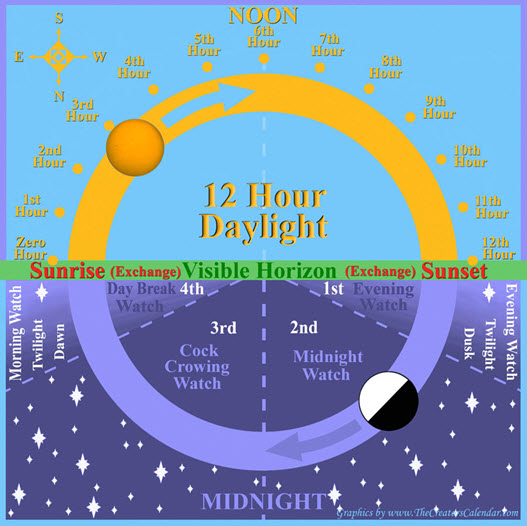
It would have made more sense that they would have killed the lamb/kid shortly after sunset on the night of the fourteenth, and later burn it in the morning on the same day, the time line when one in the agricultural life would get up to prepare to plow their fields.
For further study, you can read the information on my Passover/Unleavened Bread teaching on this website by clicking on the link below to get to the webpage.
PASSOVER/UNLEAVENED BREAD
Verses thirty through thirty two
30 And Pharaoh arose at night, he, and all his servants, and all of Egypt; and she was a great cry in Egypt; for was not a house which a dead one (a death) was not there. 31 And called for Moses and for Aaron at night, and said, Arise! and go out from the midst of my people, also you, also the Sons of Israel; And go, serve ta-hwhy according to [(as)] your word! 32 Take also your flocks, also your herds as the which you spoke, and go; And you bless me also!
In other words, Pharaoh gave in to hwhy through Moses' request. hwhy finished his series of plagues, so it wasn't necessary for hwhy to strengthen Pharaoh's heart again. But it will be for a little while before it happens again, which we will see in next week's Torah portion.
In verse thirty, it says "she" was a great cry. Based on this information, "she" pertains to the "soul of Egypt". The soul includes the emotions, and crying is an emotion and is part of the soul. One can say that the "soul" of Egypt was greatly crying for their loss of their firstborn.
Also, in verse thirty of this week's Torah portion passage, it shows that they only had enough time to make unleavened bread and no time to prepare food for a long journey. It's just as well they didn't, otherwise, they would have to prepare for a forty year journey, as we will see later in the Torah.
THE EGYPTIAN eLOHIM RELATING TO THE TENTH PLAGUE
The deities that could have been affiliated with this plague are "Anbius", that was mentioned in the ninth plague, "Min", god of fertility- where we also get "man" (makes sense to me), and "Amon-Ra", the ultimate Egyptian god. First, this is Wikipedia's information on Min:
"Min is an Ancient Egyptian god whose cult originated in predynastic times (4th millennium BCE). He was represented in many different forms, but was often represented in male human form, shown with an erect penis which he holds in his left hand and an upheld right arm holding a flail. As Khem or Min, he was the god of reproduction; as Khnum, he was the creator of all things, "the maker of gods and men".
These are the images referring to the deity Min
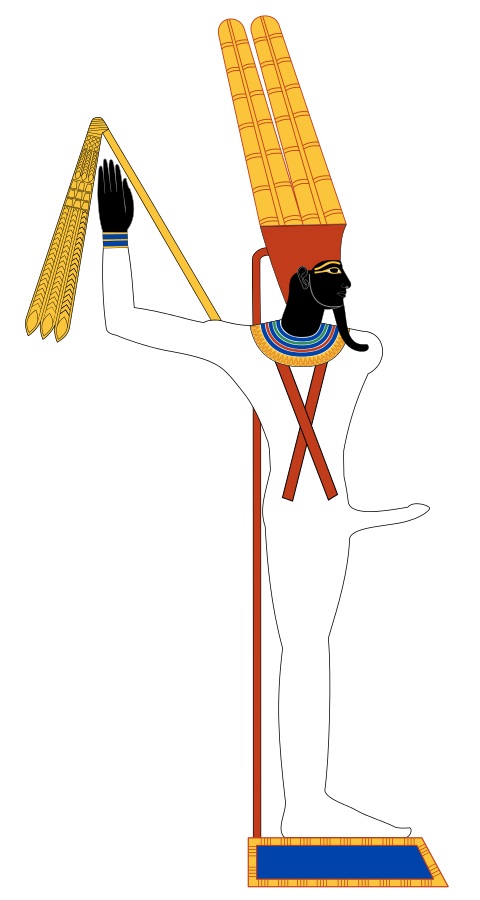
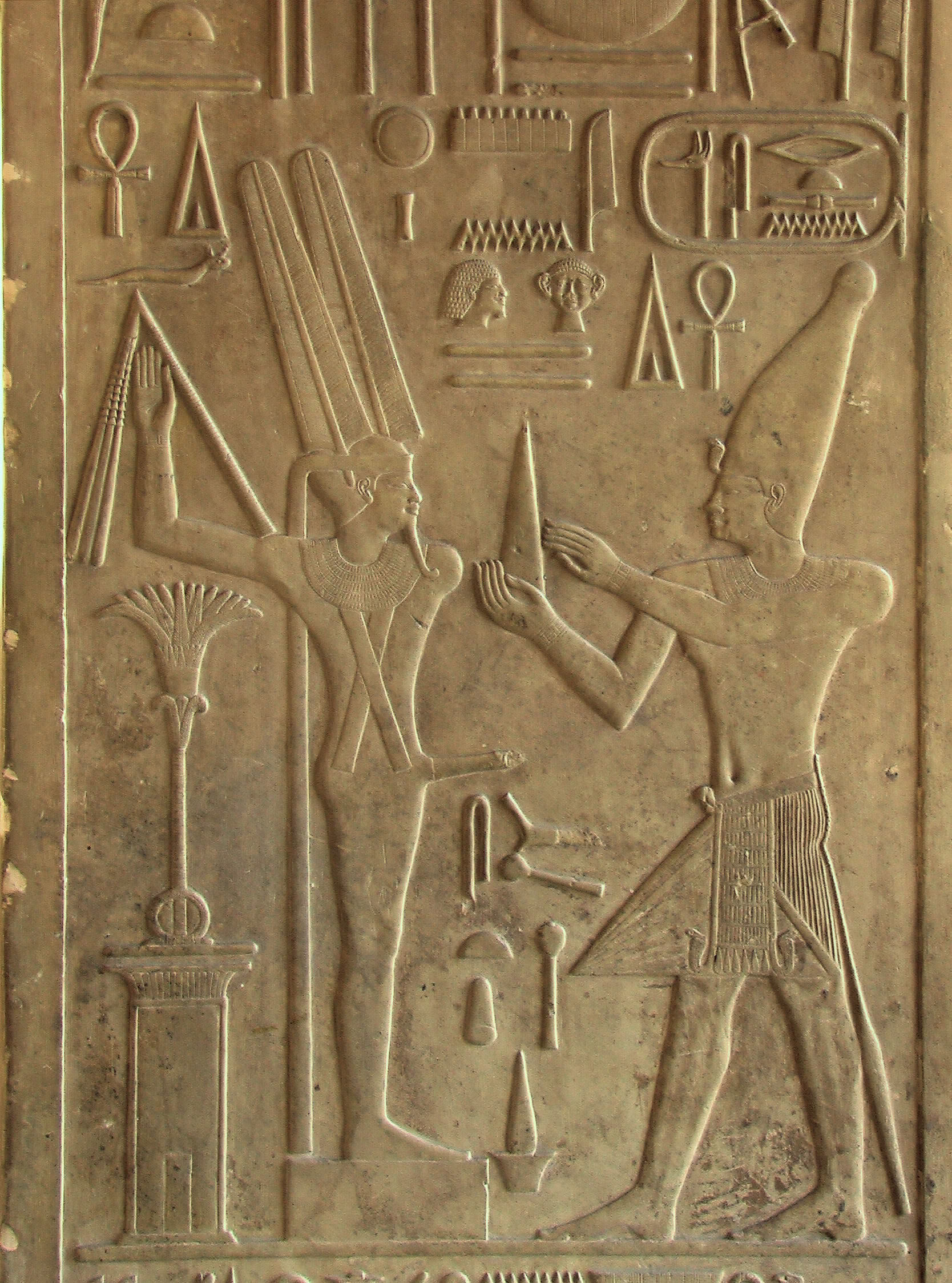
Looking at Amon-Ra, this information comes from the Magic Spell Casters Association of Egypt website. This is what it says regarding Amon-Ra:
Amun-Ra
"He is the ultimate god of entire ancient Egypt; many of the Egyptians considered him as the God of Kings and King of Gods! He is the oldest and the most worshipped ruler of ancient Egypt.
Amun Ra simply means: Hidden Light (Amun= Gidden and Ra= LightIn Egyptian mythology, Amun is the ram with extremely curved horns; ram signifies fertility, as symbolized by ram’s great proactive and fertile energy! Legend says that pharaohs always liked to call themselves as “beloved of Amun”, meaning that they were the real representatives of the god of fertility. As a pharaoh was the “Son of Ra”, it was natural to call the god Amun as the father of the Monarch. Amun was the god of the Thebal capital and as a result, he was so successful in attaining the status of the supreme god of the whole kingdom. The almighty god Amun personifies the Sun God and the Sun is the symbol of birth and energy".
The images are already portrayed from the ninth plague.Verses thirty three through thirty thirty six
33 And Egypt, she was strong upon the people to hasten to send them away from the land; for they said, All of us will be dead ones. 34 And the people lifted (bore, carried) ta-his dough before (not yet) becoming leavened, their kneading troughs were bound in their clothes upon their shoulders. 35 And the Sons of Israel, they did according to [(as)] the word of Moses; and they asked from Egypt vessels of silver, and vessels of gold, and clothing: 36 And hwhy gave the People ta-grace (favor) in the eyes of ta-Egypt, and was asked of them, and they plundered ta-Egypt.
hwhy allowed the Egyptians to suffer, so that He would fulfill His Will to make them give away their silver, their gold and their clothes as mentioned in verse thirty six of this week's Torah portion passage. Egypt was so afraid of hwhy, that they feared if there were more plagues, it would result in all of their deaths.
In verse thirty four of this week's Torah portion passage, it mentions "his dough", and notice that the dough was not given time to leaven, meaning that it was "unleavened dough". The "his" is symbolic of "He", Yeshua, who is "the Unleavened Dough". Also in this verse, they carried their kneading troughs in their clothes and carried them upon their shoulders. The kneading troughs are symbolic of "the crosses". The Israelites were symbolically denying themselves taking up their crosses and following hwhy through the leadership of Moses. Yeshua noted this for us who are in Messiah today, which is noted in the Gospel of Matthew
Matthew 16:24 Then said Yeshua unto His disciples, If any man will come after Me, let him deny himself, and take up his cross, and follow Me.
In verse thirty five in this week's Torah portion passage, the Israelites plundered the Egyptians' gold, silver and clothes, items of provision for their future provisions and for the upcoming Tabernacle to be built in the wilderness.
Indirectly related, there was an account where Yeshua's parents received provisions, which is noted in the Gospel of Matthew
Matthew 2:9 When they had heard the king, they departed; and, lo, the Star, which they saw in the east, went before them, till it came and stood over where the Young Child was. 10 When they saw the Star, they rejoiced with exceeding great joy. 11 And when they were come into the house, they saw the Young Child with Mary, His mother, and fell down, and worshipped Him: and when they had opened their treasures, they presented unto Him gifts; gold, and frankincense, and myrrh. 12 And being warned of hwhy in a dream that they should not return to Herod, they departed into their own country another way. 13 And when they were departed, behold, the Messenger of hwhy appeareth to Joseph in a dream, saying, Arise, and take the Young Child and His mother, and flee into Egypt, and be thou there until I bring thee word: for Herod will seek the Young Child to destroy Him. 14 When he arose, he took the Young Child and His mother by night, and departed into Egypt: 15 And was there until the death of Herod: that it might be fulfilled which was spoken of hwhy by the prophet, saying, Out of Egypt have I called my son.
The magi brought to Joseph's family gold, frankincense and myrrh as provisions to escape and dwell in Egypt until the death of Herod.
King David noted this Torah portion account of the Israelites taking the gold and silver, which is noted in the book of the Psalms
Psalms 105:37 He brought them forth also with silver and gold: and there was not one feeble person among their tribes.
Verses thirty seven and thirty eight
37 And the Sons of Israel, they journeyed (pulled up) from Rameses to Succoth according to [(as)] six hundred thousand mighty men of foot, by apart from the little ones. 38 And also a mixed multitude ascended with them; and flocks, and herds, much heavy livestock.
As noted in the Torah portion of Va-Eyra, in the book of Exodus, to Pharaoh, Ra-m'seys means "Ra is Drawn Out", but to the Israelites, it means " Rah is an Evil Waste". Succoth, as most people know, means "booths". One can say that the Israelites, through hwhy, was drawn out from an evil waste to dwell in booths. This is also a type and shadow of us in Messsiah who are spiritually drawn out to enter into being spiritual booths for Yeshua as His vessels. This could also imply that it is connected to Yeshua's Parable of the Virgins in the Gospel of Matthew, in chapter twenty five, when the Bridegroom, who is Yeshua, will come for His Bride, the believers from the symbolic Rameses of the world to enter into the Bridegroom's House, which in my opinion will occur on the Fall harvest's Biblical Fall High Holy Day of the Feast of Sukkoth.
In verse thirty eight of this week's Torah portion passage, it says "a mixed multitude", which in the Hebrew text is "eh-rehv rahv" (br bre), Bill Cloud of Shoreshim Ministries noted that it means peoples of different nations that were present with them, including some Egyptians, Cushites (Ethiopians), Nubians, and probably some Canaanites that were enslaved at one time, and other ethnicities.
Verse thirty nine
39 And they baked ta-the dough which they brought out from Egypt of unleavened round cakes, for was not leavened; For they were driven out from Egypt, and and they were not able to delay (tarry, linger) her, and also they did not do (make, prepare) for themselves provision (victuals, game food).
40 And the dwelling of the Sons of Israel, which they dwelled in Egypt was thirty years and four hundred years. 41 And was from the end of thirty years and four hundred years, and was in this same day, all of the armies of hwhy, they went out from the land of Egypt. 42 He was a Night of Observation (Keeping, Guarding, Watching) to hwhy for bringing them out from the land of Egypt: he is this night to hwhy an Observance (Keeping, Guarding, Heeding) for all of the Sons of Israel for their generations.
43 And hwhy said to Moses and Aaron, This is the Statute of the Passover: Every son of a foreigner shall not eat on him: 44 And every servant of a man purchased (bought) of silver, and you shall circumcise him, then shall eat on him. 45 A dweller (foreign dweller) and a hired servant shall not eat on him. 46 Shall be eaten in one house; you shall not go out from the flesh from the house to the outside; and you shall not shever-break a bone on him. 47 All of the Congregation of Israel, they shall do (make, prepare) him. 48 And when a sojourns (stranger) shall sojourn with you, and shall do the Passover to hwhy, every remembered one (male) to him shall be circumcised, and then shall come near to do (make, prepare) him; and shall be like the native of the land: and anyone uncircumcised shall not eat on him. 49 One Teaching (Torah) shall be to the native and to the sojourner (stranger) that sojourns in your midst. 50 And all of the Sons of Israel, they did as the which hwhy commanded ta-Moses and ta-Aaron, so they did. 51 And was on this same day that hwhy brought out ta-the Sons of Israel from the land of Egypt, upon their armies.
Verses thirty four and thirty nine reveal two different phrases:
34 And the people lifted (bore, carried) ta-his dough before (not yet) becoming leavened,...
39 And they baked ta-the dough which they brought out from Egypt...
The Aleph-Tavs next to the words "his dough" and "the dough" were hints, especially the phrase "his dough", in which "his" is the correct Hebrew pronoun, and these two verses refer to Yeshua, "the Unlevened Dough".
Notice it says in this week's Torah portion passage that they could not delay "her", meaning the dough. In other words, the dough is symbolic of a soul. This would be a type and shadow of Yeshua's Soul not delaying to do His Heavenly Father's Will, otherwise if Yeshua "delayed" to do His Father's Will, Yeshua's "Soul" would start turning to sourdough and ferment and begin to leaven, becoming "leavened bread". I will reveal this shortly.
This is the same application in our lives as believers who believe in Yeshua in which that we must not delay to do our Heavenly Fathers' Will, otherwise, if we delay to do His Will, the leavening of "sin" will begin to form in our own dough of our souls. An example of this is noted in the Torah portion of Ki They-tsey, in the book of Deuteronomy
Deuteronomy 23:21 When you vow a vow to hwhy, your Elohim, you shall not delay (procrastinate) to repay (recompense, restitute) him: for requiring, hwhy, your Elohim, shall require from with you; and shall be sin against you.
Based on verses thirty seven through thirty nine of this week's Torah portion chapter, it is possible that the Israelites baked the bread at Succoth, after they arrived there and settled, which would have given them enough time to do it before the bread started to ferment. This would be a type and shadow of the fulfillment of Yeshua manifesting Himself (an act of the unleavened bread being baked) to take us as the Bride to Himself, the Bridegroom, in the Fall harvest on the Fall High Holy day of the Feast of Sukkoth.
Notice that there is also a hint of Sukkoth. This is not the first time this has occurred. It had occurred during the time of Abraham in an account when the three men stopped by, which was calculated to be in the time of Sukkoth, but when they went to Sodom to get Lot and his family out of the city to be delivered from the city's destruction, it had harmonic overtones of Passover.
Looking at the word ROUND CAKES
The Hebrew word for round cakes is "oog-gah"- Ayin, Gimel, Heh (hge). It is from Strong's Concordance number 5692, and its definition
From H5746; an ashcake (as round): - cake (upon the hearth).
from 5746"oog" (gwe), and its definition
A primitive root; properly to gyrate; but used only as denominative from H5692, to bake (round cakes on the hearth): - bake.
This is same Hebrew root word that was applied to Og, king of the Bashan.
Number 21:33 And they faced away and they ascended the way of the Bashan: and came out Og (gwe), King of the Bashan, to encounter (meet) them, he and all of his people, to the war at Edrei.
Looking at the word OG
The Hebrew word for Og is "ohg"- Ayin, Vav, Gimel (hge). It is from Strong's Concordance number 5692, and its definition
Probably from H5746; round; Og, a king of Bashan: - Og.
from 5746"oog" (gwe), and its definition
A primitive root; properly to gyrate; but used only as denominative from H5692, to bake (round cakes on the hearth): - bake.
The reason for Og's name, because he was most likely a "round" man.
Verses forty and forty-one
40 And the dwelling of the Sons of Israel, which they dwelled in Egypt was thirty years and four hundred years. 41 And was from the end of thirty years and four hundred years, and was in this same day, all of the armies of hwhy, they went out from the land of Egypt.
The Israelites sojourned for four hundred and thirty years. It also said they left "even the selfsame day", and we can find out the exact day the Israelites left Ramesses, which is noted in the Torah portion of Masei, in the book of Numbers
Numbers 33:3 And they pulled up (journeyed) from Rameses in the first renewed month, on the five ten (fiveteen, fifteen) day of the first renewed month; after the Passover, the Sons of Israel, they went out on a high (raised) hand to the eyes of all of the Egyptians.
This occurred at night time, which is noted in the Torah portion of R'ey, in the book of Deuteronomy
Deuteronomy 16:1 Guard (Keep, Observe Heed) the renewed month of the Aviv, and you shall do (make) the Passover to hwhy, your Elohim: for in ta-the renewed month of the Aviv, hwhy, your Elohim, brought you out from Egypt at night.
That means they went out when hwhy led as a Pillar of Fire. That means that the Egyptians who were present during the Israelites' departure witnessed the Pillar of Fire at night.
There is a question to when the sojourning began. Looking at what hwhy said to Abraham, which is noted in the Torah portion of Lekh L'kha, in the book of Genesis
Genesis 15:13 And said to Abram, Knowing, you shall know for your seed shall be a sojourner (stranger) in a land not belonging to them, and shall serve them; and they shall afflict them four hundred years; 14 And also ta-the nation, which they shall serve will I judge: and after thus, shall they come out among a great substance (goods, property).
As it was mentioned in the Torah portion of Va-Eyra, in the book of Exodus, the Israelites did not literally dwell in Egypt for 430 years based on the calculations that were made between the generations from Levi to Moses' parents. Here are slides showing my notes that argue the premise
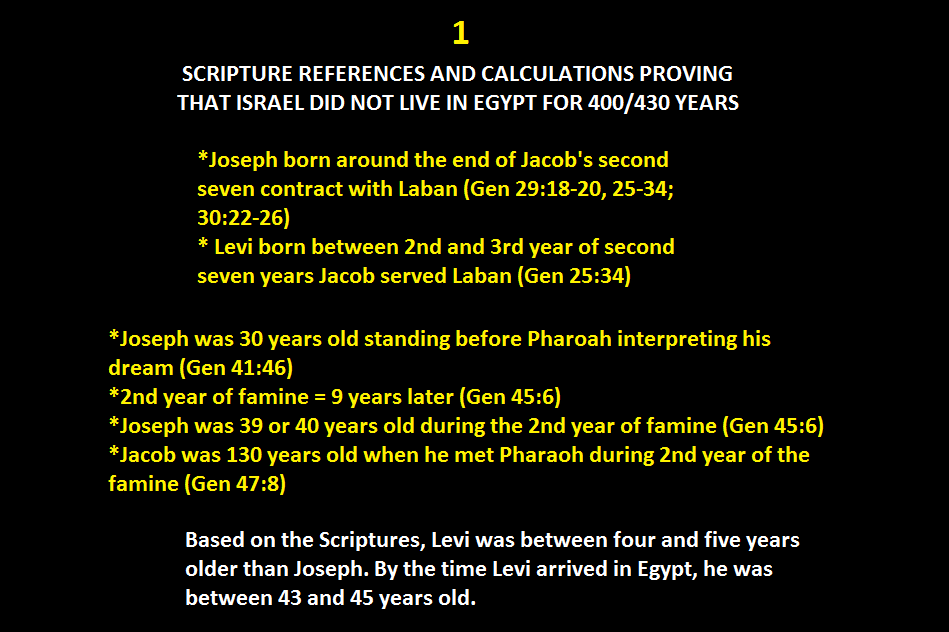
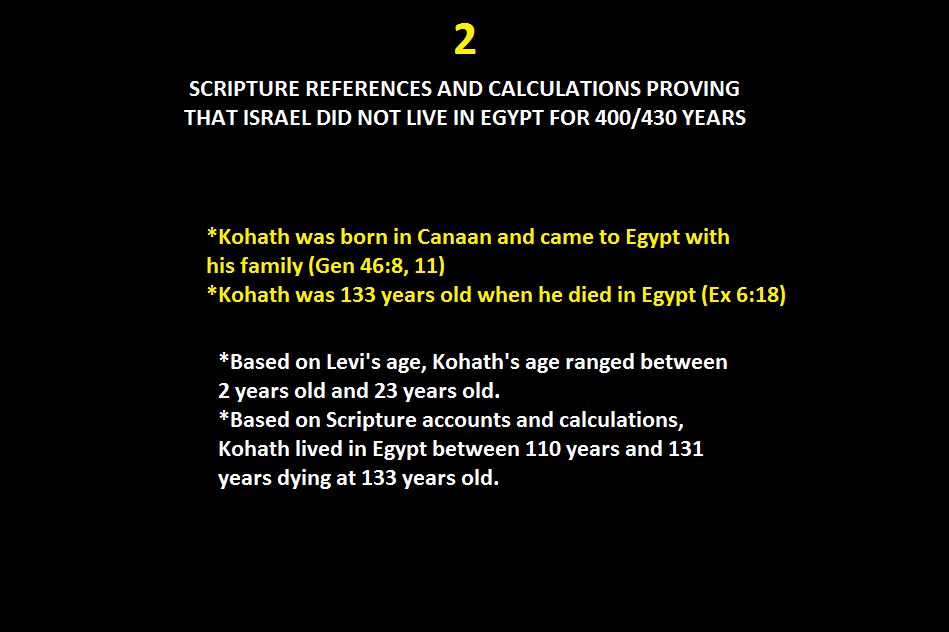
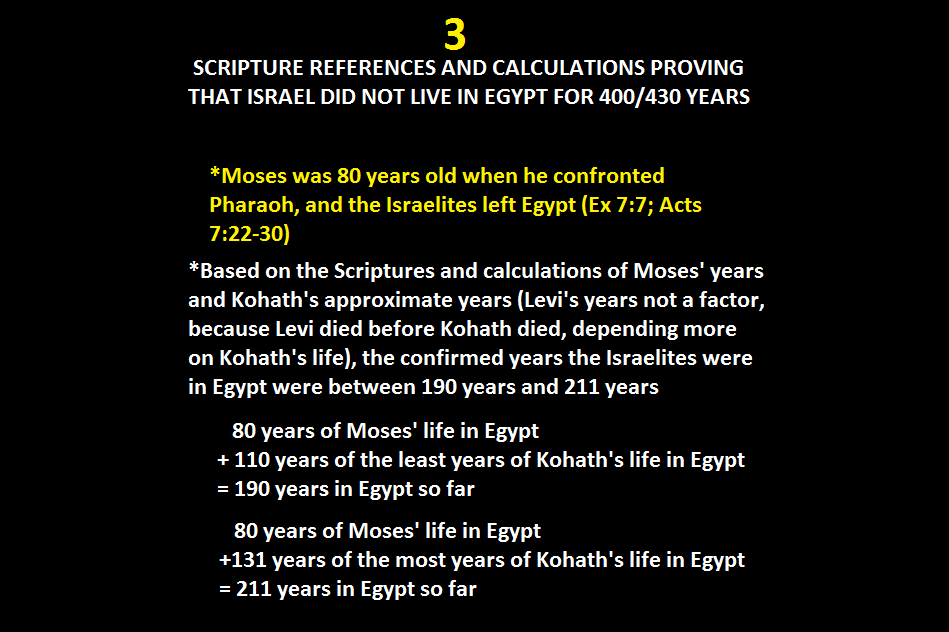
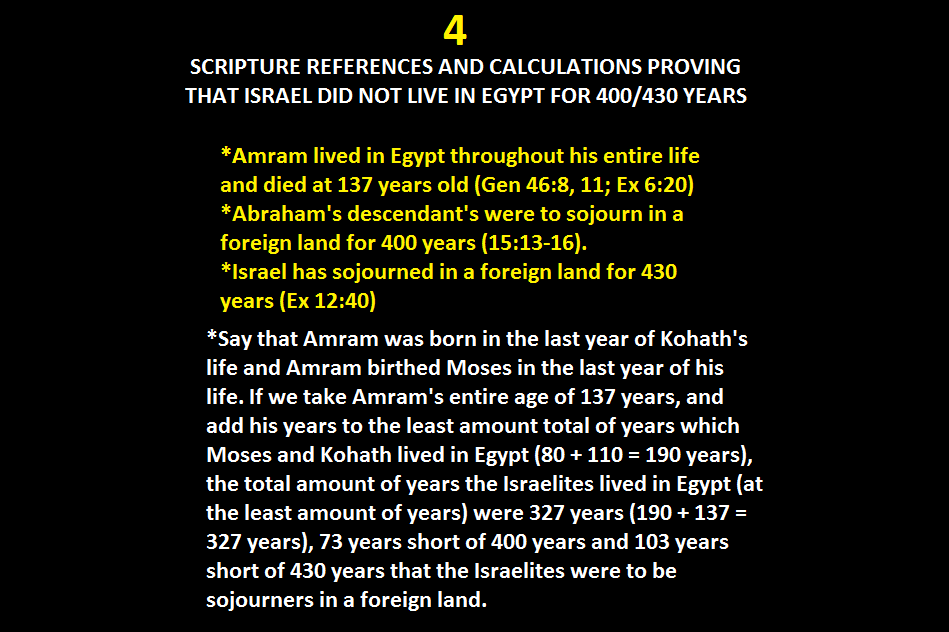
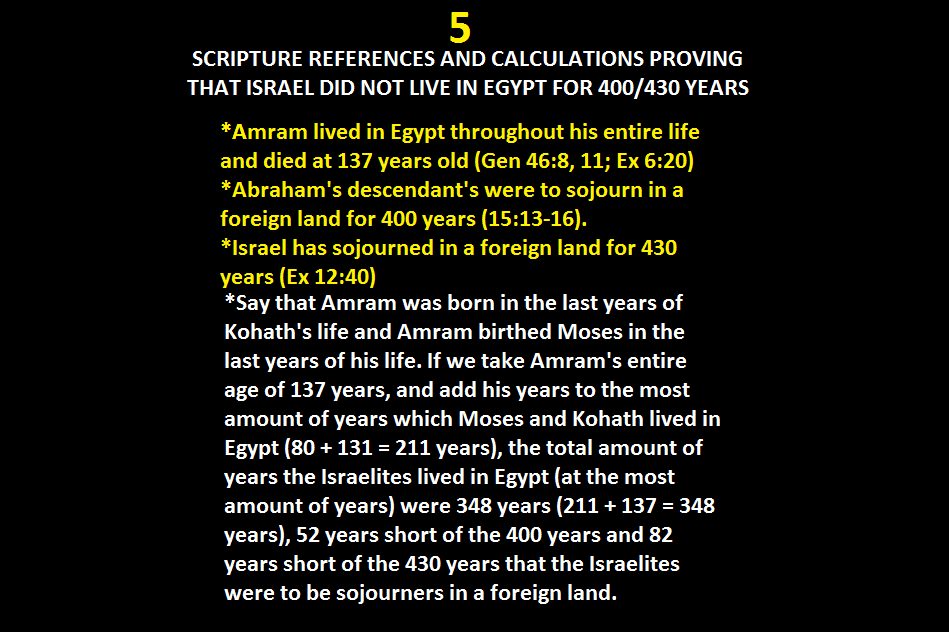
So far based on my calculations, it is possible that it started with Abraham's son, Isaac, but I am still searching and calculating.
This is a chart revealing the year of mankind and the age of Moses' siblings when Moses was eighty years old
| YEAR OF MAN WHEN MOSES WAS 80 YEARS OLD | NAME OF MOSES' RELATIVES | AGE OF MOSES' RELATIVES WHEN MOSES WAS 80 YEARS OLD | AGE OF DEATH OF MOSES' RELATIVES |
| 2454 YEARS OF MANKIND | Miriam | about 86 or 87 years old | about 126 or 127 years old |
| 2454 YEARS OF MANKIND | Levi | about 83 years old | about 123 years old |
Based on past calculations, if the time line is correct, this would take us to about 1546 BC.
By the time that Moses was eighty years old, according to Wikipedia, based on the time line, the Pharaoh who ruled in Egypt was Apepi who ruled from 1575-1540 BC of the Fifteenth Dynasty, in the Second Intermediate Period.
This is what Wikipedia says regarding Apepi:
"Apepi (also Ipepi; Egyptian language ipp(i)) or Apophis (Greek: Ἄποφις; regnal names Neb-khepesh-Re, A-qenen-Re and A-user-Re) was a ruler of Lower Egypt during the fifteenth dynasty and the end of the Second Intermediate Period that was dominated by this foreign dynasty of rulers called the Hyksos. According to the Turin Canon of Kings, he ruled over the northern portion of Egypt for forty years. He ruled during the early half of the 16th century BC and outlived his southern rival, Kamose, but not Ahmose I.[3] Although his reign only entailed northern Egypt, Apepi was dominant over most of Egypt during the early portion of his reign, and traded peacefully with the native Theban Seventeenth dynasty to the south".
This is the only image referring to Apepi
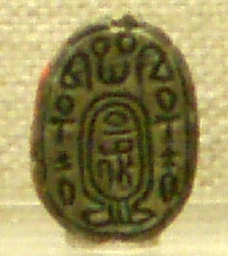
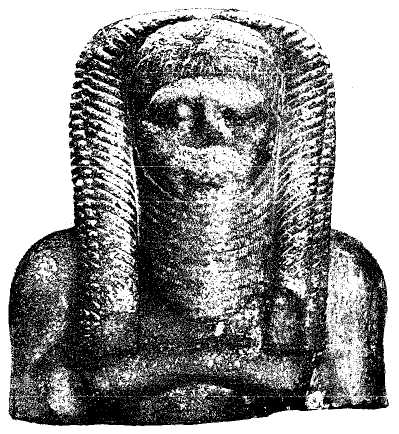
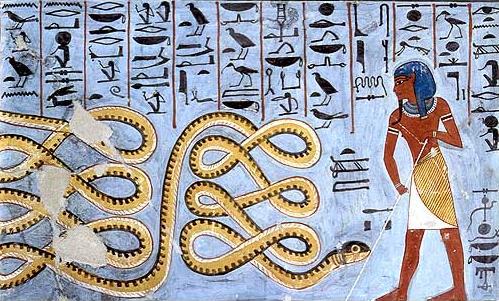

Apepi was the second to the last Pharaoh who reigned in the Fifteenth Dynasty. According to WIkipedia, the last Pharaoh who ruled in the Seventeenth dynasty was Khamudi who possibly reigned from 1541-1540 BC.
This is what Wikipedia says regarding Khamudi:
"Khamudi (also known as Khamudy) was the last Hyksos ruler of the Fifteenth Dynasty of Egypt. Khamudi came to power in 1534 BC or 1541 BC, ruling the northern portion of Egypt from his capital Avaris. His ultimate defeat at the hands of Ahmose I, after a short reign, marks the end of the Second Intermediate Period".
These are the only images referring to Khamudi
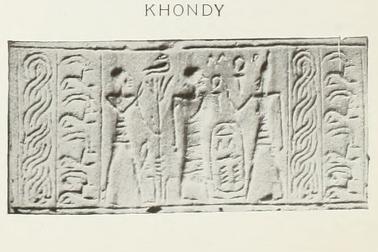
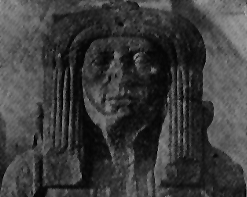
Another Pharaoh who reigned near this time was Wadjkheperre Kamose who reigned from 1554-1549 BC of the Seventeenth Dynasty, in the Second Intermediate Period.
This is what Wikipedia says regarding Wadjkheperre Kamose:
"Kamose was the last king of the Theban Seventeenth Dynasty. He was possibly the son of Seqenenre Tao and Ahhotep I and the full brother of Ahmose I, founder of the Eighteenth Dynasty. His reign fell at the very end of the Second Intermediate Period. Kamose is usually ascribed a reign of three years (his highest attested regnal year), although some scholars now favor giving him a longer reign of approximately five years.
His reign is important for the decisive military initiatives he took against the Hyksos, who had come to rule much of Ancient Egypt. His father had begun the initiatives and, quite possibly, lost his life in battle with the Hyksos. It is thought that his mother, as regent, continued the campaigns after the death of Kamose and that his full brother made the final conquest of them and united all of Egypt".
These are the only images referring to Wadjkheperre Kamose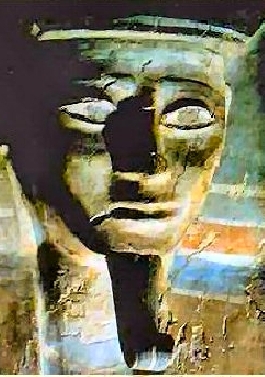
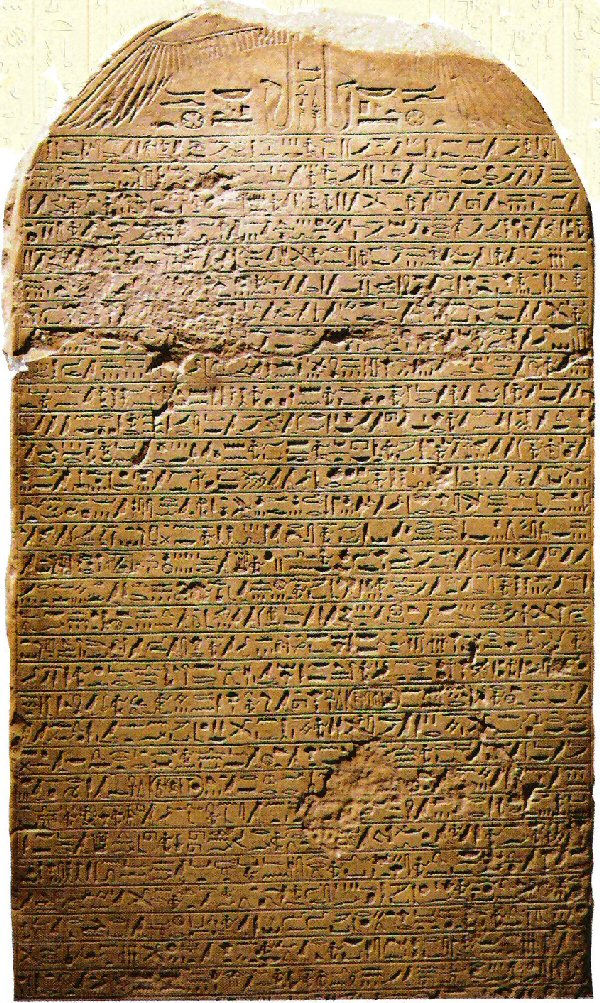
After the end of these dynasties, Ahmose I, who reigned from 1550/49-1525/24 BC was the first Pharaoh of the Eighteenth Dynasty to begin the New Kingdom Period. This would fit the time period when a major dynasty falls apart that a new dynasty of Pharaohs would take advantage of the weaker Pharaohs of a current dynasty, and take over the entire nation of Egypt, and unite the Egyptian empire.
It could be probable that it was Apeppi who was the Pharaoh of the Exodus whom Moses confronted.
!!!hwhy Kl dbk
Verse forty two
42 He was a Night of Observation (Keeping, Guarding, Heeding) to hwhy for bringing them out from the land of Egypt: he is this night to hwhy an Observance (Keeping, Guarding, Heeding) for all of the Sons of Israel for their generations.
43 And hwhy said to Moses and Aaron, This is the Statute of the Passover: Every son of a foreigner shall not eat on him: 44 And every servant of a man purchased (bought) of silver, and you shall circumcise him, then shall eat on him. 45 A dweller (foreign dweller) and a hired servant shall not eat on him. 46 Shall be eaten in one house; you shall not go out from the flesh from the house to the outside; and you shall not shever-break a bone on him. 47 All of the Congregation of Israel, they shall do (make, prepare) him. 48 And when a sojourns (stranger) shall sojourn with you, and shall do the Passover to hwhy, every remembered one (male) to him shall be circumcised, and then shall come near to do (make, prepare) him; and shall be like the native of the land: and anyone uncircumcised shall not eat on him. 49 One Teaching (Torah) shall be to the native and to the sojourner (stranger) that sojourns in your midst. 50 And all of the Sons of Israel, they did as the which hwhy commanded ta-Moses and ta-Aaron, so they did. 51 And was on this same day that hwhy brought out ta-the Sons of Israel from the land of Egypt, upon their armies.
This is how KJV version translates this verse:
Exodus 12:42 (KJV) It is a night to be much observed unto the LORD for bringing them out from the land of Egypt: this is that night of the LORD to be observed of all the children of Israel in their generations.
The problem is, that two of these words "It" and "this" is from the Hebrew text word "hoo"- Heh, Vav, Aleph (awh), and it is properly translated almost all the time as "he", or "him".
Also, this week's Torah portion verse is a multiple phrase of the same statement like Adam and Khavah, and Moses when stated three different ways, which is noted in the Torah portion of B'reyshith, in the book of Genesis, and in the Torah portion of Va-Eyra, in the book of Exodus.
Genesis 1:27 And Elohim created ta-the Adam in His Image, created him in the Image of Elohim, created them a remembered one (male) and a perforated one (punctured one, female).
Exodus 6:26 He was Aaron and Moses which hwhy said to them, Bring out ta-the Sons of Israel from the land of Egypt upon their armies. 27 These were the ones speaking to Pharaoh, King of Egypt, to bring out ta-the Sons of Israel from Egypt: He was Moses and Aaron.
In this week's Torah portion passage's case, it was only stated in two different ways.
These next few verses reveal the kinds of people in relation to the Feast of the Passover.
Verse forty three
ONE: A FOREIGNER
43 And hwhy said to Moses and Aaron, This is the Statute of the Passover: Every son of a foreigner shall not eat on him:
The first type of person mentioned is the Foreigner
Looking at the word FOREIGNER
The Hebrew word for foreigner is "ney-khahr"- Nun, kaph, Resh (rkn). It is from Strong's Concordance number 5236, and its definition
From H5234; foreign, or (concretely) a foreigner, or (abstractly) heathendom: - alien, strange (+ -er).
from 5234 "nah-khahr" (rkn), and its definition
A primitive root; properly to scrutinize, that is, look intently at; hence (with recognition implied), to acknowledge, be acquainted with, care for, respect, revere, or (with suspicion implied), to disregard, ignore, be strange toward, reject, resign, dissimulate (as if ignorant or disowning): - acknowledge, X could, deliver, discern, dissemble, estrange, feign self to be another, know, take knowledge (notice), perceive, regard, (have) respect, behave (make) self strange (-ly).
In this case, a foreigner is one that does not want to "assimilate" with the Israelites. That means it is anyone that does not want to be circumcised, at minimum, as well as being "grafted in" to hwhy's People. Does this sound like an issue that is going on the United States today?
Indirectly related, the apostle Paul noted the issue of grating in, which is noted in his letter to the assembly in Rome
Romans 11:1 I say then, Hath hwhy cast away His People? Let it not be. For I also am an Israelite, of the seed of Abraham, of the tribe of Benjamin. 2 hwhy hath not cast away His People which He foreknew. Wot ye not what the scripture saith of Elias? How he maketh intercession to hwhy against Israel, saying, 3 Adonai, they have killed Thy prophets, and digged down Thine Altars; and I am left alone, and they seek my life. 4 But what saith the answer of hwhy unto him? I have reserved to myself seven thousand men, who have not bowed the knee to the image of Baal. 5 Even so then at this present time also there is a remnant according to the election of grace. 6 And if by grace, then is it no more of works: otherwise grace is no more grace. But if it be of works, then is it no more grace: otherwise work is no more work. 7 What then? Israel hath not obtained that which he seeketh for; but the election hath obtained it, and the rest were blinded 8 (According as it is written, hwhy hath given them the spirit of slumber, eyes that they should not see, and ears that they should not hear;) unto this day. 9 And David saith, Let their table be made a snare, and a trap, and a stumblingblock, and a recompence unto them: 10 Let their eyes be darkened, that they may not see, and bow down their back alway. 11 I say then, Have they stumbled that they should fall? Let it not be: but rather through their fall salvation is come unto the Gentiles, for to provoke them to jealousy. 12 Now if the fall of them be the riches of the world, and the diminishing of them the riches of the Gentiles; how much more their fulness? 13 For I speak to you Gentiles, inasmuch as I am the apostle of the Gentiles, I magnify mine office: 14 If by any means I may provoke to emulation them which are my flesh, and might save some of them. 15 For if the casting away of them be the reconciling of the world, what shall the receiving of them be, but life from the dead? 16 For if the firstfruit be Holy, the lump is also Holy: and if the root be Holy, so are the branches. 17 And if some of the branches be broken off, and thou, being a wild olive tree, wert graffed in among them, and with them partakest of the root and fatness of the olive tree; 18 Boast not against the branches. But if thou boast, thou bearest not the root, but the root thee. 19 Thou wilt say then, The branches were broken off, that I might be graffed in. 20 Well; because of unbelief they were broken off, and thou standest by faith. Be not highminded, but fear: 21 For if hwhy spared not the natural branches, take heed lest he also spare not thee. 22 Behold therefore the goodness and severity of hwhy: on them which fell, severity; but toward thee, goodness, if thou continue in his goodness: otherwise thou also shalt be cut off. 23 And they also, if they abide not still in unbelief, shall be graffed in: for hwhy is able to graff them in again. 24 For if thou wert cut out of the olive tree which is wild by nature, and wert graffed contrary to nature into a good olive tree: how much more shall these, which be the natural branches, be graffed into their own olive tree? 25 For I would not, brethren, that ye should be ignorant of this mystery, lest ye should be wise in your own conceits; that blindness in part is happened to Israel, until the fulness of the Gentiles be come in. 26 And so all Israel shall be saved: as it is written, There shall come out of Sion the Deliverer, and shall turn away ungodliness from Jacob: 27 For this is My Covenant unto them, when I shall take away their sins.
We as believers in Messiah are also grafted in to the Israelite branch, so that we can honor our Heavenly Father's High Holy Days, including Passover and the seven days Feast of Unleavened Bread.
Indirectly related, in relation to assimilation, the world today has been strongly against Israel, Yeshua and His believers and don't want to assimilate with them, because they have been deceived. Perry Stone of Voice of Evangelism Ministries noted this scripture from the apostle Paul, which is noted in his letter to the assembly in Thessalonica
2 Thessalonians 2:8 And then shall that Wicked be revealed, whom the Lord shall consume with the spirit of His Mouth, and shall destroy with the brightness of His coming: 9 Even him, whose coming is after the working of Satan with all power and signs and lying wonders, 10 And with all deceivableness of unrighteousness in them that perish; because they received not the Love of the Truth, that they might be saved. 11 And for this cause hwhy shall send them strong deception, that they should believe a lie: 12 That they all might be damned who believed not the Truth, but had pleasure in unrighteousness.
Verse forty four
TWO: ONE PURCHASED OF SILVER AND CIRCUMCISED
44 And every servant of a man purchased (bought) of silver, and you shall circumcise him, then shall eat on him.
The second type of person mentioned is one purchased of silver and is circumcised.
This could be based on the Commandment regarding Abraham, his sons and his servants, which is noted in the Torah portion of Lekh L'kha, in the book of Genesis
Genesis 17:7 And I will establish ta-My Covenant between Me and between you, and between your seed after you for their generations for a Covenant of Ages (Everlasting), to be to you for Elohim, and to your seed after you. 8 And I will give to you and to your seed after you ta the land of your sojourning, ta all the land of Canaan, for an Inhertance of Ages (Everlasting); and I will be to them for Elohim.
9 And Elohim said to Abraham, And you, you shall guard (watch, observe, keep) ta-My Covenant, you, and your seed after you to their generations. 10 This is My Covenant which you shall guard (watch, observe, keep) between Me, and between you, and between your seed after you; Circumcise to you every remembered one (male). 11 And you shall circumcise ta-the flesh of your foreskins; and shall be for a Sign (Token) of the Covenant between Me and between you. 12 And a son of eight days shall be circumcised to you of every remembered one (male) to your generations birthed of the house and bought (purchased) of silver from any son of a foreigner of which he is not of your seed. 13 That circumcising, shall be circumcised a birthed one (lad) at your house and a bought one (purchased one) of your silver: and My Covenant, she shall be in your flesh for a Covenant of Ages (Everlasting). 14 And an uncircumcised remembered one (male) which has not circumcised ta-the flesh of his foreskin, and shall cut her off that soul from her People; has violated (disannuled, dissolved) ta-My Covenant.
Silver is also symbolic of redemption. Yeshua redeemed us from eternal death, and we have came into His Covenant through His Blood.
Looking at the word PURCHASED (BOUGHT)
The Hebrew word for purchased (bought) is "meek-nah"- Mem, Kuph, Nun, Heh (hnqm). It is from Strong's Concordance number 4736, and its definition
Feminine of H4735; properly a buying, that is, acquisition; concretely a piece of property (land or living); also the sum paid: - (he that is) bought, possession, piece, purchase.
from 4735 "meek-neh" (hnqm), and its definition
From H7069; something bought, that is, property, but only live stock; abstractly acquisition: - cattle, flock, herd, possession, purchase, substance.
from 7069 "kah-nah" (hnq), and its definition
A primitive root; to erect, that is, create; by extension to procure, especially by purchase (causatively sell); by implication to own: - attain, buy (-er), teach to keep cattle, get, provoke to jealousy, possess (-or), purchase, recover, redeem, X surely, X verily.
Notice that this Hebrew word is the same word for livestock, which would include purchased animals.
If a person was purchased of silver, but wasn't circumcised, cannot partake of the Passover. The person had to be both purchased of silver and circumcised.
Indirectly related, Yeshua bought us through the price of His Life by His Blood, which the apostle Paul noted in his letter to the assembly in Corinth
1 Corinthians 6:19 What? know ye not that your body is the Temple of the Holy Spirit which is in you, which ye have of the Lord, and ye are not your own? 20 For ye are bought with a price: therefore glorify the Lord in your body, and in your spirit, which are the Lord's.
1 Corinthians 7:21 Art thou called being a servant? Care not for it: but if thou mayest be made free, use it rather. 22 For he that is called in the Lord, being a servant, is the Lord's freeman: likewise also he that is called, being free, is Messiah's servant. 23 Ye are bought with a price; be not ye the servants of men. 24 Brethren, let every man, wherein he is called, therein abide with the Lord.
Verse forty five
THREE: A DWELLER
45 A dweller (foreign dweller) and a hired servant shall not eat on him.
The third type of person mentioned is a dweller.
Looking at the word DWELLER (FOREIGN DWELLER)
The Hebrew word dweller (foreign dweller) is "toh-shahv"- Tav, Vav, Shin, Bet (bswt). It is from Strong's Concordance number 8453, and its definition
(The second form used in Kings Num_17:1); from H3427; a dweller (but not outlandish, H5237); especially (as distinguished from a native citizen (active participle of H3427) and a temporary inmate, H1616, or mere lodger, H3885) resident alien: - foreigner-inhabitant, sojourner, stranger.
from 3427 "yah-shahv" (bsy), and its definition
A primitive root; properly to sit down (specifically as judge, in ambush, in quiet); by implication to dwell, to remain; causatively to settle, to marry: - (make to) abide (-ing), continue, (cause to, make to) dwell (-ing), ease self, endure, establish, X fail, habitation, haunt, (make to) inhabit (-ant), make to keep [house], lurking, X marry (-ing), (bring again to) place, remain, return, seat, set (-tle), (down-) sit (-down, still, -ting down, -ting [place] -uate), take, tarry.
In the case of Passover, the meaning of a dweller is one that just exists, that dwells with no purpose but a temporary place to rest.
FOUR: A HIRED SERVANT
The fourth type of person mentioned is the hired servant.
Looking at the word HIRED SERVANT
The Hebrew word for hired servant is "sah-kheer"- Shin, Kaph, Yod, Resh (ryks). It is from Strong's Concordance number 7916, and its definition
From H7936; a man at wages by the day or year: - hired (man, servant), hireling.
from 7936 "sah-khahr" (rks or rko), and its definition
The second form by permutation and used in Ezr_4:5; a primitive root (apparently akin (by prosthesis) to H3739 through the idea of temporary purchase; compare H7937); to hire: - earn wages, hire (out self), reward, X surely.
from 3739 "kah-rah" (hrk), and its definition
Usually assigned as a primitive root, but probably only a special application of H3738 (through the common idea of planning implied in a bargain); to purchase: - buy, prepare.
In other words, a person that was paid by the owner to do the work for the owner cannot participate in the Passover, because they are not part of the "household". They are outsiders that have their own homes who are "temporary helpers", and not permanent residents.
Verse forty six
46 Shall be eaten in one house; you shall not go out from the flesh from the house to the outside; and you shall not shever-break a bone on him.
In other words, the flesh, or the meat, is not to be transported from one home to another, because it is to be kept "inside the home" in like manner in the requirement of the Exodus' Passover where the Israelites stayed "inside" throughout the night while the destroyer went over their houses destroying those who did not have the blood on the upper door post and the side doorposts.
There are organizations that have Passover Seders on a Passover/Unleavened Bread ship cruise, and some in a public facility with many people gathered together, but this goes against the Torah that is noted in verses three through seven of this week's Torah portion chapter, as well as this verse in this week's Torah portion passage. It is to be located in one's own home, and not in a group environment, because it is a "private feast" until the last day of the Feast of the Unleavened Bread, which is mentioned in the next chapter of this week's Torah portion. The flesh is to be kept inside.
This is what it says in the next chapter of this week's Torah portion
Exodus 13:6 Seven days you shall eat unleavened bread, and on the seventh shall be a Feast to hwhy.
In other words, hwhy was compassionate and sympathetic to His People for having to stay in their homes for six days (seven including Passover), that He gave them a break by having them come out and get together on the seventh day of the Feast of Unleavened Bread, on the twenty-first day of Aviv/Nissan, to have an "Outdoor Matsa Banquet".
Regarding the bones not to be broken, it is also noted in the Torah portion of B'ha-Aloth-Kha, in the book of Numbers
Numbers 9:12 They shall not remain (be left) of him until breaking period (morning), and they shall not break a bone on him: they shall do him according to [(as)] all of the Statutes of the Passover.
The reason it said to not to break a bone, because the unbroken bones represented Yeshua's unbroken bones that was fulfilled when He was crucified at the cross on Passover, which is noted in the Gospel of John
John 19:31 The Jews therefore, because it was the Preparation [Passover], that the bodies should not remain upon the cross on the Shabbath day [first day of the Feast of Unleavened Bread], (for that Shabbath day was an high day,) besought Pilate that their legs might be broken, and that they might be taken away. 32 Then came the soldiers, and brake the legs of the first, and of the other which was crucified with him. 33 But when they came to Yeshua, and saw that He was dead already, they brake not His Legs: 34 But one of the soldiers with a spear pierced His side, and forthwith came there out blood and water. 35 And he that saw it bare record, and His record is true: and He knoweth that He saith true, that ye might believe. 36 For these things were done, that the scripture should be fulfilled, A bone of Him shall not be broken.
This is noted in the book of the Psalms
Psalm 34:20 He keepeth all of his bones: not one of them is broken.
If any of His bones became broken, Yeshua would have disqualified Himself as the Passover Lamb for the world. Thank you Heavenly Abba Father that it didn't happen.
Verse forty seven
47 All of the Congregation of Israel, they shall do (make, prepare) him.
In a way, this could be compared to the account of the Passover when Nicodemus and Joseph of Arimathea (Nick and Joe) embalmed Yeshua, which is noted in the Gospel of John
John 19:38 And after this Joseph of Arimathaea, being a disciple of Yeshua, but secretly for fear of the Jews, besought Pilate that he might take away the Body of Yeshua: and Pilate gave him leave. He came therefore, and took the Body of Yeshua. 39 And there came also Nicodemus, which at the first came to Yeshua by night, and brought a mixture of myrrh and aloes, about an hundred pound weight. 40 Then took they the Body of Yeshua, and wound It in linen clothes with the spices, as the manner of the Jews is to bury.
They "prepared" Yeshua to be buried in Joseph of Arimathea's tomb, which I realized is on the Mount of Olives.
There is another account when He was being prepared before His death, which is noted in the Gospels of John and Mark
John 12:1 Then Yeshua six days before the Passover came to Bethany, where Lazarus was which had been dead, whom he raised from the dead. 2 There they made him a supper; and Martha served: but Lazarus was one of them that sat at the table with Him. 3 Then took Mary a pound of ointment of spikenard, very costly, and anointed the Feet of Yeshua, and wiped His Feet with her hair: and the house was filled with the odour of the ointment. 4 Then saith one of His disciples, Judas Iscariot, Simon's son, which should betray Him, 5 Why was not this ointment sold for three hundred pence, and given to the poor? 6 This he said, not that he cared for the poor; but because he was a thief, and had the bag, and bare what was put therein. 7 Then said Yeshua, Let her alone: against the day of My burying hath she kept this.
Mark 14:1 After two days was the Feast of the Passover, and of Unleavened Bread: and the Chief Priests and the Scribes sought how they might take Him by craft, and put Him to death. 2 But they said, Not on the feast day, lest there be an uproar of the People. 3 And being in Bethany in the house of Simon the leper, as He sat at meat, there came a woman having an alabaster box of ointment of spikenard very precious; and she brake the box, and poured it on his head. 4 And there were some that had indignation within themselves, and said, Why was this waste of the ointment made? 5 For it might have been sold for more than three hundred pence, and have been given to the poor. And they murmured against her. 6 And Yeshua said, Let her alone; why trouble ye her? She hath wrought a good work on Me. 7 For ye have the poor with you always, and whensoever ye will ye may do them good: but Me ye have not always. 8 She hath done what she could: she is come aforehand to anoint My Body to the burying. 9 Verily I say unto you, Wheresoever this Gospel shall be preached throughout the whole world, this also that she hath done shall be spoken of for a Memorial of her.
Verse forty eight
FIVE: A CIRCUMCISED STRANGER
48 And when a sojourns (stranger) shall sojourn with you, and shall do the Passover to hwhy, every remembered one (male) to him shall be circumcised, and then shall come near to do (make, prepare) him; and shall be like the native of the land: and anyone uncircumcised shall not eat on him.
The fifth type of person mentioned is the stranger who is circumcised.
Looking at the following words:
STRANGER
The Hebrew word for stranger is "goor"- Gimel, Vav, Resh (rwg). It is from Strong's Concordance number 1481, and its definition
A primitive root; properly to turn aside from the road (for a lodging or any other purpose), that is, sojourn (as a guest); also to shrink, fear (as in a strange place); also to gather for hostility (as afraid): - abide, assemble, be afraid, dwell, fear, gather (together), inhabitant, remain, sojourn, stand in awe, (be) stranger, X surely.
SOJOURN
The Hebrew word for the verb, "sojourn", is "gehr"- Gimel, Resh (rg). It is from Strong's Concordance number 1616, and its definition
From H1481; properly a guest; by implication a foreigner: - alien, sojourner, stranger.
In this case regarding the Passover, a sojourning stranger who sojourns with an Israelite owner is purposing to find a place to rest. Passover is a "resting" and "lodging" feast, which is based in verse forty six of this week's Torah portion chapter
Exodus 12:46 Shall be eaten in one house;...
This is why hwhy allowed lodgers to participate as long as he and his male companions with him are willing to be circumcised. Another reason that hwhy could have most likely said this, because fellow Israelites who traveled a far distance and who were too far away from getting back home in time for Passover would be able to reside at their Israelite brother's home. But strangers who didn't want to be circumcised could not partake in the Passover.
In summary, these are the types of peoples that are allowed or not allowed to partake in the Passover:
A Foreigner: NO
A Servant Purchased of Silver, but Not Circumcised: NO
A Servant Purchased of Silver and Circumcised: YES
A Dweller: NO
A Temporary Hired Servant: NO
A Sojourning Stranger Not Circumcised: NO
A Sojourning Stranger Circumcised: YES
Indirectly related, Yeshua's parents sojourned to Jerusalem for the Feast of Passover every year, and it was the first time that Yeshua was noted to sojourn with His parents for the Passover, which is noted in the Gospel of Luke
Luke 2:41 Now His parents went [soujourned] to Jerusalem every year at the Feast of the Passover. 42 And when He was twelve years old, they went up to Jerusalem after the custom of the Feast. 43 And when they had fulfilled the days, as they returned, the Child Yeshua tarried behind in Jerusalem; and Joseph and His mother knew not of it. 44 But they, supposing Him to have been in the company, went a day's journey; and they sought Him among their kinsfolk and acquaintance. 45 And when they found Him not, they turned back again to Jerusalem, seeking Him. 46 And it came to pass, that after three days they found Him in the Temple, sitting in the midst of the doctors, both hearing them, and asking them questions. 47 And all that heard Him were astonished at His understanding and answers. 48 And when they saw Him, they were amazed: and His mother said unto Him, Son, why hast Thou thus dealt with us? Behold, Thy father and I have sought Thee sorrowing. 49 And He said unto them, How is it that ye sought Me? Wist ye not that I must be about My Father's Business? 50 And they understood not the saying which He spake unto them. 51 And He went down with them, and came to Nazareth, and was subject unto them: but His mother kept all these Sayings in her heart.
In relevance to sojourning, in the Gospel of Luke, Joseph and Mary were required to go to Bethlehem, because they were decreed to be there to be taxed. They were looking for a place to lodge, especially Mary, because Mary was about to give birth to Yeshua, which was also at the time of Fall High Holy Day of the Feast of Sukkoth when this event occurred. So Joseph and Mary would fit this description of sojourning.
Verses forty nine through fifty-one
49 One Teaching (Torah) shall be to the native and to the sojourner (stranger) that sojourns in your midst. 50 And all of the Sons of Israel, they did as the which hwhy commanded ta-Moses and ta-Aaron, so they did. 51 And was on this same day that hwhy brought out ta-the Sons of Israel from the land of Egypt, upon their armies.
When verse forty nine says of this week's Torah portion passage says one Torah for this group and one for that group, it does "not" mean that there are "two different Torahs", other wise hwhy would have said to Moses throughout the rest of the Torah, "This is a different Torah for the stranger that sojourns among you". It is the same Torah, and it applied to both the native Israelites and to the stranger, which is noted in verses forty seven and forty eight of this week's Torah portion chapter who sojourned to the house of the natives who were having the Passover. This passage has been taken out of context, and its application has been revealed.
!!!hwhy Kl dbk
Verse fifty-one of this week's Torah portion passage is connected to verse forty-one of this week's Torah portion chapter in which the Israelites left Egypt on the fifteenth day of Aviv/Nissan.
In application to us as believers in Yeshua, we have gone through our own Spiritual Passover Exodus when we took on the Blood of Yeshua, and Yeshua delivered us from the Egyptian bondage of the world.
!!!hwhy Kl dbk
There are movies, including The Ten Commandments, showing some people, especially elderly people, who were blind or unable to walk, etc., when they were leaving Egypt, but in my humble opinion, when they ate the Passover lamb, they became completely healed, otherwise why would hwhy tell the men to have their staffs in hand? It was not a means to use it as a crutch, but that they were "completely healed" and were made "completely whole".
!!!hwhy Kl dbk
You can access the information of Passover/The Feast of Unleavened Bread and my teaching on The Exodus Story by clicking on the links below to get to the webpage.
PASSOVER/THE FEAST OF UNLEAVENED BREAD
THE EXODUS STORY
CHAPTER 13
Exodus 13:1-16
Exo 13:1 And hwhy spoke to Moses, to say, 2 Set apart (Sanctify) to Me every firstborn opening (bursting forth, cleaving forth) every matrix (womb) among the Sons of Israel, among the Adam and among the animals: he shall belong to Me.
3 And Moses said to the People, Remember ta-this day which you came out from Egypt, from the house of slaves (slavery, bondage); for on the Strong Hand, hwhy brought you out from this (here): And shall not eat leavened bread there. 4 Today (The day), you are going out in the renewed month of the Aviv. 5 And shall be, when hwhy shall bring you to the land of the Canaanites, and the Hittites, and the Amorites, and the Hivites, and the Jebusites which was sworn to your fathers to give to you a land flowing with fatness (milk) and thickness (honey) [(fatness and thickness, milk and honey)], and you shall serve ta-this Service in this renewed month. 6 Seven days you shall eat unleavened bread, and on the seventh shall be a Feast to hwhy. 7 Unleavened bread shall be eaten ta the seven days; and leavened bread shall not be seen by you, and sourdough shall not be seen by you in all of your borders.
8 And you shall tell (declare, explain) to your son in that day, to say, In order (In over) hwhy did this for me in my coming out from Egypt. 9 And shall be to you for a Sign upon your hand, and for a Memorial between your eyes, by that, the Teaching (Torah) of hwhy, she will be in your mouth: for on a Strong Hand hwhy brought you out from Egypt. 10 And you shall guard (keep, observe, watch) ta-this Statute to her Appointed Time from days to days.
11 And shall be when hwhy shall bring you to the land of the Canaanites as the which was sworn to you and to your fathers, and gives her to you, 12 and you will go over every opener (burster forth, cleaver forth) of the womb for hwhy, and of every opener (burster forth, cleaver forth) offspringed (ejected) of an animal which shall belong to you; the remembered ones (males) shall belong to hwhy. 13 And you shall redeem every opener (burster forth, cleaver forth) of a donkey on a lamb; and if you will not redeem, and you shall neck break him: and every firstborn of Adam in your midst, you shall redeem.
14 And shall be, when your son asks you at a later time [(asks you later)], to say, What is this? And you shall say to him, On the Strong Hand, hwhy brought us out from Egypt, from the house of slaves (slavery, bondage): 15 And was, when Pharaoh was hardened to send us away, and hwhy killed every firstborn in the land of Egypt, from the firstborn of Adam, and unto the firstborn of animals: Upon thus, I sacrifice to hwhy all of the remembered ones (males) opening (bursting forth, cleaving forth) the matrix (womb); and I redeem every firstborn of my sons.
16 And shall be for a Sign upon your hand, and for Frontlets between your eyes: for on a Strong Hand, hwhy brought us out from Egypt.
(NOTE: Not all verses will have comments)
Verses one and two
1 And hwhy spoke to Moses, to say, 2 Set apart (Sanctify) to Me every firstborn opening (bursting forth, cleaving forth) every womb among the Sons of Israel, among the Adam and among the animals: he shall belong to Me.
I will explain this later in the chapter.
The manner of the firstborn would be fulfilled by Yeshua, who was the Firstborn of all, which is from the apostle Paul in his letter to the assembly in Rome
Romans 8:28 And we know that all things work together for good to them that love hwhy, to them who are the called according to His Purpose. 29 For whom He did foreknow, He also did predestinate to be conformed to the image of His Son, that He might be the Firstborn among many brethren.
Yeshua became the Firstborn to hwhy for the Kingdom, so that through Him, we would be hwhy's sons and daughters in Messiah.
Verse three
3 And Moses said to the People, Remember ta-this day which you came out from Egypt, from the house of slavery (bondage); for on the Strong Hand, hwhy brought you out from this (here): Shall not eat leavened bread there.
In verse three, Moses stated the precursor to the second half of the First Word (Commandment), which is noted in the Torah portion of Yithro, in the book of Exodus
Exodus 20:2 I am hwhy, your Elohim, who brought you out from the land of Egypt, from the house of (bondage (slavery).
Verse four
4 Today, you came out in the renewed month of the Aviv.
This is the basis of this month's name, which is noted in the Torah portion of Va-Eyra, in the book of Exodus
Exouds 9:31 And the flax and the barley were stricken: for the barley was of aviv stage (earing stage, green earing stage),...
The word comes from "earing stage"
Looking at the word AVIV STAGE (EARING STAGE, GREEN EARING STAGE)
The Hebrew word for aviv stage (earing stage, green earing stage) is "ah-veev"- Aleph, Bet, Yod, Bet (byba). It is from Strong's Concordance number 24, and its definition
From an unused root (meaning to be tender); green, that is a young ear of grain; hence the name of the month Abib or Nisan: - Abib, ear, green ears of corn.
When the first Biblical month of the Biblical New Year starts in the newly sighted moon, the grain has to be tender and green in its stage for the month to be called earring stage, or "Aviv". Nehemiah Gordon, a Karaite Jew, of Biblical Foundations Academy International follows this prerequisite in Israel with his organization. Every Spring, people from Nehemiah's group look around Israel for grain in the Aviv stage, earing stage, before the time the new moon appears which would potentially be the Biblical New Year. When they do, they proclaim that the new Biblical year of the month of Aviv/Nissan will begin in the first sighted slivered moon.
The www.new2torah.com website also noted that it is in a "...green or young ear of grain..." stage.
This is what Nehemiah Gordon of Nehemiah's Wall and Biblical Foundations Academy International noted on his article "Aviv Barley on the Biblical Calendar" on his Nehemiah's Wall webpage:
In summation, barley which is in the state of Aviv has 3 characteristics:
- It is brittle enough to be destroyed by hail and has begun to lighten in color (it is not "dark").
- The seeds have produced enough dry material so it can be eaten parched.
- It has developed enough so that it will be harvest-ready 2-3 weeks later".
These are image examples of the barley grain in the aviv (tender green) stage
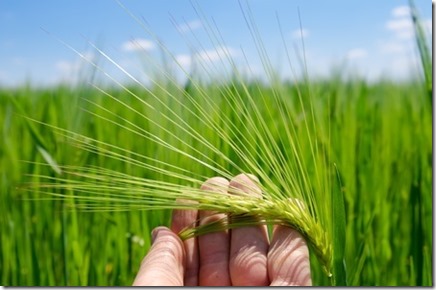
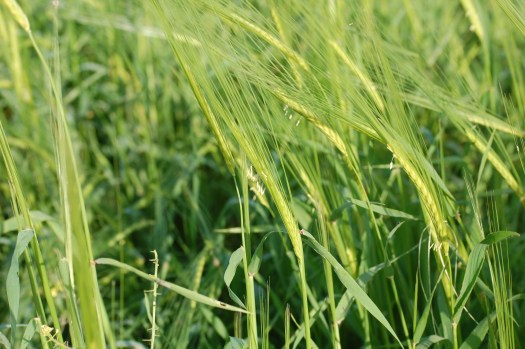
This image below shows an abbreviated example of the barley's growth stages to the aviv stage
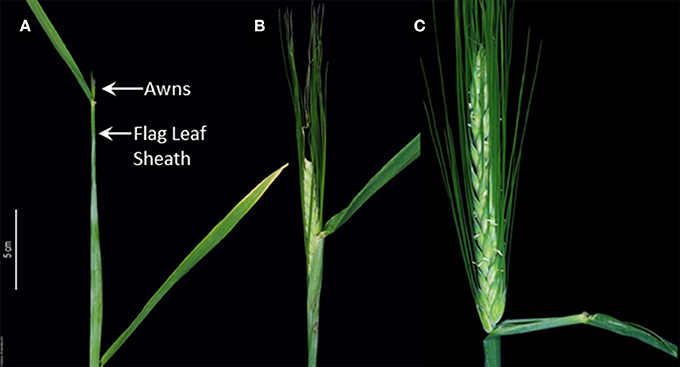
This image of the kernel development stages is taken from the University of Minnesota Extension website under the article "Spring barley growth and development guide"
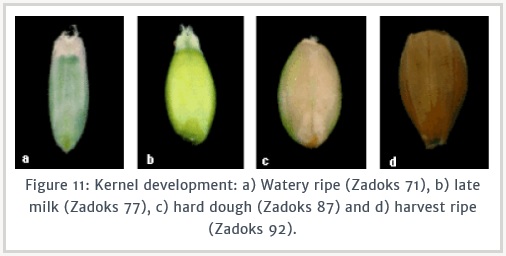
This is the text from this website article regarding the stages of the kernel:
Kernel development and maturity
"Once head emergence and pollination have occurred, kernels begin to develop (Figure 11). The length of the barley kernel establishes first, followed by its width. This helps explain why thin barley developed under stress conditions is usually as long as normal grain, but is narrower.
Figure 11 shows the physical changes as a kernel develops.
Watery ripe and milk stages
The first period of kernel development, designated the “watery ripe” and “milk” stages, lasts about 10 days.
Although the kernels don’t gain much weight during this phase, it’s extremely important because it determines the number of cells that will subsequently be used for storing starch. Kernels crushed in this stage initially yield a watery substance that later becomes milky.
Soft dough stage
The “soft dough” stage is characterized by kernels with a white semi-solid consistency. This period of rapid kernel growth and starch storage usually lasts about 10 days following the milk stage.
Hard dough stage
Finally, as the kernel approaches maturity and begins rapidly losing water, its consistency becomes more solid, termed “hard dough.” This is when the kernel also loses its green color (Figure 11)".
The late milk stage in figure 11b above would make the best case scenario that this is the aviv stage. You can read this article which in my humble but strong opinion gives the best explanation of the barley's stages from germination to maturity by clicking on the ling below to get to the webpage.
SPRING BARLEY GROWTH AND DEVELOPMENT GUIDE
Another insight regarding the word Aviv (byba) could be an elongated flourished name for "father" (ba). In other words, this month could be coined "the "Father of Biblical Months", because the father is the "head" of the family. As in this case, "the Biblical "Father Month"" is "the head of the family of months".
!!!hwhy Kl dbk
As I commented in the beginning of chapter twelve of this week's Torah portion, the month of Aviv/Nissan also starts the new Biblical year, contrary to the traditional seventh month of Ethanim/Tishri. You can go back to chapter twelve and read about it there.
Verses five through seven
5 And shall be, when hwhy shall bring you to the land of the Canaanites, and the Hittites, and the Amorites, and the Hivites, and the Jebusites which was sworn to your fathers to give to you a land flowing with fatness (milk) and thickness (honey) [(fatness and thickness, milk and honey)], and you shall serve ta-this Service in this renewed month. 6 Seven days you shall eat unleavened bread, and on the seventh shall be a Feast to hwhy. 7 Unleavened bread shall be eaten ta the seven days; and leavened bread shall not be seen by you, and sourdough shall not be seen by you in all of your border.
In verse six, they are to have a "public outdoor banquet" in the seveth day of the Feast of Unleavened Bread when they are in the land. This means that the seventh day is to feast your heart out with fellow believers together in public. This is so, because they are to have a Holy Convocation, as mentioned in chapter twelve.
Looking at each of the following Canaanite tribal names:
CANAANITE
The Hebrew word for Canaanite is "K'nah'ah-nee"- Kaph, Nun, Ayin, Nun, Yod (ynenk). It is from Strong's Concordance number 3669, and its definition
Patrial from H3667; a Kenaanite or inhabitant of Kenaan; by implication a pedlar (the Cananites standing for their neighbors the Ishmaelites, who conducted mercantile caravans): - Canaanite, merchant, trafficker.
from 3667 "k'nah'ahn" (nenk), and its definition
From H3665; humiliated; Kenaan, a son of Ham; also the country inhabited by him: - Canaan, merchant, traffick.
from 3665 "k'nah" (enk), and its definition
A primitive root; properly to bend the knee; hence to humiliate, vanquish: - bring down (low), into subjection, under, humble (self), subdue.
Canaanite means "a Subdued Pedlar".
HITTITE
The Hebrew word for Hittite is "Khee-tee"- Khet, Tav, Yod (ytx). It is from Strong's Concordance number 2850, and its definition
Patronymic from H2845; a Chittite, or descendant of Cheth: - Hittite, Hittites.
from 2845 "kheyth" (tx), and its definition
From H2865; terror; Cheth, an aboriginal Canaanite: - Heth.
from 2865 "khah-tath" (ttx), and its definition
A primitive root; properly to prostrate; hence to break down, either (literally) by violence, or (figuratively) by confusion and fear: - abolish, affright, be (make) afraid, amaze, beat down, discourage, (cause to) dismay, go down, scare, terrify.
AMORITE
The Hebrew for Amorite is "Eh-moh-ree"- Aleph, Mem, Resh, Yod (yrma). It is from Strong's Concordance number 567, and its definition
Probably a patronymic from an unused name derived from H559 in the sense of publicity, that is, prominence; thus a mountaineer; an Emorite, one of the Canaanitish tribes: - Amorite.
from 559 "ah-mahr" (rma), and its definition
A primitive root; to say (used with great latitude): - answer, appoint, avouch, bid, boast self, call, certify, challenge, charge, + (at the, give) command (ment), commune, consider, declare, demand, X desire, determine, X expressly, X indeed, X intend, name, X plainly, promise, publish, report, require, say, speak (against, of), X still, X suppose, talk, tell, term, X that is, X think, use [speech], utter, X verily, X yet.
Amorite means "a Publican Mountaineer Demander".
HIVITE
The Hebrew word for Hivite is "Khee-vee"- Khet, Vav, Yod (ywx). It is from Strong's Concordance number 2340, and its definition
Perhaps from H2333; a villager; a Chivvite, one of the aboriginal tribes of Palestine: - Hivite.
from 2333 "khah-vah" (hwx), and its definition
Properly the same as H2332 (lifegiving, that is, living place); by implication an encampment or village: - (small) town.
from 2332 "khah-vah" (hwx), and its definition
Causative from H2331; lifegiver; Chavvah (or Eve), the first woman: - Eve.
from 2331 "khah-vah" (hwx), and its definition
A primitive root; (compare H2324, H2421); properly to live; by implication (intensively) to declare or show: - show.
Hivite means "a Life Of A Showy Villager".
JEBUSITE
The Hebrew word for Jebusite is "Y'voo-see"- Yod, Bet, Vav, Samek, Yod (yowby). It is from Strong's Concordance number 2983, and its definition
Patrial from H2982; a Jebusite or inhabitant of Jebus: - Jebusite(-s).
from 2982 "y'voos" (owby), and its definition
From H947; trodden, that is, threshing place; Jebus, the aboriginal name of Jerusalem: - Jebus.
from 947 "boose" (owb), and its definition
A primitive root; to trample (literally or figuratively): - loath, tread (down, under [foot]), be polluted.
Jebusite means "a Loathing Treaded Pollutant".
Putting them in a list form based on their characteristics, this is what they display:
Canaanite: Subduer
Hittite: Terror
Amorite: Demander
Hivite: Showoff (of The Mouth)
Jebusite: Polluter (Profaner)
All of these tribes have negative traits attached to their identities. The Israelites were to destroy each of these Canaanite tribes bearing these negativie characteristics. We as believers in the Messiah today have to deal with these spiritual seven negative charateristics in our spiritual lives, and we need to destroy them with the help of Yeshua, through the Ruakh HaKodesh (the Holy Spirit).
!!!hwhy Kl bdk
Notice in verse five of this week's Torah portion passage that the word "you" is bold in pink. In the Hebrew text, the you is in the feminine gender. This tell us that Moses was speaking to People's "soul", in which the soul is feminine, which is noted in the Torah portion of Akharey Moth, in the book of Leviticus
Leviticus 17:11 for a soul of the flesh, she is in the blood:...
But also notice that in the Hebrew text it is in the "singular" pronoun. It means that Moses was speaking to the "soul of Israel".
!!!hwhy Kl bdk
Verses eight through ten
8 And you shall tell (declare, explain) to your son in that day, to say, In order of (Because) hwhy did this for me in my coming out from Egypt. 9 And shall be to you for a Sign upon your hand, and for a Memorial between your eyes, by that, the Teaching (Torah) of hwhy, she will be in your mouth: for on a Strong Hand hwhy brought you out from Egypt. 10 And you shall keep (guard, observe) ta-this Statute to her Appointed Time from days to days.
11 And shall be when hwhy shall bring you to the land of the Canaanites as the which was sworn to you and to your fathers, and gives her to you, 12 and you will go over every opener (burster forth, cleaver forth) of the womb for hwhy, and of every opener (burster forth, cleaver forth) ejected of an animal which belong to you; the males shall belong to hwhy. 13 And you shall redeem every opener (burster forth, cleaver forth) of a donkey on a lamb; and if you will not redeem, and you shall neck break him: and every firstborn of Adam in your midst, you shall redeem.
14 And shall be, when your son asks you at a later time, to say, What is this? And you shall say to him, On the Strong Hand, hwhy brought us out from Egypt, from the house of slaves: 15 And was, when Pharaoh was hardened to send us away, and hwhy killed every firstborn in the land of Egypt, from the firstborn of Adam, and unto the firstborn of animals: Upon thus, I sacrifice to hwhy all of the males (remembered ones) opening (bursting forth, cleaving forth) the womb; and I redeem every firstborn of my sons.
16 And shall be for a Sign upon your hand, and for Frontlets between your eyes: for on a Strong Hand, hwhy brought us out from Egypt.
Notice that Moses didn't say "If your son asks you...", but this was more of a command to the fathers to tell their sons why they are celebrating the Passover without being asked.
Notice that in verses five through eight of this week's Torah portion passage, Moses commanded the fathers to summarize the Passover as compared to the previous chapter of this week's Torah portion to their sons for future generations, because as I mentioned before, hwhy did this for all of us, including us as believers in Yeshua.
Notice also in verse nine of this week's Torah portion passage that the Torah, in this case the Passover account answered by the father, is female by saying "she" may be in your mouth.
This compares with this account, which is noted in the Torah portion of Va-Ethkhanan, in the book of Deuteronomy
Deuteronomy 6:4 Hear, Israel: hwhy our Elohim, hwhy is One: 5 and you shall love ta-hwhy, your Elohim, in all of your heart, and in all of your soul, and in all of your might. 6 And shall be these words which I command you upon your heart today: 7 and you shall sharpen (pierce, prick) them to your sons, and shall speak on them in your dwelling in your house, and in your walking in the way, and in your lying down, and in your rising. 8 And you shall bind them for a Sign upon your hand, and they shall be for Frontlets between your eyes, 9 and you shall write them upon the doorposts on your house, and on your gates.
The reason hwhy said this, because it is an act of our protection, including us in Messiah protecting us from the enemy, HaSatan. hwhy, through the apostle John, warned us how HaSatan is going to "countefeit" this week's Torah portion passage regarding this Passover account, which is noted in the book of Revelation
Revelation 13:11 And I beheld another beast coming up out of the earth; and he had two horns like a lamb, and he spake as a dragon. 12 And he exerciseth all the power of the first beast before him, and causeth the earth and them which dwell therein to worship the first beast, whose deadly wound was healed. 13 And he doeth great wonders, so that he maketh fire come down from the heavens on the earth in the sight of men, 14 And deceiveth them that dwell on the earth by the means of those miracles which he had power to do in the sight of the beast; saying to them that dwell on the earth, that they should make an image to the beast, which had the wound by a sword, and did live. 15 And he had power to give life unto the image of the beast, that the image of the beast should both speak, and cause that as many as would not worship the image of the beast should be killed. 16 And he causeth all, both small and great, rich and poor, free and bond, to receive a mark in their right hand, or in their foreheads: 17 And that no man might buy or sell, save he that had the mark, or the name of the beast, or the number of his name. 18 Here is wisdom. Let him that hath understanding count the number of the beast: for it is the number of a man; and his number is Six hundred threescore and six.
HaSatan "counterfeited" Yeshua as the "Counterfeit passover lamb", as noted in this Revelation passage.
In one aspect, this revelation has become more aware that the "World Wide Web" is abreviated as "www", but in the Hebrew those letters are "Vav, Vav, Vav". The number of the Hebrew letter Vav is the number "six", which replacing the Hebrew letter would be "Six, Six, Six".
Brad Scott of Wildbrach Ministry noted the Six, Six, Six issue in verse eighteen of this Revelation passage that in the Greek text where it says "six, six, six", it is three Greek letters: Khai, Xzee, and Stigma
xcj
Brad Scott of Wildbrach Ministry and Bill Cloud of Shoreshim Ministries noted that based on the Hebrew text, the two outer letters make up one word on the outside, while the letters in the middle make up the account of the inner meaning of that word. A good example of this is Pharaoh's name himself, spelled Peh, Resh, Ayin, Heh (herp). Brad Scott noted by taking the two outer Hebrew letters of Pharaoh's name and we get "Peh" (hp), which is translated as "mouth". Bill Cloud of Shoreshim Ministries and Brad Scott continues by taking the two Hebrew letters inside, and it makes the word "Ra" (er), and this word is commonly translated as "evil". By that, the the Hebrew name of Pharaoh is translated as "the Mouth of Evil". In this case of these three Greek letters, it will be a little different calculation. Brad Scott revealed that the two outer letters, Khai and Stigma (x-j) is the first and last letters for the Greek version of the name of Messiah which is "Christos" (xristoj). The Greek word below shows the two Greek outer letters colored in green
xristoj
Brad continues noting that the middle letter "Xzee" (c) is a pictorial representation of a "serpent standing upright". It is colored it in red below
c
Brad stated that what these three letters together are saying is that HaSatan, "the Serpent" will portray himself as "the False Messiah", also known as "the Anti-Messiah", or as Yeshua would most likely call "HaSatan", which is based on the Gospel of Matthew
Matthew 7:15 Beware of false prophets, which come to you in sheep's clothing, but inwardly they are ravening wolves.
This is the result of the three Greek letters together with the same colors
xcj
Looking at the two elements in this week's Torah portion passage which hwhy said to place them:
THE RIGHT HAND
Continuing, adding my two cents, hwhy Kl bdk, is that the mark of the beast is to be placed on the hand, which the "right hand" representing the "strong hand", like Yeshua sitting at the right hand of the Father, which Yeshua noted in the Gospel of Matthew
Matthew 26:64 Yeshua saith unto him, Thou hast said: nevertheless I say unto you, Hereafter shall ye see the Son of Man sitting on the Right Hand of Power, and coming in the clouds of the heavens.
HaSatan wants to imitate that to be "the Counterfeit Right Hand" or "the False Oath" for a person's right hand, to the world who does not believe in the Messiah during the Seven Years Tribulation by taking away their "strength" and submitting their strength to HaSatan.
BETWEEN THE EYES
Also, the Memorial between the eyes is where our "spiritual eye", also known as our "single eye" is located. When HaSatan wants the mark to optionally be placed on the forehead, HaSatan wants it to cover "the spiritual single eye", because that is where the spiritual single eye is located. This act will hinder one's spiritual single eye from discerning and seeing the spiritual truth regarding the true Messiah, and will cause one's hindered spiritual single eye to be in submission to HaSatan.
This mark of the beast will be used in financial transactions, whether at stores or online. Noting this by the prophet Daniel, which is noted in his book
Daniel 12:4 But thou, O Daniel, shut up the words, and seal the book, even to the time of the end: many shall run to and fro, and knowledge shall be increased.
The increase in knowledge is the "technology" that we have seen booming since the 1990s, in which the world has now become a dominiant "techno-society" instead of an agricultural society that had existed throughout most of human history.
Today, a computer has "touch screens". I would not be surprised that the next step will be that monitors will be able to be programmed to scan the mark of the beast on their forehead (between the eyes) or the right hand, to make a financial transaction without going through the process without typing all the person's card information and their personal information. Just show the mark, and it will be sufficient.
In December 2015, the banking card industry has just added a "chip" to their cards. It is a thin plated chip, which they say, is to provide more security, and people are now required to carry these bank cards. This is just "one step shy" to putting a "chip" on humans- most likely on the right hand or on the forehead. This technology has gone stratospherically through the roof, at a lightning speed rate. It will not be long before it is required on humans.
In 2016, a national news network did a story on national news in which a company has the ability to store health records in computer chips, and in New York City, some people have now implanted those chips with their health records "in their hand". To me, it proves to us that we are nearing the sunset to start the Daniel's last Seven Years of this age.
In July of 2017, a United States company called Three Sqare Market in Wisconsin became the first to offer an option for their employees to have the micro chip in their hands to purchase in the company's break room. The micro chip has already been applied in western European countries. It won't be long before it will be "mandatory" for everyone to have this "techno-mark" of the beast, which in my opinion could be a robotic image of the first beast.
In January 23, 2018 Amazon Go of Amazon has put out a grocery store using "cashless registers" in Seattle, Washington, where there are no grocery lines, registers and "human cashiers". Just one step closer to a "cashless society" and for the Anti-Messiah to come into play.
One thing which I give hwhy the praise and the glory, hwhy revealed this to me which is based in the Torah portion of B'reyshith, in the book of Genesis
Genesis 1:26 And Elohim said, We will make Adam in Our Image according to Our Likeness, and shall rule among the fishes of the sea, and among the birds of the Heavens, and among the animals, and among all of the Earth, and among all creepers that creep upon the Earth. 27 And Elohim created ta-the Adam in His Image, created him in the Image of Elohim, created them male (remembered one) and female.... 2:7 And hwhy Elohim formed (fashioned, molded) ta-the Adam of dust from the Ground, and blew (puffed, inflate) in his nostrils the Breath (Blast) of Life, and became the Adam of a living soul.
In other words, HaSatan would be "imitating" what hwhy did for Adam by doing the similar thing in the end times to the second beast, which could be to bring life to a "robot", or HaSatan could imitate the same method by making a human being out of dirt and putting life into it.
During the Daniel's last seven years during the Tribulation period, there will be 144,000 people who will bear the seal of hwhy, which is noted by the apostle John in the book of Revelation
Revelation 7:2 And I saw another angel ascending from the east, having the seal of the living Elohim: and he cried with a loud voice to the four angels, to whom it was given to hurt the earth and the sea, 3 Saying, Hurt not the earth, neither the sea, nor the trees, till we have sealed the servants of our Elohim in their foreheads. 4 And I heard the number of them which were sealed: and there were sealed an hundred and forty and four thousand of all the tribes of the Children of Israel.
In my humble opinion, the 144,000 marked during the seven years are not the current believers alive on the earth, because there are more than 144,000 believers who are currently alive on the earth.
This is what happens to those who take on the mark of the beast during Daniel's last seven years of this age during the Tribulation, which is noted in the apostle John's book of Revelation
Revelation 14:9 And the third angel followed them, saying with a loud voice, If any man worships the beast and his image, and receive his mark in his forehead, or in his hand, 10 The same shall drink of the Wine of the Wrath of hwhy, which is poured out without mixture into the Cup of His Indignation; and he shall be tormented with fire and brimstone in the presence of the Holy angels, and in the presence of the Lamb:
Revelation 9:1 And the fifth angel sounded, and I saw a star fall from the heavens unto the earth: and to him was given the key of the bottomless pit. 2 And he opened the bottomless pit; and there arose a smoke out of the pit, as the smoke of a great furnace; and the sun and the air were darkened by reason of the smoke of the pit. 3 And there came out of the smoke locusts upon the earth: and unto them was given power, as the scorpions of the earth have power. 4 And it was commanded them that they should not hurt the grass of the earth, neither any green thing, neither any tree; but only those men which have not the Seal of hwhy in their foreheads. 5 And to them it was given that they should not kill them, but that they should be tormented five months: and their torment was as the torment of a scorpion, when he striketh a man. 6 And in those days shall men seek death, and shall not find it; and shall desire to die, and death shall flee from them. 7 And the shapes of the locusts were like unto horses prepared unto battle; and on their heads were as it were crowns like gold, and their faces were as the faces of men. 8 And they had hair as the hair of women, and their teeth were as the teeth of lions. 9 And they had breastplates, as it were breastplates of iron; and the sound of their wings was as the sound of chariots of many horses running to battle. 10 And they had tails like unto scorpions, and there were stings in their tails: and their power was to hurt men five months.
Pray that those who are left on the earth, especially family members, who are smart enough to not take this mark when this period begins.
In verse ten of this week's Torah portion passage, it says "her" Appointed Times. This shows us that any Appointed Time is "female", whether it is the High Holy Days, or hwhy's Personal Calling for us as believers in Yeshua, to do something, or just to talk to Him about anything, or just to talk to Him as our Heavenly Father, and just chit chat, etc.
Verses eleven through thirteen
11 And shall be when hwhy shall bring you to the land of the Canaanites as the which was sworn to you and to your fathers, and gives her to you, 12 and you will go over every opener (burster forth, cleaver forth) of the womb for hwhy, and of every opener (burster forth, cleaver forth) ejected of an animal which belong to you; the males shall belong to hwhy. 13 And you shall redeem every opener (burster forth, cleaver forth) of a donkey on a lamb; and if you will not redeem, and you shall neck break him: and every firstborn of Adam in your midst, you shall redeem.
Moses picked up where he left off in verses one and two of this week's Torah portion chapter regarding the firstborn
The point is that hwhy destroyed the firstborn of the Egyptian peoples as well as the animals. When Israel sacrificed the firstborn of an animal, they are to be to given to hwhy. This act was also to remind Israel this Exodus Passover account when hwhy slayed Egypt's firstborn humans and animals. These are symbolic of dedicating "the Firstborn", who is Yeshua, our Messiah.
Indirectly related, the apostle Paul reveals the Firstborn of all, which he noted in his letters to the assemblies in Rome and Colossia
Romans 8:28 And we know that all things work together for good to them that love hwhy, to them who are the called according to His Purpose. 29 For whom He did foreknow, He also did predestinate to be conformed to the image of His Son, that He might be the Firstborn among many brethren.
Colossians 1:9 For this cause we also, since the day we heard it, do not cease to pray for you, and to desire that ye might be filled with the knowledge of His Will in all wisdom and spiritual understanding; 10 That ye might walk worthy of the Lord hwhy unto all pleasing, being fruitful in every good work, and increasing in the Knowledge of hwhy; 11 Strengthened with all might, according to His Glorious Power, unto all patience and longsuffering with joyfulness; 12 Giving thanks unto the Father, which hath made us meet to be partakers of the inheritance of the saints in Light: 13 Who hath delivered us from the power of darkness, and hath translated us into the Kingdom of His Dear Son: 14 In whom we have redemption through His Blood, even the forgiveness of sins: 15 Who is the image of the invisible Elohim, the Firstborn of every creature: 16 For by Him were all things created, that are in the heavens, and that are in earth, visible and invisible, whether they be thrones, or dominions, or principalities, or powers: all things were created by Him, and for Him: 17 And He is before all things, and by Him all things consist. 18 And He is the Head of the Body, the Assembly: who is the Beginning, the Firstborn from the Dead; that in all things He might have the preeminence.
Today, we in Messiah can redeem our firstborns by dedicating them to our Heavenly Father in the name of Yeshua.
Notice in verse eleven of this week's Torah portion passage that the word "you" is bold in pink. In the Hebrew text, the you is in the feminine gender. This tell us that Moses was speaking to People's "soul", in which the soul is feminine, which is noted in the Torah portion of Akharey Moth, in the book of Leviticus
Leviticus 17:11 for a soul of the flesh, she is in the blood:...
But also notice that in the Hebrew text it is in the "singular" pronoun. It means that Moses was speaking to the "soul of Israel".
!!!hwhy Kl bdk
Verses fourteen through sixteen
14 And shall be, when your son asks you at a later time, to say, What is this? And you shall say to him, On the Strong Hand, hwhy brought us out from Egypt, from the house of slaves: 15 And was, when Pharaoh was hardened to send us away, and hwhy killed every firstborn in the land of Egypt, from the firstborn of Adam, and unto the firstborn of animals: Upon thus, I sacrifice to hwhy all of the males (remembered ones) opening (bursting forth, cleaving forth) the womb; and I redeem every firstborn of my sons. 16 And shall be for a Sign upon your hand, and for Frontlets between your eyes: for on a Strong Hand, hwhy brought us out from Egypt.
This is the second issue that Moses brought up for the fathers to answer for their sons' "Second Question" as compared to the "First Question" in the previous chapter of this week's Torah portion
Exodus 12:25 And shall be, when you come to the land which hwhy will give to you as the which was spoken, and you shall keep (guard, observe) ta-this Service. 26 And shall be, when your sons, they shall say to you, What is this service to you? 27 And you shall say, He is the Passover Sacrifice to hwhy which passed over the houses of the Sons of Israel in Egypt, in His goreing (stumbling) ta-Egypt, and delivered (rescued) ta-our houses. And the People bowed, and they worshipped.
When the father dedicates the firstborn, whether a human or an animal, he can answer his son to this question in which it goes back to the Tenth Plague where hwhy killed the firstborn of the Egyptian humans and animals, and what the father would be doing would be to give thanks to hwhy by offering their first born for a Memorial.
Hebraic Roots/Messianic teachers agree that when it says that hwhy delievered "us" out of Egypt, He did so, literally and spiritually as well as us in Yeshua. We were there in Egypt and were symbolically there by being in the Egyptian world, and it is to be a Remembrance for all of us.
I have seen programs in the past where hosts say to the point "Well this is 2015. Times have changed'. But as for Yeshua it is not, which is noted the apostle Paul's book of Hebrews
Hebrews 13:8 Yeshua the Messiah is the same yesterday, and to day, and for ever.
The Word stays the same, and His Word, or His "Yeshua, the Living Word", has not changed, is not changing, and will never change.
Ending, there is a chart by Mark Biltz of El Shaddai Ministries in which he notes his version of the Ten Plagues to the Egyptian deities. He relates the Triune Elohim to these plagues. Not all of the deities Mark Biltz relates to in each of the plagues is the same as mine, but it is quite interesting. Just right click on the link below and choose "Save as".
- - - - - - - - - - - - - - - - - - - - - - - - - - - - - - - - - - - - - - - - - - - - - - - - - - - - - - - - - - - - - - - - - - - - - - - - - - - - - - - - - - - - -
DISCLAIMER
The views and opinions expressed are solely those of the personnel and do not necessarily reflect the view or opinions of The Aleph-Tav Project.
- - - - - - - - - - - - - - - - - - - - - - - - - - - - - - - - - - - - - - - - - - - - - - - - - - - - - - - - - - - - - - - - - - - - - - - - - - - - - - - - - - - - -
MARK BILTZ
Mark Biltz's Ten Plagues Chart
That ends this week's Torah portion commentary.
Any questions or comments can be written to
the.aleph-tav.project@msn.com
SHABBATH SHALOM

_______________________________________________________________________________________________________________________________________________
_______________________________________________________________________________________________________________________________________________
Copyright 2014 The Aleph-Tav Project - NVU's Website Design Software by The Premier Group